Active/Common Signals
From Signal Identification Wiki
Description[edit]
These are signals that have are active or have been active within the last 6-12 months. You have a very good chance of finding any one of these out on the airwaves.
Click the name of a signal to see more detailed information, possible decoding, and additional sound and waterfall samples
| Inactive (No longer in use) |
Active (Currently in active use) |
Status Unknown or Intermittent |
| Signal Name | Description | Frequency | Mode | Modulation | Bandwidth | Location | Sample Audio | Waterfall image |
|---|---|---|---|---|---|---|---|---|
| 'Ghadir' OTH Radar | 'Ghadir', is an Iranian over the horizon radar, part of Iran's Sepehr Phased Radar System. | 28 MHzMegaHertz (MHz) 10^6 Hz — 29.7 MHzMegaHertz (MHz) 10^6 Hz | AMAmplitude Modulation | Pulse | 60 kHzKiloHertz (kHz) 10^3 Hz — 1 MHzMegaHertz (MHz) 10^6 Hz | Iran | 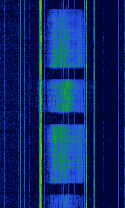 |
|
| 'OTH-SW' OTH Radar | OTHOver The Horizon (very long range)-SW is a Chinese over-the-horizon radar. It is known to operate with pulse repetition frequencies of 43 HzHertz (Hz), unit of frequency, defined as one cycle per second (1 Hz). and 86 HzHertz (Hz), unit of frequency, defined as one cycle per second (1 Hz).. | 6 MHzMegaHertz (MHz) 10^6 Hz — 30 MHzMegaHertz (MHz) 10^6 Hz | USBUpper Side Band Modulation (Radio, referring to reception and modulation mode)Universal Serial Bus (Computer, referring to USB Ports and cables) | FMCW | 40 kHzKiloHertz (kHz) 10^3 Hz — 80 kHzKiloHertz (kHz) 10^3 Hz | China | 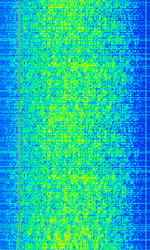 |
|
| 17067bps FSK | Unknown military-use signal reminiscent of SECURENET CVSD voice. | 30 MHzMegaHertz (MHz) 10^6 Hz — 88 MHzMegaHertz (MHz) 10^6 Hz | FMFrequency Modulation | FSKFrequency-Shift Keying | 25 kHzKiloHertz (kHz) 10^3 Hz | Worldwide |  |
|
| 2006 Kia Grand Carnival Keyfob | Original remote of KIA Carnival (2006). | 433.92 MHzMegaHertz (MHz) 10^6 Hz | NFMNarrowband Frequency Modulation | FSKFrequency-Shift Keying | 100 kHzKiloHertz (kHz) 10^3 Hz | Worldwide |  |
|
| 29B6 'Kontayner' OTH Radar | 29B6, nicknamed 'Контейнер' (Kontayner), is a Russian over the horizon radar. It is currently very active in Europe. The radar uses 150 antenna masts with data transmission systems, transmitters and receivers, a power station, and control buildings. It can detect high-altitude and low-altitude aircraft and missiles at very long ranges. | 6.1 MHzMegaHertz (MHz) 10^6 Hz — 32 MHzMegaHertz (MHz) 10^6 Hz | USBUpper Side Band Modulation (Radio, referring to reception and modulation mode)Universal Serial Bus (Computer, referring to USB Ports and cables) | FMOP, Pulsed | 3.5 kHzKiloHertz (kHz) 10^3 Hz — 28 kHzKiloHertz (kHz) 10^3 Hz | Russia | 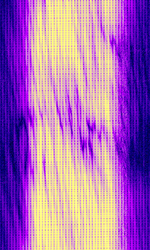 |
|
| 2G (GSM) Global System for Mobile Communications | GSM (Global System for Mobile Communications) is a standard developed by ETSIEuropean Telecommunications Standards Institute. An independent, not-for-profit, standardization organization in the telecommunications industry in Europe, developing global telecommunications standards. to describe the protocols for second-generation (2G) digital cellular networks used by mobile phones. As of 2014, it has become the default global standard for mobile communications. | 850 MHzMegaHertz (MHz) 10^6 Hz — 1,900 MHzMegaHertz (MHz) 10^6 Hz | RAW, AMAmplitude Modulation, FMFrequency Modulation | GMSKGaussian Minimum-Shift Keying | 200 kHzKiloHertz (kHz) 10^3 Hz | Worldwide | 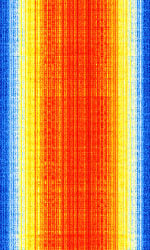 |
|
| 3G WCDMA | WCDMA, known primarily as 3G mobile, is a family of 3G data protocols used to send voice, text and signaling data to smart phones and other wireless devices. | 824 MHzMegaHertz (MHz) 10^6 Hz — 2,100 MHzMegaHertz (MHz) 10^6 Hz | RAW, AMAmplitude Modulation | QPSKQuadrature Phase-Shift Keying (2 bits per symbol), BPSKBinary Phase-Shift Keying (1 bit per symbol) | 4.2 MHzMegaHertz (MHz) 10^6 Hz | 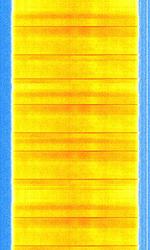 |
||
| 4G (LTE) Long Term Evolution Uplink | Acquired via telecommunications carrier hardware during interference investigation of an Australian cellular network. | 700 MHzMegaHertz (MHz) 10^6 Hz — 3,500 MHzMegaHertz (MHz) 10^6 Hz | SC-FDMAFrequency Division Multiple Access | QPSKQuadrature Phase-Shift Keying (2 bits per symbol), 16QAM, 64QAM | 1.4 MHzMegaHertz (MHz) 10^6 Hz — 20 MHzMegaHertz (MHz) 10^6 Hz | Worldwide | 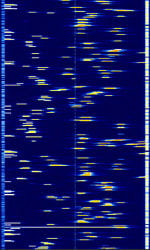 |
|
| 4G LTE Network | Long Term Evolution Network. Also known as 4G LTE Data and Evolved Universal Terrestrial Radio Access (E-UTRA). Data service for wireless consumer devices. | 450 MHzMegaHertz (MHz) 10^6 Hz — 3,500 MHzMegaHertz (MHz) 10^6 Hz | OFDMOrthogonal Frequency-Division Multiplexing | 16QAM, 64QAM, 256QAM, QPSKQuadrature Phase-Shift Keying (2 bits per symbol) | 1.4 MHzMegaHertz (MHz) 10^6 Hz — 20 MHzMegaHertz (MHz) 10^6 Hz | Worldwide | 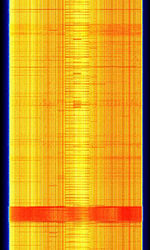 |
|
| 5G 'New Radio' Cellular Radio - Downlink | 5G cellular, also known by 3GPP '5G' NR (new radio), etc. is a newly released cellular standard that allows for backwards compatibility with 4G LTE, and will allow for several gigabits of connection speeds, (up to 10-100Gb) per second. This is the 600 MHzMegaHertz (MHz) 10^6 Hz downlink band for the new standard. | 600 MHzMegaHertz (MHz) 10^6 Hz — 50,000 MHzMegaHertz (MHz) 10^6 Hz | CP-OFDMOrthogonal Frequency-Division Multiplexing | QPSKQuadrature Phase-Shift Keying (2 bits per symbol), 16QAM, 64QAM, 256QAM | 5 MHzMegaHertz (MHz) 10^6 Hz — 400 MHzMegaHertz (MHz) 10^6 Hz | Worldwide | 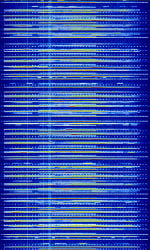 |
|
| 5G (NR) New Radio Uplink | 5G cellular, also known by 3GPP '5G' NR (new radio), etc. is a newly released cellular standard that allows for backwards compatibility with 4G LTE, and will allow for several gigabits of connection speeds, (up to 10-100Gb) per second. This is the 600 MHzMegaHertz (MHz) 10^6 Hz downlink band for the new standard. | 600 MHzMegaHertz (MHz) 10^6 Hz — 50,000 MHzMegaHertz (MHz) 10^6 Hz | CP-OFDMOrthogonal Frequency-Division Multiplexing | QPSKQuadrature Phase-Shift Keying (2 bits per symbol), 16QAM, 64QAM, 256QAM | 5 MHzMegaHertz (MHz) 10^6 Hz — 400 MHzMegaHertz (MHz) 10^6 Hz | Worldwide | 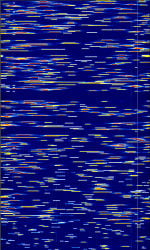 |
|
| 5G Broadcast (MBMS) Multimedia Broadcast / Multicast Service | A technology originally introduced in LTE (eMBMS) that enables efficient transmission of the same content to a large number of users at once — that is, broadcast or multicast instead of individual unicast. In 5G, its evolution is used for the so‑called LTE‑based 5G Terrestrial Broadcast. | 470 MHzMegaHertz (MHz) 10^6 Hz — 694 MHzMegaHertz (MHz) 10^6 Hz | OFDMOrthogonal Frequency-Division Multiplexing | QPSKQuadrature Phase-Shift Keying (2 bits per symbol), 16QAM, 64QAM | 5 MHzMegaHertz (MHz) 10^6 Hz — 10 MHzMegaHertz (MHz) 10^6 Hz | Europe | 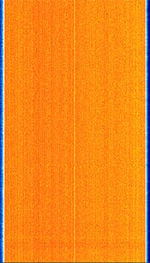 |
|
| 77Ya6 'Voronezh' radar | Voronezh (Воронеж) is a Russian radar family capable of aircraft and ballistic missile monitoring. | 150 MHzMegaHertz (MHz) 10^6 Hz — 440 MHzMegaHertz (MHz) 10^6 Hz | AMAmplitude Modulation | FMCW | 2 MHzMegaHertz (MHz) 10^6 Hz | Russia |  |
|
| 802.11ah | HaLow (802.11ah) is a wireless technology standard for exchanging data between devices over medium distances. Released by the Wi-Fi Alliance in 2016, it was initially developed as a competitive Internet of Things standard. | 750 MHzMegaHertz (MHz) 10^6 Hz — 928 MHzMegaHertz (MHz) 10^6 Hz | ODFM, BPSKBinary Phase-Shift Keying (1 bit per symbol), QPSKQuadrature Phase-Shift Keying (2 bits per symbol), QAMQuadrature Amplitude Modulation | 1 MHzMegaHertz (MHz) 10^6 Hz | Worldwide | — |  |
|
| 802.11ax | IEEE 802.11ax-2021, also known as Wi-Fi 6, is a WLAN standard improves upon previous Wi-Fi standards by utilizing 1024QAM modulation, larger channel bandwidths, and improved efficiency. | 2,412 MHzMegaHertz (MHz) 10^6 Hz — 7,125 MHzMegaHertz (MHz) 10^6 Hz | AMAmplitude Modulation | OFDMA, BPSKBinary Phase-Shift Keying (1 bit per symbol), QPSKQuadrature Phase-Shift Keying (2 bits per symbol), 16QAM, 64QAM, 256QAM, 1024QAM | 20 MHzMegaHertz (MHz) 10^6 Hz — 160 MHzMegaHertz (MHz) 10^6 Hz | Worldwide |  |
|
| 802.11n | IEEE 802.11n-2009, commonly shortened to 802.11n, is a wireless-networking standard that uses multiple antennas to increase data rates. The Wi-Fi Alliance has also retroactively labeled the technology for the standard as Wi-Fi 4. | 2,412 MHzMegaHertz (MHz) 10^6 Hz — 5,865 MHzMegaHertz (MHz) 10^6 Hz | DSBDual Side Band Modulation, RAW | BPSKBinary Phase-Shift Keying (1 bit per symbol), QPSKQuadrature Phase-Shift Keying (2 bits per symbol), 16QAM, 64QAM, 256QAM (Turbo QAMQuadrature Amplitude Modulation) | 20 MHzMegaHertz (MHz) 10^6 Hz — 40 MHzMegaHertz (MHz) 10^6 Hz | Worldwide | 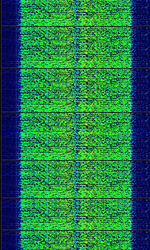 |
|
| 8PSK | 8PSK8-Phase Phase-Shift Keying (3 bits per symbol) modulation is a way to encode data using eight phase angles. Each symbol can encode three bits of data. It can achieve higher data rates than other phase modulation schemes, but it also requires a higher signal-to-noise ratio and is more prone to errors. | 3 MHzMegaHertz (MHz) 10^6 Hz — 3,000 MHzMegaHertz (MHz) 10^6 Hz | USBUpper Side Band Modulation (Radio, referring to reception and modulation mode)Universal Serial Bus (Computer, referring to USB Ports and cables),FMFrequency Modulation | 8PSK8-Phase Phase-Shift Keying (3 bits per symbol) | 125 HzHertz (Hz), unit of frequency, defined as one cycle per second (1 Hz). — 1.2 kHzKiloHertz (kHz) 10^3 Hz | Worldwide | 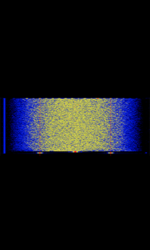 |
|
| AFSK Paging Link | A variant of POCSAG/FLEX with audio FSKFrequency-Shift Keying modulation based off of the bell 202 tones. Typically found as uplinks/downlinks to pager network transmitters. | 72 MHzMegaHertz (MHz) 10^6 Hz — 928 MHzMegaHertz (MHz) 10^6 Hz | NFMNarrowband Frequency Modulation | AFSKAudio Frequency-Shift Keying | 9 kHzKiloHertz (kHz) 10^3 Hz | Worldwide | 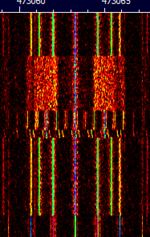 |
|
| AIST 2D | Aist 2D is a Russian microsatellite developed and designed by a group of Samara Aerospace University students, postgraduates, and scientists in cooperation with TsSKB-Progress. | 435.315 MHzMegaHertz (MHz) 10^6 Hz | NFMNarrowband Frequency Modulation | PM/PCM | 10 kHzKiloHertz (kHz) 10^3 Hz | Worldwide | 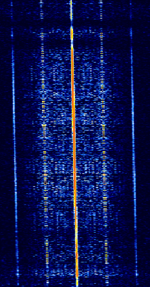 |
|
| ALE-400 | ALEAutomatic Link Establishment-400 is an amateur version of the 2G ALEAutomatic Link Establishment standard. It is adapted to the demands of amateur radio emergency traffic handling. | 1.806 MHzMegaHertz (MHz) 10^6 Hz — 144.163 MHzMegaHertz (MHz) 10^6 Hz | USBUpper Side Band Modulation (Radio, referring to reception and modulation mode)Universal Serial Bus (Computer, referring to USB Ports and cables) | MFSKMultiple Frequency Shift-Keying | 400 HzHertz (Hz), unit of frequency, defined as one cycle per second (1 Hz). | Worldwide | 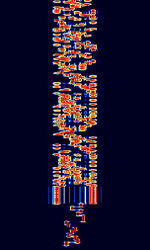 |
|
| ARGOS A-DCS | Some polar weather satellites from the METOP and POES series carry ARGOS A-DCS (Advanced Data Collection System), which is a system to collect data from sondes and other remote land or air-based instrumentation. | 465.99 MHzMegaHertz (MHz) 10^6 Hz | USBUpper Side Band Modulation (Radio, referring to reception and modulation mode)Universal Serial Bus (Computer, referring to USB Ports and cables) | PSKPhase-Shift Keying | 54 kHzKiloHertz (kHz) 10^3 Hz | Worldwide | 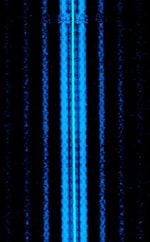 |
|
| ARQ-E(E3) | ARQAutomatic Repeat reQuestAutomatic Repeat Query-E, also known as ARQAutomatic Repeat reQuestAutomatic Repeat Query-1000 Duplex or ARQAutomatic Repeat reQuestAutomatic Repeat Query-1000D, is a synchronous full-duplex ARQAutomatic Repeat reQuestAutomatic Repeat Query system. ARQAutomatic Repeat reQuestAutomatic Repeat Query-E3 is a variant that uses a different alphabet encoding. Mainly used by French Military Forces. Stations commonly idled for hours on end. | 3 MHzMegaHertz (MHz) 10^6 Hz — 30 MHzMegaHertz (MHz) 10^6 Hz | USBUpper Side Band Modulation (Radio, referring to reception and modulation mode)Universal Serial Bus (Computer, referring to USB Ports and cables) | FSKFrequency-Shift Keying | 85 HzHertz (Hz), unit of frequency, defined as one cycle per second (1 Hz). — 850 HzHertz (Hz), unit of frequency, defined as one cycle per second (1 Hz). | Worldwide | 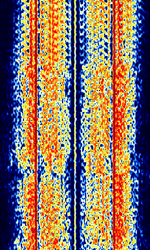 |
|
| ASCII | ASCII (also known as ITA5 or IRA) is an amateur radio telegraphy signal using the ITA-5 alphabet. | 3 MHzMegaHertz (MHz) 10^6 Hz — 450 MHzMegaHertz (MHz) 10^6 Hz | NFMNarrowband Frequency Modulation, USBUpper Side Band Modulation (Radio, referring to reception and modulation mode)Universal Serial Bus (Computer, referring to USB Ports and cables) | FSKFrequency-Shift Keying | 300 HzHertz (Hz), unit of frequency, defined as one cycle per second (1 Hz). | Worldwide | 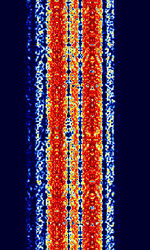 |
|
| ATSC 3.0 Broadcast | The Advanced Television Systems Committee (ATSC) 3.0 standard (marketed as NextGen TV) is a revised set of video broadcasting specifications that outlines improvements to spectrum efficiency. | RAW | OFDMOrthogonal Frequency-Division Multiplexing, QAMQuadrature Amplitude Modulation | 6 MHzMegaHertz (MHz) 10^6 Hz | United States, South Korea, Jamaica | — | 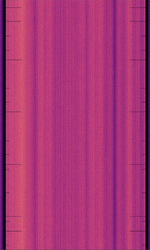 |
|
| ATSC Broadcast | Advanced Television Systems Committee Television. 8VSB Modulation | 54 MHzMegaHertz (MHz) 10^6 Hz — 700 MHzMegaHertz (MHz) 10^6 Hz | RAW | 8VSB | 6 MHzMegaHertz (MHz) 10^6 Hz | United States | — | 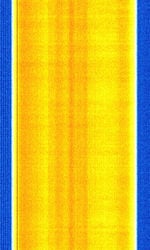 |
| Aircraft Communications Addressing and Reporting System (ACARS) | ACARS is a digital datalink system for the transmission of short messages between aircraft and ground stations via airband radio or satellite. | 129 MHzMegaHertz (MHz) 10^6 Hz — 137 MHzMegaHertz (MHz) 10^6 Hz | AMAmplitude Modulation | MSKMinimum-Shift Keying (When Shift/Bd = 0.5. It is impossible to get this ratio to be lower than 0.5, hence it is called the 'Minimum' shift.) | 5 kHzKiloHertz (kHz) 10^3 Hz | Worldwide | 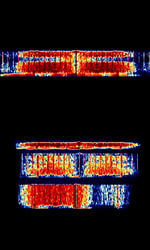 |
|
| Altai Radiotelephone | The initial generation of cellular mobile radiotelecommunications, similar to trunked radio. -- (Audio Sample is *loud*) -- | 300 MHzMegaHertz (MHz) 10^6 Hz — 342 MHzMegaHertz (MHz) 10^6 Hz | NFMNarrowband Frequency Modulation | FMFrequency Modulation, FSKFrequency-Shift Keying | 10 kHzKiloHertz (kHz) 10^3 Hz | Worldwide | 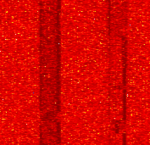 |
|
| Amplitude Modulation (AM) | Long range commercial broadcast and international radio. Also used for aviation communications. | 153 kHzKiloHertz (kHz) 10^3 Hz — 137 MHzMegaHertz (MHz) 10^6 Hz | AMAmplitude Modulation | AMAmplitude Modulation | 10 kHzKiloHertz (kHz) 10^3 Hz | Worldwide | 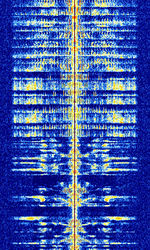 |
|
| Aprizesat | Data downlink from Aprizesat microsatellites. Aprizesat constellation consists of 12 Active satellites, These provide a worldwide M2M asset tracking service and relay AIS packets. | 400.5 MHzMegaHertz (MHz) 10^6 Hz — 400.65 MHzMegaHertz (MHz) 10^6 Hz | USBUpper Side Band Modulation (Radio, referring to reception and modulation mode)Universal Serial Bus (Computer, referring to USB Ports and cables) | GMSKGaussian Minimum-Shift Keying | 5 kHzKiloHertz (kHz) 10^3 Hz | Worldwide | 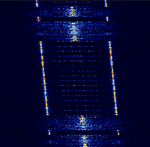 |
|
| Aqua Direct Broadcast (DB) | A direct broadcast sent in the X band by the NASA Aqua satellite for reception by end users. | 8,160 MHzMegaHertz (MHz) 10^6 Hz | RAW | OQPSK | 15 MHzMegaHertz (MHz) 10^6 Hz | Worldwide | — | 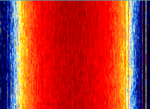 |
| Autocab | This is an example of the Autocab Media Data Terminals used by cab companies all over the world. | 163.375 MHzMegaHertz (MHz) 10^6 Hz | NFMNarrowband Frequency Modulation | PSKPhase-Shift Keying | 12.5 kHzKiloHertz (kHz) 10^3 Hz | United Kingdom | 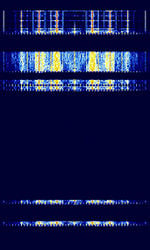 |
|
| Automated Train Control System (ATCS) | Automated Train Control System (ATCS), specifically ATCS Spec. 200, is a standardized communication system for railroads designed to ensure safety by monitoring locations of trains and locomotives, providing analysis and reporting, and automation of track warrants and similar orders. | 896.888 MHzMegaHertz (MHz) 10^6 Hz — 936.988 MHzMegaHertz (MHz) 10^6 Hz | NFMNarrowband Frequency Modulation | FSKFrequency-Shift Keying | 12.5 kHzKiloHertz (kHz) 10^3 Hz | United States | 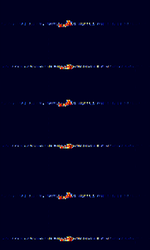 |
|
| Automatic Dependent Surveillance-Broadcast (ADS-B) | ADS-B is used by aircraft as an alternative to secondary radar. It broadcasts GPS position (latitude, longitude), pressure altitude, callsign, as well as track and ground speed. | 978 MHzMegaHertz (MHz) 10^6 Hz — 1,090 MHzMegaHertz (MHz) 10^6 Hz | RAW | PPMPulse Position Modulation | 2 MHzMegaHertz (MHz) 10^6 Hz | Worldwide | 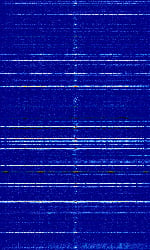 |
|
| Automatic Identification System (AIS) | Automatic Identification System (AIS) is used by ships to broadcast position and vessel information. | 161.975 MHzMegaHertz (MHz) 10^6 Hz — 162.025 MHzMegaHertz (MHz) 10^6 Hz | NFMNarrowband Frequency Modulation | GMSKGaussian Minimum-Shift Keying | 25 kHzKiloHertz (kHz) 10^3 Hz | Worldwide | 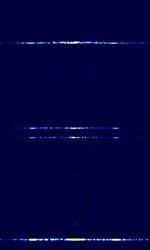 |
|
| Automatic Link Establishment (2G ALE) | Automatic Link Establishment, 2G ALEAutomatic Link Establishment (Official designation MIL-STD-188-141A and/or MIL-STD-188-141B (Appendix A)) is the current standardized method of establishing connections between radio operators. Also known as FED-STD 1045, FED-STD 1049, and STANAGNATO Standardization Agreement (STANAG), defines processes, procedures, terms, and conditions for common military or technical procedures or equipment between the member countries of the North Atlantic Treaty Organization (NATO). 5066. | 3.068 MHzMegaHertz (MHz) 10^6 Hz — 28.313 MHzMegaHertz (MHz) 10^6 Hz | USBUpper Side Band Modulation (Radio, referring to reception and modulation mode)Universal Serial Bus (Computer, referring to USB Ports and cables) | MFSKMultiple Frequency Shift-Keying | 2 kHzKiloHertz (kHz) 10^3 Hz | Worldwide | 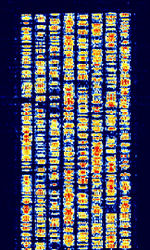 |
|
| Automatic Link Establishment (3G ALE ARCS) | 3G ALEAutomatic Link Establishment (ARCSAutomatic Radio Control System) is the next generation of ALEAutomatic Link Establishment (Designated by MIL-STD-188-141B (Appendix C)). Also known as STANAGNATO Standardization Agreement (STANAG), defines processes, procedures, terms, and conditions for common military or technical procedures or equipment between the member countries of the North Atlantic Treaty Organization (NATO). 4538, although MIL 188-141 does not provide Fast LSU. | 3 MHzMegaHertz (MHz) 10^6 Hz — 30 MHzMegaHertz (MHz) 10^6 Hz | USBUpper Side Band Modulation (Radio, referring to reception and modulation mode)Universal Serial Bus (Computer, referring to USB Ports and cables) | PSKPhase-Shift Keying | 3 kHzKiloHertz (kHz) 10^3 Hz | Worldwide | 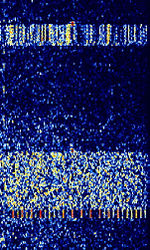 |
|
| Automatic Packet Reporting System (APRS) | Packet system for real time data communications. Used by hams for location reporting, weather stations etc. | 144.39 MHzMegaHertz (MHz) 10^6 Hz — 432.5 MHzMegaHertz (MHz) 10^6 Hz | NFMNarrowband Frequency Modulation | AFSKAudio Frequency-Shift Keying | 12.5 kHzKiloHertz (kHz) 10^3 Hz | Worldwide | 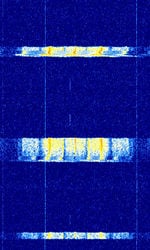 |
|
| Automatic Transmitter Identification System (ATIS) | ATIS systems are identification tags used by inland commercial waterway traffic on rivers in Europe. The FSKFrequency-Shift Keying burst is appended at the end of every voice transmission by the vessel operator. | 30 MHzMegaHertz (MHz) 10^6 Hz — 800 MHzMegaHertz (MHz) 10^6 Hz | NFMNarrowband Frequency Modulation | FSKFrequency-Shift Keying | 12 kHzKiloHertz (kHz) 10^3 Hz | Europe | 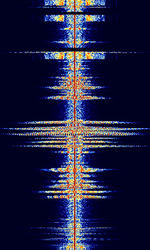 |
|
| BPC | BPC is the callsign of the Chinese low-frequency time broadcasting station, located near Shangqiu, Henan in China. | 68.5 kHzKiloHertz (kHz) 10^3 Hz | USBUpper Side Band Modulation (Radio, referring to reception and modulation mode)Universal Serial Bus (Computer, referring to USB Ports and cables) | AMAmplitude Modulation | 1 HzHertz (Hz), unit of frequency, defined as one cycle per second (1 Hz). | China | 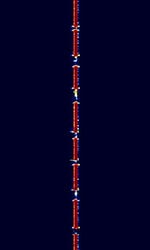 |
|
| BPM | BPM is a time signal transmitted by the Chinese Academy of Sciences, broadcasting from CAS's National Time Service Center in Pucheng County, China. | 2.5 MHzMegaHertz (MHz) 10^6 Hz — 15 MHzMegaHertz (MHz) 10^6 Hz | AMAmplitude Modulation | AMAmplitude Modulation | 3.5 kHzKiloHertz (kHz) 10^3 Hz | China | 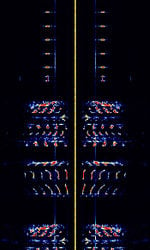 |
|
| Baofeng GMSK | Proprietary GMSKGaussian Minimum-Shift Keying mode used for voice by Fujian Baofeng walkie talkies | 400 MHzMegaHertz (MHz) 10^6 Hz — 480 MHzMegaHertz (MHz) 10^6 Hz | NFMNarrowband Frequency Modulation | GMSKGaussian Minimum-Shift Keying | 12.5 kHzKiloHertz (kHz) 10^3 Hz | Worldwide | 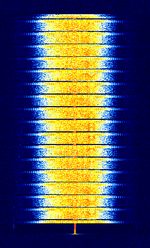 |
|
| Beta | Beta is the designation of a time signal service which is transmitted from multiple Russian VLFVery Low Frequency (3-30 kHz) stations. | 20.5 kHzKiloHertz (kHz) 10^3 Hz — 25.5 kHzKiloHertz (kHz) 10^3 Hz | USBUpper Side Band Modulation (Radio, referring to reception and modulation mode)Universal Serial Bus (Computer, referring to USB Ports and cables) | CWContinuous Wave, OOKOn-Off Keying Modulation | 200 HzHertz (Hz), unit of frequency, defined as one cycle per second (1 Hz). | Russia, Belarus, Kyrgyzstan, Worldwide | 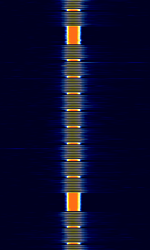 |
|
| Binary Interchange of Information and Signaling (BIIS) | BIIS (also known as BIIS 1200) is an ETSIEuropean Telecommunications Standards Institute. An independent, not-for-profit, standardization organization in the telecommunications industry in Europe, developing global telecommunications standards. protocol for a digital selective calling method with the added benefit of extended capability of transmitting data that exceeds what could be done with old 5-tone analog calling methods like CCIRComité Consultatif International pour la Radio (Predecessor of the ITU-R) and ZVEI. | 35 MHzMegaHertz (MHz) 10^6 Hz — 800 MHzMegaHertz (MHz) 10^6 Hz | NFMNarrowband Frequency Modulation | FFSKFast Frequency-Shift Keying | 6 kHzKiloHertz (kHz) 10^3 Hz | Europe | 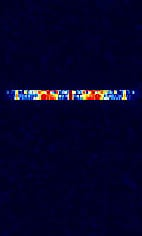 |
|
| BlueWalker-3 Wideband Telemetry | Wideband telemetry signal from BlueWalker-3 experimental satellite. | 2,245 MHzMegaHertz (MHz) 10^6 Hz | RAW | BPSKBinary Phase-Shift Keying (1 bit per symbol) | 1 MHzMegaHertz (MHz) 10^6 Hz | Worldwide | — | 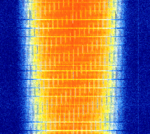 |
| Bluetooth | Bluetooth is a wireless technology standard for exchanging data over short distances from fixed and mobile devices and building personal area networks (PANs). Invented by telecom vendor Ericsson in 1994, it was initially conceived as a wireless alternative to RS-232 data cables. It can connect several devices, overcoming synchronization problems. | 2,400 MHzMegaHertz (MHz) 10^6 Hz — 2,485 MHzMegaHertz (MHz) 10^6 Hz | GFSKGaussian Frequency-Shift Keying, DPSKDifferential Phase-Shift Keying | 1 MHzMegaHertz (MHz) 10^6 Hz | Worldwide | 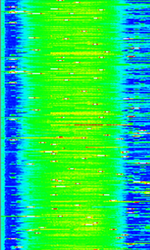 |
||
| Broadband Global Area Network (BGAN) | Proprietary satellite network owned and operated by Inmarsat that provides cellular 3G equivalent data and voice services to subscribers. | 1,525 MHzMegaHertz (MHz) 10^6 Hz — 1,559 MHzMegaHertz (MHz) 10^6 Hz | WFMWideband Frequency Modulation | QPSKQuadrature Phase-Shift Keying (2 bits per symbol) | 200 kHzKiloHertz (kHz) 10^3 Hz | Worldwide | 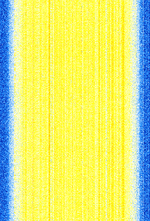 |
|
| CCIR 493-4 Selcall | CCIRComité Consultatif International pour la Radio (Predecessor of the ITU-R) 493-4 Selcall, also known as HFHigh Frequency (3-30 MHz) Selcall, Australian Selcall, and Codan 8580 Selcall, is a Selcall standard developed in Australia for the HFHigh Frequency (3-30 MHz) band. Used by Amateur radio and Codan Modems. | 3 MHzMegaHertz (MHz) 10^6 Hz — 30 MHzMegaHertz (MHz) 10^6 Hz | USBUpper Side Band Modulation (Radio, referring to reception and modulation mode)Universal Serial Bus (Computer, referring to USB Ports and cables) | FSKFrequency-Shift Keying | 300 HzHertz (Hz), unit of frequency, defined as one cycle per second (1 Hz). | Worldwide | 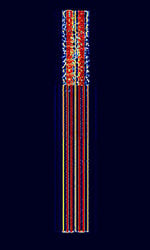 |
|
| CCIR Selcall | CCIRComité Consultatif International pour la Radio (Predecessor of the ITU-R) selcall consists of CCIRComité Consultatif International pour la Radio (Predecessor of the ITU-R)-1, CCIRComité Consultatif International pour la Radio (Predecessor of the ITU-R)-2, and PCCIR, which are 5-tone selcall modes for VHFVery High Frequency (30-300 MHz)/UHFUltra High Frequency (300-3000 MHz) radios. CCIRComité Consultatif International pour la Radio (Predecessor of the ITU-R)-1 and CCIRComité Consultatif International pour la Radio (Predecessor of the ITU-R)-2 only differ in the tone duration, and PCCIR only differs in the group, reset, and repeat tone frequencies. | 30 MHzMegaHertz (MHz) 10^6 Hz — 800 MHzMegaHertz (MHz) 10^6 Hz | NFMNarrowband Frequency Modulation | MFSKMultiple Frequency Shift-Keying | 5 kHzKiloHertz (kHz) 10^3 Hz | Worldwide | 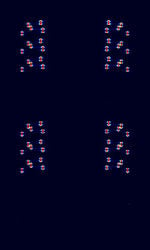 |
|
| CDMA2000 (3G physical layer) | CDMA2000, or IS-2000, is a cellular network standard utilizing the CDMACode Division Multiple Access technology for calls and data. | 450 MHzMegaHertz (MHz) 10^6 Hz — 1,900 MHzMegaHertz (MHz) 10^6 Hz | RAW | QPSKQuadrature Phase-Shift Keying (2 bits per symbol) | 1.23 MHzMegaHertz (MHz) 10^6 Hz | United States | 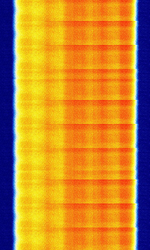 |
|
| CDMA420 | 410 MHzMegaHertz (MHz) 10^6 Hz — 425 MHzMegaHertz (MHz) 10^6 Hz | AMAmplitude Modulation | QPSKQuadrature Phase-Shift Keying (2 bits per symbol) | 2.5 MHzMegaHertz (MHz) 10^6 Hz | Poland | 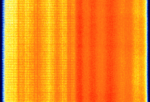 |
||
| CHU | CHU is a time signal radio station operated by the Institute for National Measurement Standards of the National Research Council of Canada. | 3.33 MHzMegaHertz (MHz) 10^6 Hz — 14.67 MHzMegaHertz (MHz) 10^6 Hz | USBUpper Side Band Modulation (Radio, referring to reception and modulation mode)Universal Serial Bus (Computer, referring to USB Ports and cables) | FSKFrequency-Shift Keying, OOKOn-Off Keying Modulation | 2.25 kHzKiloHertz (kHz) 10^3 Hz | Canada | 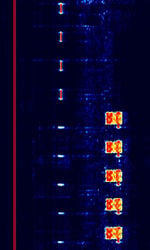 |
|
| CIS FTM-4 | CISCommonwealth of Independent States (CIS), the former Soviet Republic FTM-4 is the unofficial designation of a four-tone MFSKMultiple Frequency Shift-Keying data mode which is apparently used by Russian military. | 4 MHzMegaHertz (MHz) 10^6 Hz — 20 MHzMegaHertz (MHz) 10^6 Hz | USBUpper Side Band Modulation (Radio, referring to reception and modulation mode)Universal Serial Bus (Computer, referring to USB Ports and cables) | MFSKMultiple Frequency Shift-Keying | 13 kHzKiloHertz (kHz) 10^3 Hz | Russia | 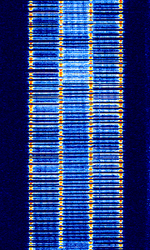 |
|
| CIS MFSK-16 XPA2 | Enigma Designation XPA2, also known as MFSKMultiple Frequency Shift-Keying-16, CISCommonwealth of Independent States (CIS), the former Soviet Republic MFSKMultiple Frequency Shift-Keying-14, and CISCommonwealth of Independent States (CIS), the former Soviet Republic MFSKMultiple Frequency Shift-Keying-16, is a 14-tone MFSKMultiple Frequency Shift-Keying signal said to have origin from Russian Intelligence and Foreign Ministry stations. | 3 MHzMegaHertz (MHz) 10^6 Hz — 30 MHzMegaHertz (MHz) 10^6 Hz | USBUpper Side Band Modulation (Radio, referring to reception and modulation mode)Universal Serial Bus (Computer, referring to USB Ports and cables) | MFSKMultiple Frequency Shift-Keying | 250 HzHertz (Hz), unit of frequency, defined as one cycle per second (1 Hz). | Russia | 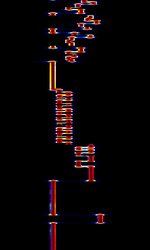 |
|
| CIS MFSK-16 XPB | Enigma designation XPB is a custom 16-tone MFSKMultiple Frequency Shift-Keying mode said to have origin from Russian Intelligence and Foreign Ministry stations. | 4.4 MHzMegaHertz (MHz) 10^6 Hz — 20 MHzMegaHertz (MHz) 10^6 Hz | USBUpper Side Band Modulation (Radio, referring to reception and modulation mode)Universal Serial Bus (Computer, referring to USB Ports and cables) | MFSKMultiple Frequency Shift-Keying | 2.8 kHzKiloHertz (kHz) 10^3 Hz | Russia | 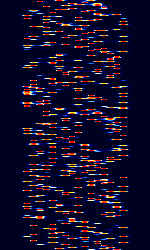 |
|
| CIS MFSK-20 XPA | Enigma Designation XPA, also known as MFSKMultiple Frequency Shift-Keying-20, CISCommonwealth of Independent States (CIS), the former Soviet Republic MFSKMultiple Frequency Shift-Keying-17, and CISCommonwealth of Independent States (CIS), the former Soviet Republic MFSKMultiple Frequency Shift-Keying-20, is a 17-tone MFSKMultiple Frequency Shift-Keying signal said to have origin from Russian Intelligence and Foreign Ministry stations. | 3 MHzMegaHertz (MHz) 10^6 Hz — 30 MHzMegaHertz (MHz) 10^6 Hz | USBUpper Side Band Modulation (Radio, referring to reception and modulation mode)Universal Serial Bus (Computer, referring to USB Ports and cables) | MFSKMultiple Frequency Shift-Keying | 800 HzHertz (Hz), unit of frequency, defined as one cycle per second (1 Hz). | Russia | 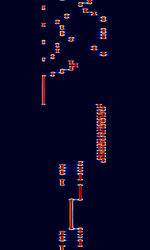 |
|
| CIS MFSK-21-13 | An MFSKMultiple Frequency Shift-Keying data mode that is believed to originate from Russian sources. Changes between MFSKMultiple Frequency Shift-Keying-21, MFSKMultiple Frequency Shift-Keying-13 and different speeds. | 4.834 MHzMegaHertz (MHz) 10^6 Hz — 16.292 MHzMegaHertz (MHz) 10^6 Hz | USBUpper Side Band Modulation (Radio, referring to reception and modulation mode)Universal Serial Bus (Computer, referring to USB Ports and cables) | MFSKMultiple Frequency Shift-Keying | 3.3 kHzKiloHertz (kHz) 10^3 Hz | Russia, Worldwide | 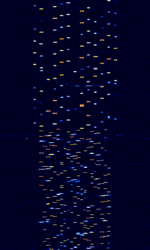 |
|
| CIS MFSK-68 | New Russian MFSKMultiple Frequency Shift-Keying Modem that uses 68 MFSKMultiple Frequency Shift-Keying (5 tones at a time) as well as a 9000 BdBaud (unit symbol Bd) is the unit for symbol rate or modulation rate in symbols per second. 8-PSK8-Phase Phase-Shift Keying (3 bits per symbol) insert every second which spans 10 kHzKiloHertz (kHz) 10^3 Hz wide. This signal is often found attributed with CISCommonwealth of Independent States (CIS), the former Soviet Republic-3000, where CISCommonwealth of Independent States (CIS), the former Soviet Republic-3000 acts as the ALEAutomatic Link Establishment for this signal as well as CISCommonwealth of Independent States (CIS), the former Soviet Republic-128. It is used by Russian diplomatic services and known with the unofficial name "Perelivt". | 7.659 MHzMegaHertz (MHz) 10^6 Hz — 18.28 MHzMegaHertz (MHz) 10^6 Hz | USBUpper Side Band Modulation (Radio, referring to reception and modulation mode)Universal Serial Bus (Computer, referring to USB Ports and cables) | MFSKMultiple Frequency Shift-Keying, PSKPhase-Shift Keying | 10 kHzKiloHertz (kHz) 10^3 Hz | Russia | 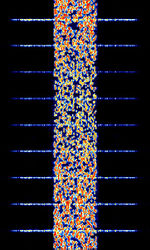 |
|
| CIS OFDM HDR Modem | Russian OFDMOrthogonal Frequency-Division Multiplexing HDR (High Data Rate) Modem. Has three main modes: CISCommonwealth of Independent States (CIS), the former Soviet Republic-45, CISCommonwealth of Independent States (CIS), the former Soviet Republic-60, and CISCommonwealth of Independent States (CIS), the former Soviet Republic-93, corresponding to the number of OFDMOrthogonal Frequency-Division Multiplexing tones in the signal. | 3 MHzMegaHertz (MHz) 10^6 Hz — 30 MHzMegaHertz (MHz) 10^6 Hz | USBUpper Side Band Modulation (Radio, referring to reception and modulation mode)Universal Serial Bus (Computer, referring to USB Ports and cables) | PSKPhase-Shift Keying, OFDMOrthogonal Frequency-Division Multiplexing | 2.8 kHzKiloHertz (kHz) 10^3 Hz — 3 kHzKiloHertz (kHz) 10^3 Hz | Russia | 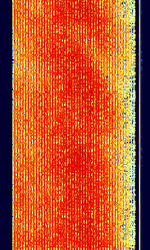 |
|
| CIS W-MFSK-17 | Presumably Russian MFSKMultiple Frequency Shift-Keying signal with wide bandwidth and 17 tones | 5.071 MHzMegaHertz (MHz) 10^6 Hz — 13.373 MHzMegaHertz (MHz) 10^6 Hz | USBUpper Side Band Modulation (Radio, referring to reception and modulation mode)Universal Serial Bus (Computer, referring to USB Ports and cables) | MFSKMultiple Frequency Shift-Keying | 37.5 kHzKiloHertz (kHz) 10^3 Hz | Russia | 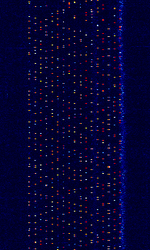 |
|
| CIS-112 | CISCommonwealth of Independent States (CIS), the former Soviet Republic-112 OFDMOrthogonal Frequency-Division Multiplexing signal. Has a preamble of 7 Tones (not including carrier), then 56 tones before entering into the 112 tone data transmission. | 3 MHzMegaHertz (MHz) 10^6 Hz — 30 MHzMegaHertz (MHz) 10^6 Hz | USBUpper Side Band Modulation (Radio, referring to reception and modulation mode)Universal Serial Bus (Computer, referring to USB Ports and cables) | PSKPhase-Shift Keying, OFDMOrthogonal Frequency-Division Multiplexing | 3 kHzKiloHertz (kHz) 10^3 Hz | Russia | 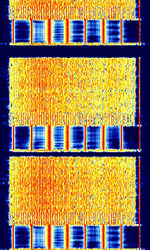 |
|
| CIS-12 | CISCommonwealth of Independent States (CIS), the former Soviet Republic-12 (Also known as MS5, FIRE, AT-3004D, AT-3104D, T-230) is a 12-tone PSKPhase-Shift Keying Russian military multi-channel modem. | 300 kHzKiloHertz (kHz) 10^3 Hz — 30 MHzMegaHertz (MHz) 10^6 Hz | USBUpper Side Band Modulation (Radio, referring to reception and modulation mode)Universal Serial Bus (Computer, referring to USB Ports and cables) | PSKPhase-Shift Keying | 3.1 kHzKiloHertz (kHz) 10^3 Hz | Russia | 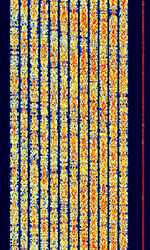 |
|
| CIS-1200 (T-230-1A 'Mahovik') | CISCommonwealth of Independent States (CIS), the former Soviet Republic-1200, Mahovik, "Flywheel" in Russian, is a PSKPhase-Shift Keying based mode that can transmit both voice and data. It is transmitted from a Russian T-230-1A. | 3 MHzMegaHertz (MHz) 10^6 Hz — 30 MHzMegaHertz (MHz) 10^6 Hz | USBUpper Side Band Modulation (Radio, referring to reception and modulation mode)Universal Serial Bus (Computer, referring to USB Ports and cables) | SDPSK, BPSKBinary Phase-Shift Keying (1 bit per symbol) | 2.5 kHzKiloHertz (kHz) 10^3 Hz | Russia | 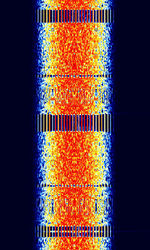 |
|
| CIS-128 | CISCommonwealth of Independent States (CIS), the former Soviet Republic-128 is an OFDMOrthogonal Frequency-Division Multiplexing mode that uses 128 channels, with one “off” channel in the center, so the signal is divided into two 64 channel parts. | 3 MHzMegaHertz (MHz) 10^6 Hz — 30 MHzMegaHertz (MHz) 10^6 Hz | USBUpper Side Band Modulation (Radio, referring to reception and modulation mode)Universal Serial Bus (Computer, referring to USB Ports and cables) | PSKPhase-Shift Keying, OFDMOrthogonal Frequency-Division Multiplexing, QAMQuadrature Amplitude Modulation | 3.1 kHzKiloHertz (kHz) 10^3 Hz — 6.1 kHzKiloHertz (kHz) 10^3 Hz | Russia | 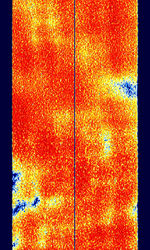 |
|
| CIS-20 | Russian AT-3104 Modem signal, 20-tone OFDMOrthogonal Frequency-Division Multiplexing DQPSKDifferential Quadrature Phase-Shift Keying signal. Has characteristic pilot tone located 3300 HzHertz (Hz), unit of frequency, defined as one cycle per second (1 Hz). from suppressed carrier. All 20 channels operate at 75 BdBaud (unit symbol Bd) is the unit for symbol rate or modulation rate in symbols per second.. | 3 MHzMegaHertz (MHz) 10^6 Hz — 30 MHzMegaHertz (MHz) 10^6 Hz | USBUpper Side Band Modulation (Radio, referring to reception and modulation mode)Universal Serial Bus (Computer, referring to USB Ports and cables) | PSKPhase-Shift Keying, OFDMOrthogonal Frequency-Division Multiplexing | 2.75 kHzKiloHertz (kHz) 10^3 Hz | Russia | 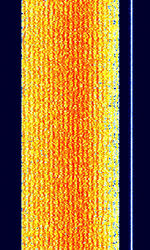 |
|
| CIS-3000 | CISCommonwealth of Independent States (CIS), the former Soviet Republic-3000 is an 8-PSK8-Phase Phase-Shift Keying (3 bits per symbol) Data Modem protocol. Its source is traced to Russia. 3000 is for its 3000 BaudBaud (unit symbol Bd) is the unit for symbol rate or modulation rate in symbols per second. speed (maximum speed is technically 9000 bpsBits per second (bps)). | 3 MHzMegaHertz (MHz) 10^6 Hz — 30 MHzMegaHertz (MHz) 10^6 Hz | USBUpper Side Band Modulation (Radio, referring to reception and modulation mode)Universal Serial Bus (Computer, referring to USB Ports and cables) | PSKPhase-Shift Keying | 3.4 kHzKiloHertz (kHz) 10^3 Hz | Russia | 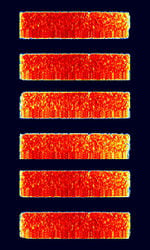 |
|
| CIS-36-50 | CISCommonwealth of Independent States (CIS), the former Soviet Republic-36-50, also known as BEE-36, is an FSKFrequency-Shift Keying modem used by the Russian Navy. | 3 MHzMegaHertz (MHz) 10^6 Hz — 30 MHzMegaHertz (MHz) 10^6 Hz | USBUpper Side Band Modulation (Radio, referring to reception and modulation mode)Universal Serial Bus (Computer, referring to USB Ports and cables) | FSKFrequency-Shift Keying | 300 HzHertz (Hz), unit of frequency, defined as one cycle per second (1 Hz). — 550 HzHertz (Hz), unit of frequency, defined as one cycle per second (1 Hz). | Russia | 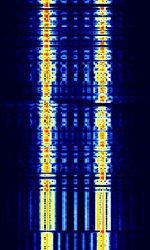 |
|
| CIS-48 | CISCommonwealth of Independent States (CIS), the former Soviet Republic-48 is an interesting data mode with a unique format. It uses a 4 DBPSK Preamble with a constant tone and changing OFDMOrthogonal Frequency-Division Multiplexing modes as it transmits data. Origin is suspected to be in Russia. | 5.017 MHzMegaHertz (MHz) 10^6 Hz — 17.289 MHzMegaHertz (MHz) 10^6 Hz | USBUpper Side Band Modulation (Radio, referring to reception and modulation mode)Universal Serial Bus (Computer, referring to USB Ports and cables) | PSKPhase-Shift Keying | 2 MHzMegaHertz (MHz) 10^6 Hz — 3 MHzMegaHertz (MHz) 10^6 Hz | Russia | 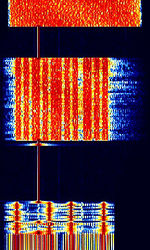 |
|
| CIS-50-50 | CISCommonwealth of Independent States (CIS), the former Soviet Republic-50-50 is very similar to CISCommonwealth of Independent States (CIS), the former Soviet Republic-36-50. The main difference is in the available baudBaud (unit symbol Bd) is the unit for symbol rate or modulation rate in symbols per second. rates and frequency shifts used. | 3 MHzMegaHertz (MHz) 10^6 Hz — 30 MHzMegaHertz (MHz) 10^6 Hz | USBUpper Side Band Modulation (Radio, referring to reception and modulation mode)Universal Serial Bus (Computer, referring to USB Ports and cables) | FSKFrequency-Shift Keying | 150 HzHertz (Hz), unit of frequency, defined as one cycle per second (1 Hz). — 630 HzHertz (Hz), unit of frequency, defined as one cycle per second (1 Hz). | Russia | 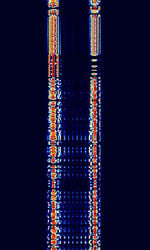 |
|
| CLOUDSAT Downlink | Dump to European ground station from the CLOUDSAT cloud profiling satellite. CLOUDSAT has a CPR (Cloud Profiling Radar) that operates at 94 GHzGigaHertz (GHz) 10^9 Hz to create a vertical sounding (cross-section) of the atmosphere. | 2,217.5 MHzMegaHertz (MHz) 10^6 Hz | RAW | BPSKBinary Phase-Shift Keying (1 bit per symbol) | 2 MHzMegaHertz (MHz) 10^6 Hz | Europe | — |  |
| CLOVER 2000 | CLOVER 2000 is an upgrade to CLOVER-II, a digital data protocol developed by Ray Petit and HAL Communications. Sometimes referred to as XCLOVER or 8 Tone CLOVER. | 3 MHzMegaHertz (MHz) 10^6 Hz — 30 MHzMegaHertz (MHz) 10^6 Hz | USBUpper Side Band Modulation (Radio, referring to reception and modulation mode)Universal Serial Bus (Computer, referring to USB Ports and cables) | PSKPhase-Shift Keying, QAMQuadrature Amplitude Modulation | 2 kHzKiloHertz (kHz) 10^3 Hz | Worldwide | 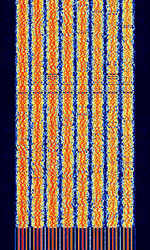 |
|
| CLOVER 2500 | CLOVER 2500 is a new upgrade to CLOVER-2000, adding 25% more speed to the CLOVER system. | 3 MHzMegaHertz (MHz) 10^6 Hz — 30 MHzMegaHertz (MHz) 10^6 Hz | USBUpper Side Band Modulation (Radio, referring to reception and modulation mode)Universal Serial Bus (Computer, referring to USB Ports and cables) | PSKPhase-Shift Keying, QAMQuadrature Amplitude Modulation | 2.5 kHzKiloHertz (kHz) 10^3 Hz | Worldwide | 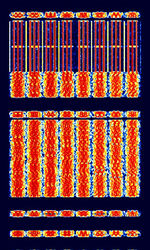 |
|
| CLOVER-II | CLOVER-II is the advancement of CLOVER-I, with 4 tone pulses and a max data rate of 750 bpsBits per second (bps). Also known as Q-CLOVER and QUAD-CLOVER. | 3 MHzMegaHertz (MHz) 10^6 Hz — 30 MHzMegaHertz (MHz) 10^6 Hz | USBUpper Side Band Modulation (Radio, referring to reception and modulation mode)Universal Serial Bus (Computer, referring to USB Ports and cables) | PSKPhase-Shift Keying, QAMQuadrature Amplitude Modulation | 500 HzHertz (Hz), unit of frequency, defined as one cycle per second (1 Hz). | Worldwide | 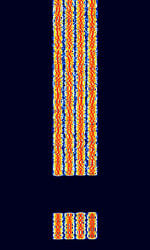 |
|
| CODAR | CODAR (Coastal Ocean Dynamics Applications Radar) is used for near-surface ocean monitoring, such as waves and water current. | 4.438 MHzMegaHertz (MHz) 10^6 Hz — 42.5 MHzMegaHertz (MHz) 10^6 Hz | USBUpper Side Band Modulation (Radio, referring to reception and modulation mode)Universal Serial Bus (Computer, referring to USB Ports and cables) | ILFM | 50 kHzKiloHertz (kHz) 10^3 Hz | Worldwide | 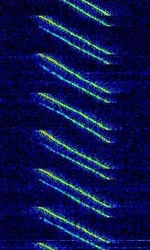 |
|
| COFDMTV | COFDMTV is an easy-to-use picture transmission mode based on Coded Orthogonal Frequency-Division Multiplexing (COFDMCoded Orthogonal Frequency-Division Multiplexing). | SSBSingle-sideband modulation,FMFrequency Modulation,AMAmplitude Modulation | COFDMCoded Orthogonal Frequency-Division Multiplexing, 8-PSK8-Phase Phase-Shift Keying (3 bits per symbol), QPSKQuadrature Phase-Shift Keying (2 bits per symbol) | 1.6 kHzKiloHertz (kHz) 10^3 Hz — 3.2 kHzKiloHertz (kHz) 10^3 Hz |  |
|||
| CORIOLIS Tactical Direct Broadcast | Direct Broadcast digital signal from the CORIOLIS satellite, primarily carries data from the WindSat instrument. | 2,221.5 MHzMegaHertz (MHz) 10^6 Hz | RAW | BPSKBinary Phase-Shift Keying (1 bit per symbol) | 2 MHzMegaHertz (MHz) 10^6 Hz | Worldwide | — |  |
| Canadian Meteor Orbit Radar (CMOR) | Canadian Meteor Orbit Radar, or CMOR, is a meteor detection radar located near Tavistock, Ontario. | 17.45 MHzMegaHertz (MHz) 10^6 Hz — 38.15 MHzMegaHertz (MHz) 10^6 Hz | AMAmplitude Modulation | Pulsed | 28 kHzKiloHertz (kHz) 10^3 Hz | Canada | 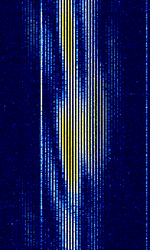 |
|
| Chilean Naval Time Signal | Naval VHFVery High Frequency (30-300 MHz) time signal found in Chilean Coast, in Vina Del Mar | 148.125 MHzMegaHertz (MHz) 10^6 Hz | NFMNarrowband Frequency Modulation | FMFrequency Modulation | 12.5 kHzKiloHertz (kHz) 10^3 Hz | Chile | 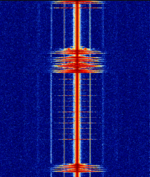 |
|
| China digital radio (CDR) | Convergent Digital Radio (CDR) or China Digital Radio is an in-band-on-channel (IBOCIn-Band On-Channel (IBOC) is a hybrid method of transmitting digital radio and analog radio broadcast signals simultaneously on the same frequency.) digital radio broadcasting format used in China. It can be found in multiple bandwidth configurations with different modulation formats. | 106.1 MHzMegaHertz (MHz) 10^6 Hz | USBUpper Side Band Modulation (Radio, referring to reception and modulation mode)Universal Serial Bus (Computer, referring to USB Ports and cables) | OFDMOrthogonal Frequency-Division Multiplexing | 100 kHzKiloHertz (kHz) 10^3 Hz — 500 kHzKiloHertz (kHz) 10^3 Hz | China | 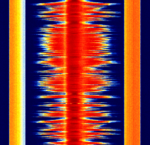 |
|
| Chinese 'Foghorn' OTH radar | A Chinese over the horizon radar, known as "foghorn" among amateur radio operators. Not much is known about it. | 6 MHzMegaHertz (MHz) 10^6 Hz — 29 MHzMegaHertz (MHz) 10^6 Hz | USBUpper Side Band Modulation (Radio, referring to reception and modulation mode)Universal Serial Bus (Computer, referring to USB Ports and cables) | FMCW | 10 kHzKiloHertz (kHz) 10^3 Hz | China, Worldwide | 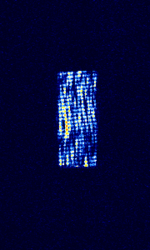 |
|
| Chinese 160kHz-wide OTH radar | Chinese OTHOver The Horizon (very long range) radar with wide bandwidth and usually low sweep rate. Little information is available. | 6 MHzMegaHertz (MHz) 10^6 Hz — 29 MHzMegaHertz (MHz) 10^6 Hz | USBUpper Side Band Modulation (Radio, referring to reception and modulation mode)Universal Serial Bus (Computer, referring to USB Ports and cables) | FMCW | 160 kHzKiloHertz (kHz) 10^3 Hz | China | 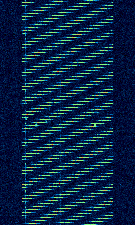 |
|
| Chinese 30-tone OFDM modem | A 30-tone OFDMOrthogonal Frequency-Division Multiplexing data mode, probably used by Chinese military or other agencies. | 3.618 MHzMegaHertz (MHz) 10^6 Hz — 18.656 MHzMegaHertz (MHz) 10^6 Hz | LSBLower Side Band Modulation, USBUpper Side Band Modulation (Radio, referring to reception and modulation mode)Universal Serial Bus (Computer, referring to USB Ports and cables) | QPSKQuadrature Phase-Shift Keying (2 bits per symbol), BPSKBinary Phase-Shift Keying (1 bit per symbol), OFDMOrthogonal Frequency-Division Multiplexing | 3 kHzKiloHertz (kHz) 10^3 Hz | China, Worldwide | 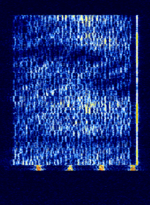 |
|
| Chinese 4+4 | Chinese 4+4, also known as 4+4 or PRC 4+4, is a multi-carrier transmission mode. It used by Chinese Diplomatic services with most traffic originating from Beijing, China. | 3 MHzMegaHertz (MHz) 10^6 Hz — 30 MHzMegaHertz (MHz) 10^6 Hz | USBUpper Side Band Modulation (Radio, referring to reception and modulation mode)Universal Serial Bus (Computer, referring to USB Ports and cables) | PSKPhase-Shift Keying | 2.5 kHzKiloHertz (kHz) 10^3 Hz | China | 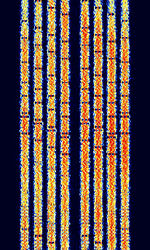 |
|
| Chinese Firedrake Jammer | Commercial AMAmplitude Modulation Broadcast jamming signal that plays Chinese folk songs to jam specific radio stations in Asia from being received by listeners. | 6 MHzMegaHertz (MHz) 10^6 Hz — 18 MHzMegaHertz (MHz) 10^6 Hz | AMAmplitude Modulation | AMAmplitude Modulation | 10 kHzKiloHertz (kHz) 10^3 Hz | China | 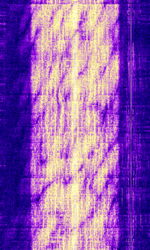 |
|
| Chinese Multitonal Jammer | Chinese radio jamming signals intended to disrupt/censor broadcast communications. | 9.045 MHzMegaHertz (MHz) 10^6 Hz | USBUpper Side Band Modulation (Radio, referring to reception and modulation mode)Universal Serial Bus (Computer, referring to USB Ports and cables) | PPMPulse Position Modulation | 10 kHzKiloHertz (kHz) 10^3 Hz | Worldwide | 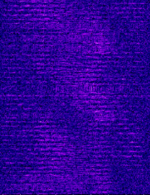 |
|
| Chinese-64 MFSK | Chinese Modem MFSKMultiple Frequency Shift-Keying-64 | 3.673 MHzMegaHertz (MHz) 10^6 Hz — 16.989 MHzMegaHertz (MHz) 10^6 Hz | USBUpper Side Band Modulation (Radio, referring to reception and modulation mode)Universal Serial Bus (Computer, referring to USB Ports and cables),LSBLower Side Band Modulation (rare) | MFSKMultiple Frequency Shift-Keying | 2.5 kHzKiloHertz (kHz) 10^3 Hz | China |  |
|
| Cobra Dane | The AN/FPS-108 COBRA DANE is a PESA phased array radar installation operated by Raytheon for the United States Space Force (originally for the United States Air Force) at Eareckson Air Station on the island of Shemya, Aleutian Islands, Alaska. | 1,215 MHzMegaHertz (MHz) 10^6 Hz — 1,400 MHzMegaHertz (MHz) 10^6 Hz | United States | — |  |
|||
| Codan Data Modem | Codan Data Modulation for Codan Data Modems. Has 3 distinct signals: Data, ALEAutomatic Link Establishment, and SELCAL. This modulation is used in Codan's 9001, 9002, 3012 and 3212 modems. | 3 MHzMegaHertz (MHz) 10^6 Hz — 30 MHzMegaHertz (MHz) 10^6 Hz | USBUpper Side Band Modulation (Radio, referring to reception and modulation mode)Universal Serial Bus (Computer, referring to USB Ports and cables) | PSKPhase-Shift Keying, FSKFrequency-Shift Keying | 400 HzHertz (Hz), unit of frequency, defined as one cycle per second (1 Hz). — 2.56 kHzKiloHertz (kHz) 10^3 Hz | Worldwide | 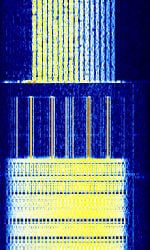 |
|
| CompuLert | Low speed FSKFrequency-Shift Keying telemetry to monitor and control warning sirens that are used to warn the public of threats such as tsunamis, severe weather, chemical spills and civil emergencies. | 453.375 MHzMegaHertz (MHz) 10^6 Hz | NFMNarrowband Frequency Modulation | FSKFrequency-Shift Keying | 5 kHzKiloHertz (kHz) 10^3 Hz | Worldwide | 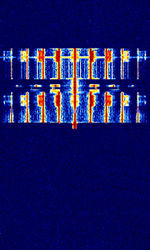 |
|
| Contestia | Contestia, developed by Nick Fedoseev (UT2UZ) in 2005, is a digital mode derived from Olivia. It aims to deliver a compromise of speed and performance. | 3 MHzMegaHertz (MHz) 10^6 Hz — 30 MHzMegaHertz (MHz) 10^6 Hz | USBUpper Side Band Modulation (Radio, referring to reception and modulation mode)Universal Serial Bus (Computer, referring to USB Ports and cables) | MFSKMultiple Frequency Shift-Keying | 150 HzHertz (Hz), unit of frequency, defined as one cycle per second (1 Hz). — 2 kHzKiloHertz (kHz) 10^3 Hz | Worldwide | 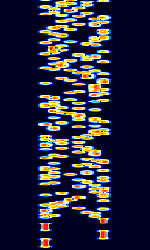 |
|
| Continuous Tone-Coded Squelch System (CTCSS) | CTCSS, also known as Private Line and Channel Guard, is a low continuous tone transmitted on NFMNarrowband Frequency Modulation voice transmissions that is used to squelch and manage transmissions on a given frequency. | 30 MHzMegaHertz (MHz) 10^6 Hz — 800 MHzMegaHertz (MHz) 10^6 Hz | NFMNarrowband Frequency Modulation | CWContinuous Wave | 5 kHzKiloHertz (kHz) 10^3 Hz — 30 kHzKiloHertz (kHz) 10^3 Hz | Worldwide | 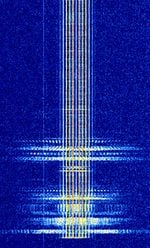 |
|
| Cuban Jammer | Cuban jammers jam the frequencies of Radio Martí, Radio Republica and occasionally WRMI radio. | 5.98 MHzMegaHertz (MHz) 10^6 Hz — 13.82 MHzMegaHertz (MHz) 10^6 Hz | DSBDual Side Band Modulation | 10 kHzKiloHertz (kHz) 10^3 Hz | Cuba | 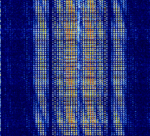 |
||
| D-STAR | D-STAR is a digital voice protocol used by ham radio. Is sometimes routed over the internet for international communications. | 145.67 MHzMegaHertz (MHz) 10^6 Hz | NFMNarrowband Frequency Modulation | GMSKGaussian Minimum-Shift Keying | 6.25 kHzKiloHertz (kHz) 10^3 Hz | Worldwide | 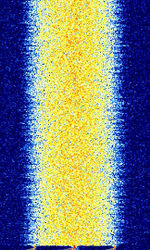 |
|
| DB0UPB research beacon | The is a research beacon for training neural networks. | 3.6 MHzMegaHertz (MHz) 10^6 Hz — 14.101 MHzMegaHertz (MHz) 10^6 Hz | LSBLower Side Band Modulation, USBUpper Side Band Modulation (Radio, referring to reception and modulation mode)Universal Serial Bus (Computer, referring to USB Ports and cables) | MFSKMultiple Frequency Shift-Keying, LSBLower Side Band Modulation, USBUpper Side Band Modulation (Radio, referring to reception and modulation mode)Universal Serial Bus (Computer, referring to USB Ports and cables) | 2.7 kHzKiloHertz (kHz) 10^3 Hz | Germany | 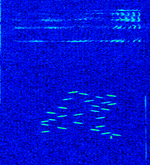 |
|
| DCF77 | DCF77 is a German longwave time signal radio station based at 77.5 kHzKiloHertz (kHz) 10^3 Hz. DCF uses an AMAmplitude Modulation modulated carrier and phase modulation sidebands to transmit its time signal. | 77.5 kHzKiloHertz (kHz) 10^3 Hz | USBUpper Side Band Modulation (Radio, referring to reception and modulation mode)Universal Serial Bus (Computer, referring to USB Ports and cables) | AMAmplitude Modulation, PSKPhase-Shift Keying | 1.3 kHzKiloHertz (kHz) 10^3 Hz | Germany | 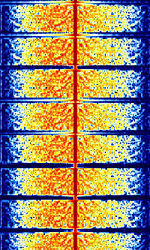 |
|
| Datawell Buoy HF Link | Datawell Buoy HFHigh Frequency (3-30 MHz) Links transmitted by Datawell Marine measurement buoys, measuring ocean conditions, temperature, and wave current. | 25.5 MHzMegaHertz (MHz) 10^6 Hz — 45 MHzMegaHertz (MHz) 10^6 Hz | USBUpper Side Band Modulation (Radio, referring to reception and modulation mode)Universal Serial Bus (Computer, referring to USB Ports and cables) | FSKFrequency-Shift Keying, MFSKMultiple Frequency Shift-Keying | 200 HzHertz (Hz), unit of frequency, defined as one cycle per second (1 Hz). — 400 HzHertz (Hz), unit of frequency, defined as one cycle per second (1 Hz). | Worldwide | 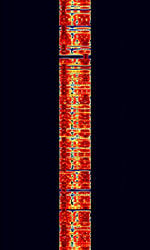 |
|
| Denso 4EA Key Fob | Denso Wireless Key Fob 4EA built by Denso Corporation for General Motors auto brands Chevrolet and Buick. Used on Chevrolet Camaro and Malibu from 2016+. Used on Buick Lacrosse 2017+. | 433.92 MHzMegaHertz (MHz) 10^6 Hz | AMAmplitude Modulation | AMAmplitude Modulation, ASKAmplitude-Shift Keying | 15 kHzKiloHertz (kHz) 10^3 Hz | Worldwide | 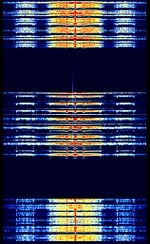 |
|
| Differential Global Positioning System (DGPS) | Differential GPS (DGPS), also known as M823 DGPS and SC-104 DGPS, is a supplementary correction signal used by GPS receivers to increase the accuracy of GPS based positioning. | 283.5 kHzKiloHertz (kHz) 10^3 Hz — 2.95 MHzMegaHertz (MHz) 10^6 Hz | USBUpper Side Band Modulation (Radio, referring to reception and modulation mode)Universal Serial Bus (Computer, referring to USB Ports and cables) | MSKMinimum-Shift Keying (When Shift/Bd = 0.5. It is impossible to get this ratio to be lower than 0.5, hence it is called the 'Minimum' shift.) | 150 HzHertz (Hz), unit of frequency, defined as one cycle per second (1 Hz). — 250 HzHertz (Hz), unit of frequency, defined as one cycle per second (1 Hz). | Worldwide | 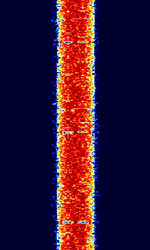 |
|
| Digisonde | Digisondes are ionosondes that use pulsed signal that can gather more radar information than a traditional ionosonde sweep. | 500 kHzKiloHertz (kHz) 10^3 Hz — 30 MHzMegaHertz (MHz) 10^6 Hz | RAW | Pulsed | 30 kHzKiloHertz (kHz) 10^3 Hz | Worldwide | 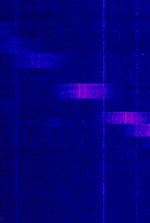 |
|
| Digital Audio Broadcasting (DAB) | DAB is an audio broadcasting standard containing a multiplex of digital radio stations in the signal. | 174 MHzMegaHertz (MHz) 10^6 Hz — 239 MHzMegaHertz (MHz) 10^6 Hz | AMAmplitude Modulation | OFDMOrthogonal Frequency-Division Multiplexing | 1.536 MHzMegaHertz (MHz) 10^6 Hz | Worldwide | ||
| Digital Audio Broadcasting Plus (DAB+) | DAB+ is a medium of delivering broadcast radio, containing multiple stations in a single multiplex. | 174 MHzMegaHertz (MHz) 10^6 Hz — 230 MHzMegaHertz (MHz) 10^6 Hz | OFDMOrthogonal Frequency-Division Multiplexing | 1.536 MHzMegaHertz (MHz) 10^6 Hz | Worldwide | |||
| Digital Dispatch Systems MDT | Digital Dispatch Systems Mobile Data Terminal is a dispatching system used by taxi and private transportation companies. | 152 MHzMegaHertz (MHz) 10^6 Hz — 854.788 MHzMegaHertz (MHz) 10^6 Hz | NFMNarrowband Frequency Modulation | PSKPhase-Shift Keying | 8 kHzKiloHertz (kHz) 10^3 Hz | United States | 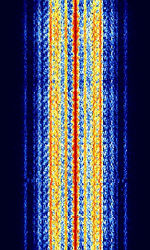 |
|
| Digital Enhanced Cordless Telecommunications (DECT) | DECT is a ETSIEuropean Telecommunications Standards Institute. An independent, not-for-profit, standardization organization in the telecommunications industry in Europe, developing global telecommunications standards. standard for short range communications, mainly cordless phones. It uses a 10 channel/24 slots in a TDMATime Division Multiple Access FDD structure. Audio sample is 100 times slower than real for listening purposes. | 1,880 MHzMegaHertz (MHz) 10^6 Hz — 1,900 MHzMegaHertz (MHz) 10^6 Hz | USBUpper Side Band Modulation (Radio, referring to reception and modulation mode)Universal Serial Bus (Computer, referring to USB Ports and cables) | GFSKGaussian Frequency-Shift Keying | 1.6 MHzMegaHertz (MHz) 10^6 Hz | Worldwide | 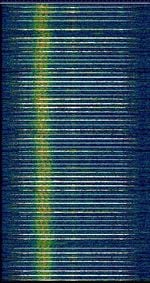 |
|
| Digital Mobile Radio (DMR) | Digital Mobile Radio (DMR) is an open digital mobile radio standard defined by ETSIEuropean Telecommunications Standards Institute. An independent, not-for-profit, standardization organization in the telecommunications industry in Europe, developing global telecommunications standards. and used in commercial products around the world. Mostly used by private network and local police, can be encrypted. Used in MOTOTRBO products. | 66 MHzMegaHertz (MHz) 10^6 Hz — 860 MHzMegaHertz (MHz) 10^6 Hz | NFMNarrowband Frequency Modulation | 4FSK4-Level Frequency Shift Keying | 12.5 kHzKiloHertz (kHz) 10^3 Hz | Worldwide | 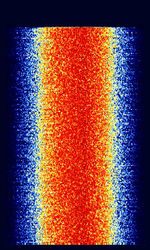 |
|
| Digital Multimedia Broadcasting (DMB) | Digital Multimedia Broadcasting (DMB) is a digital radio transmission technology developed in South Korea as part of the national IT project for sending multimedia such as TV, radio and datacasting to mobile devices such as mobile phones, laptops and GPS navigation systems. | 174 MHzMegaHertz (MHz) 10^6 Hz — 216 MHzMegaHertz (MHz) 10^6 Hz | DQPSKDifferential Quadrature Phase-Shift Keying, OFDMOrthogonal Frequency-Division Multiplexing | 1.536 MHzMegaHertz (MHz) 10^6 Hz | South Korea | — |  |
|
| Digital NBTV | Method for transmitting digital images via radio, similar to WinDRM or KG-STV | 3 MHzMegaHertz (MHz) 10^6 Hz — 470 MHzMegaHertz (MHz) 10^6 Hz | SSBSingle-sideband modulation, FMFrequency Modulation | BPSKBinary Phase-Shift Keying (1 bit per symbol) | 2.5 kHzKiloHertz (kHz) 10^3 Hz | Worldwide |  |
|
| Digital Private Mobile Radio (dPMR) | dPMR is an open, non-proprietary trunked radio standard developed by ETSIEuropean Telecommunications Standards Institute. An independent, not-for-profit, standardization organization in the telecommunications industry in Europe, developing global telecommunications standards., published under ETSIEuropean Telecommunications Standards Institute. An independent, not-for-profit, standardization organization in the telecommunications industry in Europe, developing global telecommunications standards. TS 102 658. Supports both data and digital voice transmission. | 149.019 MHzMegaHertz (MHz) 10^6 Hz — 446.2 MHzMegaHertz (MHz) 10^6 Hz | NFMNarrowband Frequency Modulation | 4FSK4-Level Frequency Shift Keying | 6.25 kHzKiloHertz (kHz) 10^3 Hz | Worldwide | 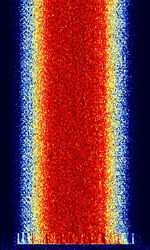 |
|
| Digital Radio Mondiale (DRM) | Digital Radio Mondiale (DRM) is a digital commercial broadcasting mode used to deliver FMFrequency Modulation-comparable sound quality to shortwave radio. | 531 kHzKiloHertz (kHz) 10^3 Hz — 26.06 MHzMegaHertz (MHz) 10^6 Hz | USBUpper Side Band Modulation (Radio, referring to reception and modulation mode)Universal Serial Bus (Computer, referring to USB Ports and cables) | QAMQuadrature Amplitude Modulation, OFDMOrthogonal Frequency-Division Multiplexing | 4.5 kHzKiloHertz (kHz) 10^3 Hz — 20 kHzKiloHertz (kHz) 10^3 Hz | Worldwide | 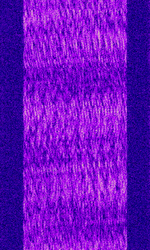 |
|
| Digital Radio Mondiale Plus (DRM+) | DRM+ is a VHFVery High Frequency (30-300 MHz) implementation of DRM primarily for the FMFrequency Modulation broadcast band. | 47 MHzMegaHertz (MHz) 10^6 Hz — 230 MHzMegaHertz (MHz) 10^6 Hz | OFDMOrthogonal Frequency-Division Multiplexing | 100 kHzKiloHertz (kHz) 10^3 Hz | Worldwide | — |  |
|
| Digital Video Broadcasting — Terrestrial (DVB-T) | Digital Video Broadcasting — Terrestrial (DVB-T) is a digital broadcast television format used in Europe and in many other countries in the world. | 174 MHzMegaHertz (MHz) 10^6 Hz — 786 MHzMegaHertz (MHz) 10^6 Hz | USBUpper Side Band Modulation (Radio, referring to reception and modulation mode)Universal Serial Bus (Computer, referring to USB Ports and cables) | QAMQuadrature Amplitude Modulation, OFDMOrthogonal Frequency-Division Multiplexing, QPSKQuadrature Phase-Shift Keying (2 bits per symbol) | 6 MHzMegaHertz (MHz) 10^6 Hz — 8 MHzMegaHertz (MHz) 10^6 Hz | Worldwide | 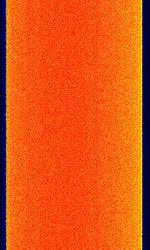 |
|
| Digital-Coded Squelch (DCS) | Digital in-band signalling used to squelch and manage transmissions on a given frequency. | 433 MHzMegaHertz (MHz) 10^6 Hz — 446 MHzMegaHertz (MHz) 10^6 Hz | NFMNarrowband Frequency Modulation | FSKFrequency-Shift Keying | Worldwide | 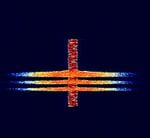 |
||
| Distress Radiobeacon (Analog) | Analog Distress Radiobeacons are simple siren-based transmitters that were installed in older EPIRB's, PLB's and ELT's. Currently used as a supplementary homing signal in modern digital radiobeacons. | 121.5 MHzMegaHertz (MHz) 10^6 Hz — 243 MHzMegaHertz (MHz) 10^6 Hz | AMAmplitude Modulation | AMAmplitude Modulation | 10 kHzKiloHertz (kHz) 10^3 Hz | Worldwide | ||
| Distress Radiobeacon (Digital) | Digital Distress Radiobeacons (EPIRB's, PLB's and ELT's) are emergency radio beacons used for search and rescue operations to locate a vessel, plane, or person in distress. | 406 MHzMegaHertz (MHz) 10^6 Hz | NFMNarrowband Frequency Modulation | PSKPhase-Shift Keying | 1.4 kHzKiloHertz (kHz) 10^3 Hz | Worldwide | 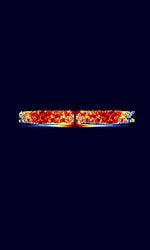 |
|
| Driftnet Buoy Radio Beacon | Driftnet Radio Buoys are extensively used by fishing boats operating in open seas and oceans for collecting long fishing lines or fishing nets, with the assistance of a radio direction finder | 1.6 MHzMegaHertz (MHz) 10^6 Hz — 28 MHzMegaHertz (MHz) 10^6 Hz | USBUpper Side Band Modulation (Radio, referring to reception and modulation mode)Universal Serial Bus (Computer, referring to USB Ports and cables) | OOKOn-Off Keying Modulation | 1 HzHertz (Hz), unit of frequency, defined as one cycle per second (1 Hz). | Worldwide | 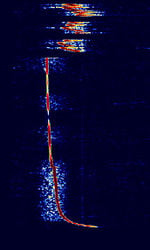 |
|
| Dual Tone Multi Frequency (DTMF) | DTMF is a signaling mode used for a variety of purposes. It's most known for telephony dialing, but is in use for many different applications such as DTMF paging for DTMF-enabled VHFVery High Frequency (30-300 MHz)/UHFUltra High Frequency (300-3000 MHz) radios. | 30 MHzMegaHertz (MHz) 10^6 Hz — 800 MHzMegaHertz (MHz) 10^6 Hz | NFMNarrowband Frequency Modulation | MFSKMultiple Frequency Shift-Keying | 3.3 kHzKiloHertz (kHz) 10^3 Hz | Worldwide | 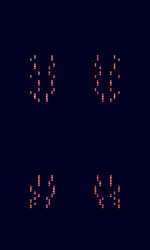 |
|
| EFR Teleswitch | Europäische Funk-Rundsteuerung (EFR) Teleswitch (European Radio Ripple Control GmbH (ERA) Teleswitch) is an energy management system operated via long-wave radio. Uses two transmitters in Germany and one in Hungary. Also known by DCF39, DCF49 and HGA22. | 129.1 kHzKiloHertz (kHz) 10^3 Hz — 139.9 kHzKiloHertz (kHz) 10^3 Hz | USBUpper Side Band Modulation (Radio, referring to reception and modulation mode)Universal Serial Bus (Computer, referring to USB Ports and cables) | FSKFrequency-Shift Keying | 1 kHzKiloHertz (kHz) 10^3 Hz | Europe | 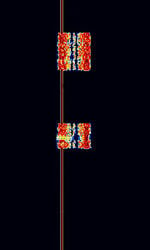 |
|
| ELEKTRO-L GGAK-E Direct Broadcast | Broadcasts the data from the GGAK-E cosmic ray detector onboard ELEKTRO-L geostationary weather satellites | 1,693 MHzMegaHertz (MHz) 10^6 Hz | DSBDual Side Band Modulation | PSKPhase-Shift Keying | 15 kHzKiloHertz (kHz) 10^3 Hz | Asia, Europe | 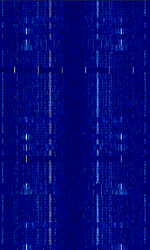 |
|
| EasyPal Digital SSTV | Seen it on the Web-SDR Twente. It could be on any frequency.
It's quite a short signal to contain a picture. Text (a callsign?) is visible in the waterfall sometimes at the end and sometimes at the beginning of the sound burst. In the audio file it is at the beginning. The signal begins at 30 second mark. Someone suggested it was Easypal made signal |
3.735 MHzMegaHertz (MHz) 10^6 Hz | LSBLower Side Band Modulation | 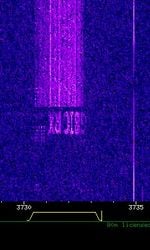 |
||||
| Emergency Alert System (EAS) | The Emergency Alert System (EAS) is a national warning system in the United States, implemented since 1997, superceding the Emergency Broadcast System (EBS). | 162.4 MHzMegaHertz (MHz) 10^6 Hz — 162.55 MHzMegaHertz (MHz) 10^6 Hz | NFMNarrowband Frequency Modulation | AFSKAudio Frequency-Shift Keying | 1.2 kHzKiloHertz (kHz) 10^3 Hz | United States | 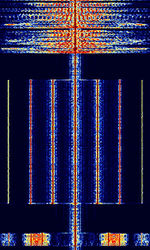 |
|
| End of Train Device (EOTD) | Transmits train telemetry such as brake status and accidental separation information to the head locomotive. | 452 HzHertz (Hz), unit of frequency, defined as one cycle per second (1 Hz). — 457.938 MHzMegaHertz (MHz) 10^6 Hz | NFMNarrowband Frequency Modulation | FSKFrequency-Shift Keying | 8 kHzKiloHertz (kHz) 10^3 Hz | Worldwide | 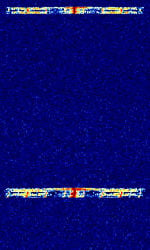 |
|
| Enhanced Digital Access Communications System (EDACS) | EDACS is a trunked radio system developed by General Electric and Ericsson. EDACS was invented by General Electric in the mid-80s and is currently owned by Harris Corporation. Harris has announced that EDACS systems will no longer be supported by 2017. | 160 MHzMegaHertz (MHz) 10^6 Hz — 941 MHzMegaHertz (MHz) 10^6 Hz | NFMNarrowband Frequency Modulation | GFSKGaussian Frequency-Shift Keying | 6.25 kHzKiloHertz (kHz) 10^3 Hz — 12.5 kHzKiloHertz (kHz) 10^3 Hz | Worldwide | 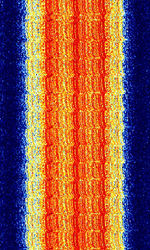 |
|
| Eurobalise downlink | Downlink from train to balise. A Eurobalise is a specific variant of a balise, a transponder placed between the rails of a railway. | 27.095 MHzMegaHertz (MHz) 10^6 Hz | AMAmplitude Modulation | Europe | 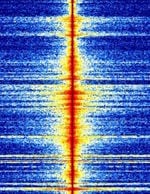 |
|||
| F03 numbers station | Enigma designation F03 is a family of digital FSKFrequency-Shift Keying modes, used by the "Polish 11" numbers station operator, which is likely a Polish intelligence agency. | 4 MHzMegaHertz (MHz) 10^6 Hz — 21 MHzMegaHertz (MHz) 10^6 Hz | USBUpper Side Band Modulation (Radio, referring to reception and modulation mode)Universal Serial Bus (Computer, referring to USB Ports and cables) | FSKFrequency-Shift Keying, MFSKMultiple Frequency Shift-Keying | 200 HzHertz (Hz), unit of frequency, defined as one cycle per second (1 Hz). — 800 HzHertz (Hz), unit of frequency, defined as one cycle per second (1 Hz). | Worldwide, Poland | 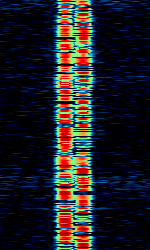 |
|
| F07 number station | F07 is a Russian digital number station known for using multiple modulation types, including MFSKMultiple Frequency Shift-Keying, BPSKBinary Phase-Shift Keying (1 bit per symbol) and FSKFrequency-Shift Keying. | 5 MHzMegaHertz (MHz) 10^6 Hz — 17.5 MHzMegaHertz (MHz) 10^6 Hz | USBUpper Side Band Modulation (Radio, referring to reception and modulation mode)Universal Serial Bus (Computer, referring to USB Ports and cables) | MFSKMultiple Frequency Shift-Keying, BPSKBinary Phase-Shift Keying (1 bit per symbol), FSKFrequency-Shift Keying | 4 kHzKiloHertz (kHz) 10^3 Hz | Russia | 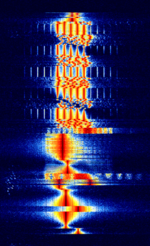 |
|
| FLEX | FLEX (Flexible Wide Area Paging Protocol) is Motorola's high speed one-way paging protocol that supports 1600, 3200, and 6400 bpsBits per second (bps). FLEX can transmit tone, numeric, alphanumeric, and binary data. | 152.6 MHzMegaHertz (MHz) 10^6 Hz — 931.938 MHzMegaHertz (MHz) 10^6 Hz | NFMNarrowband Frequency Modulation | FSKFrequency-Shift Keying, 4FSK4-Level Frequency Shift Keying | 5 kHzKiloHertz (kHz) 10^3 Hz | Worldwide | 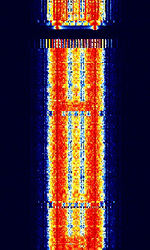 |
|
| FM Broadcast Radio | Commercial Broadcast FMFrequency Modulation radio stations. Used for the broadcast of many different radio programs, including music, news, sports, weather, and talk shows. | 65 MHzMegaHertz (MHz) 10^6 Hz — 108 MHzMegaHertz (MHz) 10^6 Hz | WFMWideband Frequency Modulation | FMFrequency Modulation | 38 kHzKiloHertz (kHz) 10^3 Hz — 200 kHzKiloHertz (kHz) 10^3 Hz | Worldwide | 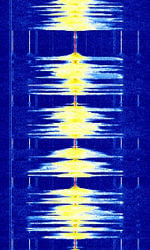 |
|
| FM NBTV | FMFrequency Modulation NBTV is a method to send moving images in a very narrow bandwidth (maximum 3 KHzKiloHertz (kHz) 10^3 Hz) | 3 MHzMegaHertz (MHz) 10^6 Hz — 470 MHzMegaHertz (MHz) 10^6 Hz | SSBSingle-sideband modulation, FMFrequency Modulation | FMFrequency Modulation, BPSKBinary Phase-Shift Keying (1 bit per symbol) | 2.3 kHzKiloHertz (kHz) 10^3 Hz | Worldwide | 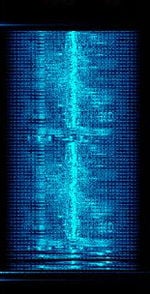 |
|
| FSQ | Fast Simple QSO (FSQ) is an amateur radio digital modulation mode developed by Con Wassilieff ZL2AFP with Murray Greenman ZL1BPU in 2015. | 3.58 MHzMegaHertz (MHz) 10^6 Hz — 10.149 MHzMegaHertz (MHz) 10^6 Hz | USBUpper Side Band Modulation (Radio, referring to reception and modulation mode)Universal Serial Bus (Computer, referring to USB Ports and cables) | IFK+Offset Incremental Frequency Keying | 300 HzHertz (Hz), unit of frequency, defined as one cycle per second (1 Hz). | Worldwide | 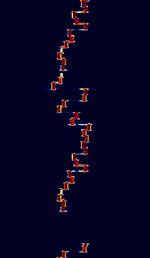 |
|
| FST4W | FST4W is an amateur radio digital protocol designed particularly for the LFLow Frequency (30-300 kHz) and MFMedium Frequency (300-3000 kHz) bands, for quasi-beacon transmissions of WSPR-style messages. FST4W uses 4-GFSKGaussian Frequency-Shift Keying modulation and offers T/R sequence lengths of 120, 300, 900, and 1800 seconds. | 136 kHzKiloHertz (kHz) 10^3 Hz — 1.839 MHzMegaHertz (MHz) 10^6 Hz | USBUpper Side Band Modulation (Radio, referring to reception and modulation mode)Universal Serial Bus (Computer, referring to USB Ports and cables) | GFSKGaussian Frequency-Shift Keying | 0 HzHertz (Hz), unit of frequency, defined as one cycle per second (1 Hz). — 5 HzHertz (Hz), unit of frequency, defined as one cycle per second (1 Hz). | Worldwide |  |
|
| FT4 | FT4 is an amateur radio contesting communication protocol developed by Joe Taylor (K1JT) and Steve Franke (K9AN) descended from FT8. | 10.14 kHzKiloHertz (kHz) 10^3 Hz — 144.17 MHzMegaHertz (MHz) 10^6 Hz | USBUpper Side Band Modulation (Radio, referring to reception and modulation mode)Universal Serial Bus (Computer, referring to USB Ports and cables) | 4FSK4-Level Frequency Shift Keying | 83 HzHertz (Hz), unit of frequency, defined as one cycle per second (1 Hz). | Worldwide | 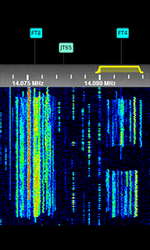 |
|
| FT8 | FT8 is an extremely-weak-signal amateur radio mode that transmits very limited communications. JS8, a variant of FT8, can send full conversations and relay messages | 1.84 MHzMegaHertz (MHz) 10^6 Hz — 144.174 MHzMegaHertz (MHz) 10^6 Hz | USBUpper Side Band Modulation (Radio, referring to reception and modulation mode)Universal Serial Bus (Computer, referring to USB Ports and cables) | 8-FSKFrequency-Shift Keying | 50 HzHertz (Hz), unit of frequency, defined as one cycle per second (1 Hz). | Worldwide | 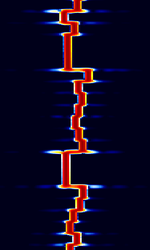 |
|
| FUNcube-1 Telemetry | FUNcube-1 Telemetry is a telemetry signal sent from the Funcube-1 Cubesat amateur radio satellite. | 145.935 MHzMegaHertz (MHz) 10^6 Hz | USBUpper Side Band Modulation (Radio, referring to reception and modulation mode)Universal Serial Bus (Computer, referring to USB Ports and cables) | PSKPhase-Shift Keying | 2 kHzKiloHertz (kHz) 10^3 Hz | Worldwide | 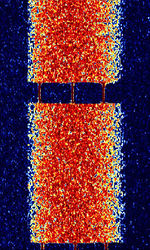 |
|
| Federal Signal Modem-MSK | Signalling protocol developed for Federal Signal's various warning and mass notification appliances. This signal is used for activation and telemetry of all units in a network. | 150 MHzMegaHertz (MHz) 10^6 Hz — 160 MHzMegaHertz (MHz) 10^6 Hz | NFMNarrowband Frequency Modulation | MSKMinimum-Shift Keying (When Shift/Bd = 0.5. It is impossible to get this ratio to be lower than 0.5, hence it is called the 'Minimum' shift.) | 6 kHzKiloHertz (kHz) 10^3 Hz | United States |  |
|
| FreeDV COHPSK | FreeDV Coherent PSKPhase-Shift Keying (Also known as FreeDV 700) is a robust Digital Voice mode developed by David Rowe for his FreeDV Digital Voice Software. | 3 MHzMegaHertz (MHz) 10^6 Hz — 30 MHzMegaHertz (MHz) 10^6 Hz | USBUpper Side Band Modulation (Radio, referring to reception and modulation mode)Universal Serial Bus (Computer, referring to USB Ports and cables) | PSKPhase-Shift Keying, QPSKQuadrature Phase-Shift Keying (2 bits per symbol), DQPSKDifferential Quadrature Phase-Shift Keying, OFDMOrthogonal Frequency-Division Multiplexing | 1.5 kHzKiloHertz (kHz) 10^3 Hz | Worldwide | 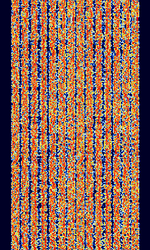 |
|
| GK-2A LRIT ( Low-Rate Image Transmission ) | LRIT (Low-Rate Image Transmission) is used to transmit images on the GK-2A satellite | 1,692.1 MHzMegaHertz (MHz) 10^6 Hz | RAW | BPSKBinary Phase-Shift Keying (1 bit per symbol) | 170 kHzKiloHertz (kHz) 10^3 Hz | Asia-Pacific | 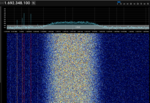 |
|
| GM2100 (R&S) | This is the proprietary HFHigh Frequency (3-30 MHz) Data Signal Protocol for the Rohde & Schwarz HFHigh Frequency (3-30 MHz) Modem GM2100. | 3 MHzMegaHertz (MHz) 10^6 Hz — 30 MHzMegaHertz (MHz) 10^6 Hz | USBUpper Side Band Modulation (Radio, referring to reception and modulation mode)Universal Serial Bus (Computer, referring to USB Ports and cables) | PSKPhase-Shift Keying | 3 kHzKiloHertz (kHz) 10^3 Hz | Europe | 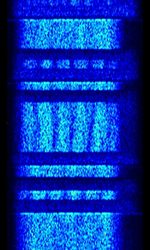 |
|
| GMDSS Digital Selective Calling | Global Maritime Distress and Safety System's Digital Selective Calling (GMDSS-DSC) is a maritime communication protocol intended to initiate ship-to-ship, ship-to-shore and shore-to-ship radiotelephone and MFMedium Frequency (300-3000 kHz)/HFHigh Frequency (3-30 MHz) radiotelex calls. | 2.177 MHzMegaHertz (MHz) 10^6 Hz — 156.525 MHzMegaHertz (MHz) 10^6 Hz | USBUpper Side Band Modulation (Radio, referring to reception and modulation mode)Universal Serial Bus (Computer, referring to USB Ports and cables) | FSKFrequency-Shift Keying | 350 HzHertz (Hz), unit of frequency, defined as one cycle per second (1 Hz). | Worldwide | 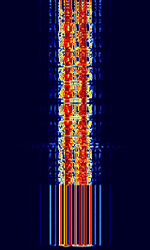 |
|
| GOES CDA Telemetry | Telemetry signal sent from GOES 16, 17 and 18. GOES is a family of Geostationary Operational Environmental Satellite operated by the United States National Oceanic and Atmospheric Administration (NOAA). | 1,693 MHzMegaHertz (MHz) 10^6 Hz | RAW | BPSKBinary Phase-Shift Keying (1 bit per symbol) | 80 kHzKiloHertz (kHz) 10^3 Hz | United States, Asia | — | 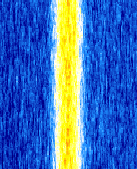 |
| GOES Data Collection System (DCS) | Comes from the geostationary satellites GOES 16 and GOES 17. Relays information about water levels, lightning strikes, and other information. | 1,679.9 MHzMegaHertz (MHz) 10^6 Hz — 1,680.2 MHzMegaHertz (MHz) 10^6 Hz | RAW | 8PSK8-Phase Phase-Shift Keying (3 bits per symbol) | 300 HzHertz (Hz), unit of frequency, defined as one cycle per second (1 Hz). — 1.2 kHzKiloHertz (kHz) 10^3 Hz | Worldwide | 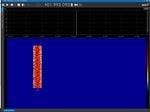 |
|
| GOES High Rate Information Transmission (HRIT) | GOES HRIT is a retransmission of satellite imagery and other information from the GOES-R series of satellites. | 1,694.1 MHzMegaHertz (MHz) 10^6 Hz | RAW | BPSKBinary Phase-Shift Keying (1 bit per symbol) | 1.205 MHzMegaHertz (MHz) 10^6 Hz | Worldwide | — | 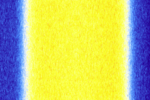 |
| GOES Rebroadcast (GRB) | GOES Rebroadcast (GRB) is a form of data sent from the GOES-R series of satellites that contain information from all of the instruments on board the GOES satellites | 1,681.6 MHzMegaHertz (MHz) 10^6 Hz — 1,686.6 MHzMegaHertz (MHz) 10^6 Hz | DVB-S2, RAW | QPSK16, 8PSK8-Phase Phase-Shift Keying (3 bits per symbol) | 10 MHzMegaHertz (MHz) 10^6 Hz | Worldwide |  |
|
| GRAVES | The Grand Réseau Adapté à la Veille Spatiale (GRAVES) system is a French space-surveillance system for low-orbit (up to 1000km) satellites. Emitter is based near Dijon, France. | 143.05 MHzMegaHertz (MHz) 10^6 Hz | RAW I/Q | 1 kHzKiloHertz (kHz) 10^3 Hz | France | 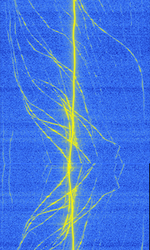 |
||
| Glenayre Paging Link | Glenayre's Paging Link. With QAMQuadrature Amplitude Modulation being used, It is a way to upkeep a linked paging transmitter when no data is broadcast. Glenayre C2100/C2000 model control systems were likely to use this. | 152 MHzMegaHertz (MHz) 10^6 Hz — 512 MHzMegaHertz (MHz) 10^6 Hz | NFMNarrowband Frequency Modulation | QAMQuadrature Amplitude Modulation | United States | 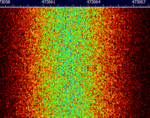 |
||
| Gonets | Gonets (Russian Гонец, for Messenger) is a Russian civilian low Earth orbit communications satellite system. | 265 HzHertz (Hz), unit of frequency, defined as one cycle per second (1 Hz). — 388 MHzMegaHertz (MHz) 10^6 Hz | NFMNarrowband Frequency Modulation | GMSKGaussian Minimum-Shift Keying | 20 kHzKiloHertz (kHz) 10^3 Hz | Worldwide | 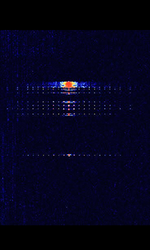 |
|
| Graw DFM-17 (Radiosonde) | Radiosonde developed by Graw/Noris Group GmbH for upper air weather observation | 400 MHzMegaHertz (MHz) 10^6 Hz — 405.99 MHzMegaHertz (MHz) 10^6 Hz | NFMNarrowband Frequency Modulation | GFSKGaussian Frequency-Shift Keying | 10 kHzKiloHertz (kHz) 10^3 Hz | Worldwide | 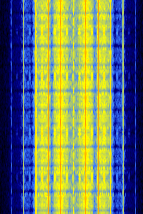 |
|
| Grimeton Radio (SAQ) | SAQ stands as the sole transmitter reliant on an alternating current generator. Recognized as a UNESCO World Heritage site, it employs the last operational Alexanderson alternator for RFRadio Frequency production. | 17.2 kHzKiloHertz (kHz) 10^3 Hz | CWContinuous Wave | Sweden | 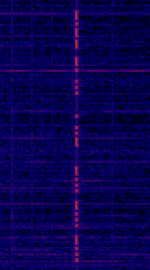 |
|||
| Ground-Based Augmentation System (GBAS) | GBAS is an advanced aircraft navigation system that provides GPS corrections to aircraft on approach. | 108 MHzMegaHertz (MHz) 10^6 Hz — 117.975 MHzMegaHertz (MHz) 10^6 Hz | AMAmplitude Modulation | D8PSK | 15 kHzKiloHertz (kHz) 10^3 Hz | Worldwide | 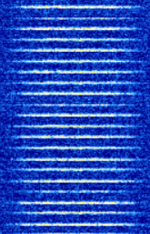 |
|
| HC-265 Voice Scrambler | HC-265 is a Voice Scrambling mode developed by Hagelin Crypto for their HC-265 CRYPTOCOM secure voice unit. | 3 MHzMegaHertz (MHz) 10^6 Hz — 30 MHzMegaHertz (MHz) 10^6 Hz | USBUpper Side Band Modulation (Radio, referring to reception and modulation mode)Universal Serial Bus (Computer, referring to USB Ports and cables) | FSKFrequency-Shift Keying | 2.25 kHzKiloHertz (kHz) 10^3 Hz — 3 kHzKiloHertz (kHz) 10^3 Hz | Worldwide | 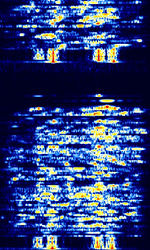 |
|
| HD Radio (AM) | HD Radio is a proprietary digital broadcast radio format transmitted in North America, usually as sidebands on analog carriers. This is the AMAmplitude Modulation band implementation of HD Radio. | 535 kHzKiloHertz (kHz) 10^3 Hz — 1.7 MHzMegaHertz (MHz) 10^6 Hz | RAW | OFDMOrthogonal Frequency-Division Multiplexing | 30 kHzKiloHertz (kHz) 10^3 Hz | United States | 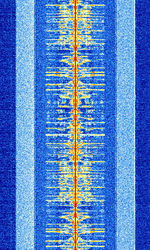 |
|
| HD Radio (FM) | HD Radio is a proprietary digital broadcast radio format transmitted in North America, usually as sidebands on analog carriers. This is the FMFrequency Modulation band implementation of HD Radio. | 87.7 MHzMegaHertz (MHz) 10^6 Hz — 107.9 MHzMegaHertz (MHz) 10^6 Hz | RAW | OFDMOrthogonal Frequency-Division Multiplexing | 400 kHzKiloHertz (kHz) 10^3 Hz | United States | 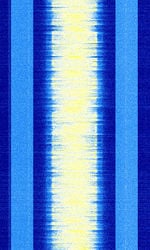 |
|
| HF trading link '120 Hz FMCW idle tone' | A HFHigh Frequency (3-30 MHz) trading link in idle state which strongly resembles an FMCW radar with 120 HzHertz (Hz), unit of frequency, defined as one cycle per second (1 Hz). sweep rate. Has been observed to transmit CWContinuous Wave ID once per hour. | 19.31 MHzMegaHertz (MHz) 10^6 Hz — 20.548 MHzMegaHertz (MHz) 10^6 Hz | USBUpper Side Band Modulation (Radio, referring to reception and modulation mode)Universal Serial Bus (Computer, referring to USB Ports and cables) | OFDMOrthogonal Frequency-Division Multiplexing | 9 kHzKiloHertz (kHz) 10^3 Hz — 10 kHzKiloHertz (kHz) 10^3 Hz | Canada / Worldwide | 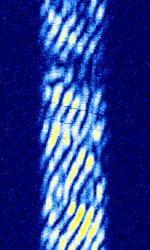 |
|
| HFGCS (High Frequency Global Communications System) | HFGCS is a series of networks deployed by the United States Air Force to send encoded messages to deployed aircraft. This network is well known for it's coded EAM's (Emergency Action Messages) used for coordinating United States Strategic Nuclear Forces. | 4.724 MHzMegaHertz (MHz) 10^6 Hz — 15.016 MHzMegaHertz (MHz) 10^6 Hz | USBUpper Side Band Modulation (Radio, referring to reception and modulation mode)Universal Serial Bus (Computer, referring to USB Ports and cables) | USBUpper Side Band Modulation (Radio, referring to reception and modulation mode)Universal Serial Bus (Computer, referring to USB Ports and cables) | 2.95 kHzKiloHertz (kHz) 10^3 Hz | Worldwide | 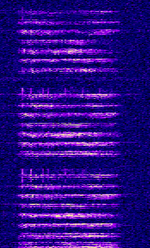 |
|
| HORYU-4 Telemetry | Telemetry signal sent from the HORYU-4 university-class satellite Launched by Kyushu Institute of Technology in Japan | 437.375 MHzMegaHertz (MHz) 10^6 Hz | USBUpper Side Band Modulation (Radio, referring to reception and modulation mode)Universal Serial Bus (Computer, referring to USB Ports and cables) | BPSKBinary Phase-Shift Keying (1 bit per symbol) | Worldwide | 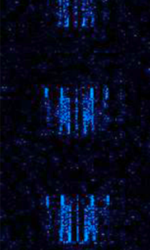 |
||
| Hellschreiber | Hellschreiber (Also known as Feld Hell or just Hell) is a teleprinter system developed in the late 1920's by Rudolf Hell, a German inventor. | 3 MHzMegaHertz (MHz) 10^6 Hz — 30 MHzMegaHertz (MHz) 10^6 Hz | USBUpper Side Band Modulation (Radio, referring to reception and modulation mode)Universal Serial Bus (Computer, referring to USB Ports and cables) | OOKOn-Off Keying Modulation, FSKFrequency-Shift Keying, MSKMinimum-Shift Keying (When Shift/Bd = 0.5. It is impossible to get this ratio to be lower than 0.5, hence it is called the 'Minimum' shift.) | 350 HzHertz (Hz), unit of frequency, defined as one cycle per second (1 Hz). — 800 HzHertz (Hz), unit of frequency, defined as one cycle per second (1 Hz). | Worldwide | 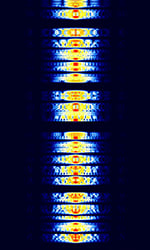 |
|
| High Frequency Active Auroral Research Program (HAARP) | HAARP is a ionospheric research program conducted in Gakona, Alaska. | 2.7 MHzMegaHertz (MHz) 10^6 Hz — 10 MHzMegaHertz (MHz) 10^6 Hz | AMAmplitude Modulation, CWContinuous Wave | CWContinuous Wave, FMCW | 100 kHzKiloHertz (kHz) 10^3 Hz | United States | 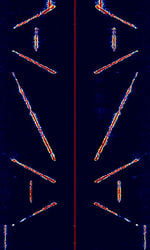 |
|
| High Frequency Data Link (HFDL) | HFDL, also known as HFHigh Frequency (3-30 MHz)-ACARS, ARINC 753, ARINC 635, and HFHigh Frequency (3-30 MHz) DATALINK,is a data link that aircraft use to communicate short messages over long distances using HFHigh Frequency (3-30 MHz) signals. | 2.9 MHzMegaHertz (MHz) 10^6 Hz — 22 MHzMegaHertz (MHz) 10^6 Hz | USBUpper Side Band Modulation (Radio, referring to reception and modulation mode)Universal Serial Bus (Computer, referring to USB Ports and cables) | PSKPhase-Shift Keying | 2.4 kHzKiloHertz (kHz) 10^3 Hz | Worldwide | 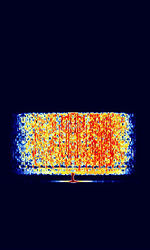 |
|
| High Frequency Data and Voice Link (HFDVL) | HFDVL (or HFD+VL) is an experimental mode developed by research groups from The University of Las Palmas de Gran Canaria and The Polytechnic University of Madrid. This mode is intended for military use in accordance with STANAGNATO Standardization Agreement (STANAG), defines processes, procedures, terms, and conditions for common military or technical procedures or equipment between the member countries of the North Atlantic Treaty Organization (NATO). 5066 parameters. | 14.35 MHzMegaHertz (MHz) 10^6 Hz — 14.829 MHzMegaHertz (MHz) 10^6 Hz | USBUpper Side Band Modulation (Radio, referring to reception and modulation mode)Universal Serial Bus (Computer, referring to USB Ports and cables) | PSKPhase-Shift Keying, OFDMOrthogonal Frequency-Division Multiplexing, QAMQuadrature Amplitude Modulation | 3 kHzKiloHertz (kHz) 10^3 Hz | Spain | 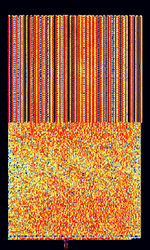 |
|
| High Resolution Data (HRD) | The HRD direct broadcast is an X-band continuous downlink from NOAA JPSS satellites of mission environmental data to users on the ground that are equipped with a suitable receiver. | 7,812 MHzMegaHertz (MHz) 10^6 Hz | RAW | OQPSK, QPSKQuadrature Phase-Shift Keying (2 bits per symbol) | 25 MHzMegaHertz (MHz) 10^6 Hz — 35 MHzMegaHertz (MHz) 10^6 Hz | Worldwide | — |  |
| Hoffman Broadfield Signpost AVM System | Proprietary FFSKFast Frequency-Shift Keying data network used for public transport telemetry. It is primarily used to track and control vehicles, and facilitates PTTPush To TalkPress to TransmitMinistries of Postal, Telephone, and Telegraph Service (Soviet Agency)-ID for communication with tram drivers. | 507.225 MHzMegaHertz (MHz) 10^6 Hz — 517.875 MHzMegaHertz (MHz) 10^6 Hz | NFMNarrowband Frequency Modulation | FFSKFast Frequency-Shift Keying | 7.5 kHzKiloHertz (kHz) 10^3 Hz | Australia | 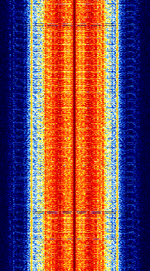 |
|
| Horus Binary 4FSK - v2 | An efficient RTTYRadio TeleTYpe-like 4FSK4-Level Frequency Shift Keying mode that transmits binary data, used for amateur high altitude balloon telemetry. Developed by the Project Horus group. | 431 MHzMegaHertz (MHz) 10^6 Hz — 434 MHzMegaHertz (MHz) 10^6 Hz | USBUpper Side Band Modulation (Radio, referring to reception and modulation mode)Universal Serial Bus (Computer, referring to USB Ports and cables) | 4FSK4-Level Frequency Shift Keying | 1 kHzKiloHertz (kHz) 10^3 Hz | Worldwide | 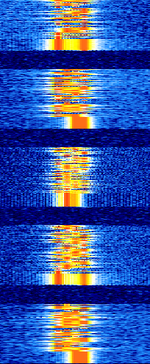 |
|
| Hyundai Mobis RKE-4F16 Key Fob | Hyundai Mobis RKE-4F16 Wireless Key Fob for Hyundai Sonata models 2014-Present. | 433.92 MHzMegaHertz (MHz) 10^6 Hz | WFMWideband Frequency Modulation | FSKFrequency-Shift Keying | 110 kHzKiloHertz (kHz) 10^3 Hz | Worldwide | 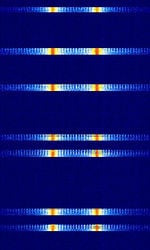 |
|
| ICAO Selcal | ICAO Selcal (also known as AVCALL, ANNEX 10, or just SELCAL) is a HFHigh Frequency (3-30 MHz)/VHFVery High Frequency (30-300 MHz) aviation selective calling system used by ground stations to initiate radio communications with aircraft. | 3 MHzMegaHertz (MHz) 10^6 Hz — 300 MHzMegaHertz (MHz) 10^6 Hz | USBUpper Side Band Modulation (Radio, referring to reception and modulation mode)Universal Serial Bus (Computer, referring to USB Ports and cables) | MFSKMultiple Frequency Shift-Keying | 1.5 kHzKiloHertz (kHz) 10^3 Hz | Worldwide | 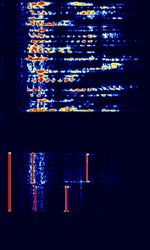 |
|
| ICARUS (International Cooperation for Animal Research Using Space) | ICARUS aims its services primarily at scientific groups that perform basic and application-oriented research with migrating animals. | 468.1 MHzMegaHertz (MHz) 10^6 Hz | NFMNarrowband Frequency Modulation | PSKPhase-Shift Keying | 32 kHzKiloHertz (kHz) 10^3 Hz | Worldwide | 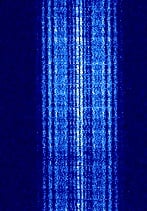 |
|
| ICV | ICV is a NATONorth Atlantic Treaty Organization-operated VLFVery Low Frequency (3-30 kHz) transmitted located in the island of Tavolara, Sardinia, Italy. | 20.27 kHzKiloHertz (kHz) 10^3 Hz — 20.76 kHzKiloHertz (kHz) 10^3 Hz | CWContinuous Wave | MSKMinimum-Shift Keying (When Shift/Bd = 0.5. It is impossible to get this ratio to be lower than 0.5, hence it is called the 'Minimum' shift.) | Italy | 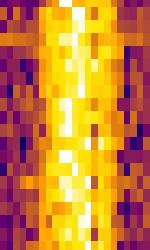 |
||
| ILS Marker Beacon | ILS Marker Beacons are used by aircraft for Instrument Landing Systems, transmitted by an upward-facing directive antenna at known distances along the approach path. | 75 MHzMegaHertz (MHz) 10^6 Hz | AMAmplitude Modulation | OOKOn-Off Keying Modulation | 3 kHzKiloHertz (kHz) 10^3 Hz | Worldwide | 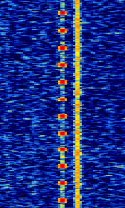 |
|
| Industrial key opener | key opener commonly used in industrial applications | 434 MHzMegaHertz (MHz) 10^6 Hz | AMAmplitude Modulation | 793 kHzKiloHertz (kHz) 10^3 Hz | Worldwide |  |
||
| Inmarsat Aero | Inmarsat Aero is the protocol that's used to link ground stations with aircraft via Inmarsat's satellite link. This protocol carries digital voice, fax and low speed data such as ACARS and ADS-C. | 1,545 MHzMegaHertz (MHz) 10^6 Hz — 3,687 MHzMegaHertz (MHz) 10^6 Hz | USBUpper Side Band Modulation (Radio, referring to reception and modulation mode)Universal Serial Bus (Computer, referring to USB Ports and cables) | PSKPhase-Shift Keying | 800 HzHertz (Hz), unit of frequency, defined as one cycle per second (1 Hz). — 10.5 MHzMegaHertz (MHz) 10^6 Hz | Worldwide | 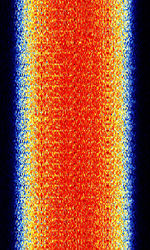 |
|
| Inmarsat-C TDM | Inmarsat C provides two-way data and messaging communication services to and from virtually anywhere in the world. The low-cost terminals and antennas are small enough to be fitted to any size of ship. | 1,537.7 MHzMegaHertz (MHz) 10^6 Hz — 1,539.685 MHzMegaHertz (MHz) 10^6 Hz | USBUpper Side Band Modulation (Radio, referring to reception and modulation mode)Universal Serial Bus (Computer, referring to USB Ports and cables) | PSKPhase-Shift Keying | 2.5 kHzKiloHertz (kHz) 10^3 Hz | Worldwide | 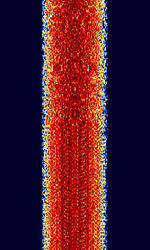 |
|
| Inmarsat-D(D+) Downlink | Inmarsat D+ (and it's predecessor, Inmarsat D) was Inmarsat's satellite paging system. The main use of the technology was in tracking trucks and buoys and SCADA applications. | 1,525 MHzMegaHertz (MHz) 10^6 Hz — 1,559 MHzMegaHertz (MHz) 10^6 Hz | USBUpper Side Band Modulation (Radio, referring to reception and modulation mode)Universal Serial Bus (Computer, referring to USB Ports and cables) | MFSKMultiple Frequency Shift-Keying | 640 HzHertz (Hz), unit of frequency, defined as one cycle per second (1 Hz). | Worldwide | 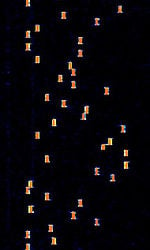 |
|
| Instrument Landing System | Radio navigation system that allows aircraft to perform precision approaches in low visibility conditions. | 108 MHzMegaHertz (MHz) 10^6 Hz — 335 MHzMegaHertz (MHz) 10^6 Hz | AMAmplitude Modulation | 15 kHzKiloHertz (kHz) 10^3 Hz | Worldwide | 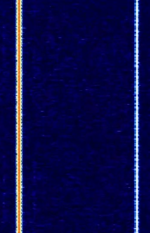 |
||
| Integrated Services Digital Broadcasting—Terrestrial (ISDB-T) | ISDB-T (Integrated Services Digital Broadcasting – Terrestrial) is a new type of digital broadcasting system for providing audio, video and multimedia services. ISDB-T system was standardized at the Association of Radio Industries and Businesses (ARIB) in Japan. ISDB-T uses a modulation method referred to as Band Segmented Transmission (BST) OFDMOrthogonal Frequency-Division Multiplexing. | 470 MHzMegaHertz (MHz) 10^6 Hz — 770 MHzMegaHertz (MHz) 10^6 Hz | RAW | QPSKQuadrature Phase-Shift Keying (2 bits per symbol), 64QAM | 6 MHzMegaHertz (MHz) 10^6 Hz | Japan, Philippines, Argentina, Ecuador, Brazil | — |  |
| Interferance signal from old computer screen | A very crunchy signal coming from my Old hyundai computer screen, the sound changes depending on what is shown on the screen | 639.006 MHzMegaHertz (MHz) 10^6 Hz | AMAmplitude Modulation, DSBDual Side Band Modulation | 23 kHzKiloHertz (kHz) 10^3 Hz | WORLDWIDE | 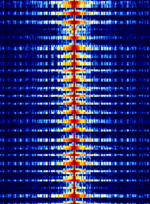 |
||
| Interoperable Electronic Train Management System (I-ETMS) | Transmits train telemetry | 219 MHzMegaHertz (MHz) 10^6 Hz — 222 MHzMegaHertz (MHz) 10^6 Hz | NFMNarrowband Frequency Modulation | GMSKGaussian Minimum-Shift Keying | 2 kHzKiloHertz (kHz) 10^3 Hz | US | 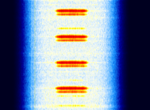 |
|
| Ionized Meteor Trails | Meteors traversing the E region of the atmosphere approximately 60 - 90 miles up create ionizing trails which can reflect and refract radio waves from commercial FMFrequency Modulation radio stations that are hundreds and sometimes thousands of miles away from the receiver. | 88.3 MHzMegaHertz (MHz) 10^6 Hz | CWContinuous Wave | CWContinuous Wave | 1 kHzKiloHertz (kHz) 10^3 Hz | Worldwide | 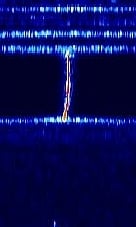 |
|
| Ionosonde | An Ionosonde (Also known as a chirpsounder or ionospheric sounder) is a radar that examines the Ionosphere and monitors HFHigh Frequency (3-30 MHz) propagation conditions by sweeping the HFHigh Frequency (3-30 MHz) band and receiving the echoes. | 1 MHzMegaHertz (MHz) 10^6 Hz — 40 MHzMegaHertz (MHz) 10^6 Hz | USBUpper Side Band Modulation (Radio, referring to reception and modulation mode)Universal Serial Bus (Computer, referring to USB Ports and cables) | FMCW | 1 HzHertz (Hz), unit of frequency, defined as one cycle per second (1 Hz). | Worldwide | 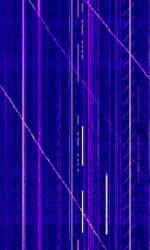 |
|
| Iranian Navy QPSK Modem | Iranian Navy QPSKQuadrature Phase-Shift Keying (2 bits per symbol) Modem is a QPSKQuadrature Phase-Shift Keying (2 bits per symbol) mode used by the Iranian Navy. It has gone through several versions. The current version (2015) is V2 and supports speeds of 468 BdBaud (unit symbol Bd) is the unit for symbol rate or modulation rate in symbols per second., 936 BdBaud (unit symbol Bd) is the unit for symbol rate or modulation rate in symbols per second., and 1872 BdBaud (unit symbol Bd) is the unit for symbol rate or modulation rate in symbols per second.. | 8.046 MHzMegaHertz (MHz) 10^6 Hz — 17.382 MHzMegaHertz (MHz) 10^6 Hz | USBUpper Side Band Modulation (Radio, referring to reception and modulation mode)Universal Serial Bus (Computer, referring to USB Ports and cables) | PSKPhase-Shift Keying | 300 HzHertz (Hz), unit of frequency, defined as one cycle per second (1 Hz). — 2.85 kHzKiloHertz (kHz) 10^3 Hz | Iran | 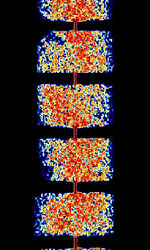 |
|
| Iridium | This is the L-band uplink/downlink for the Low Earth Orbit Iridium Satellite Constellation. This system is used for satellite based phone calls. | 1,616 MHzMegaHertz (MHz) 10^6 Hz — 1,626.5 MHzMegaHertz (MHz) 10^6 Hz | RAW | PSKPhase-Shift Keying | 31.5 kHzKiloHertz (kHz) 10^3 Hz | Worldwide | 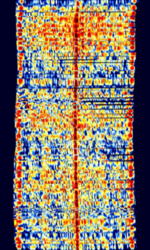 |
|
| Israeli Navy Hybrid Modem (188-110 MOD) | The Israeli Naval Hybrid Modem is based on the MIL-STD-188-110 Serial Standard. Has characteristic preamble with 4/6 Tone and 18 QPSKQuadrature Phase-Shift Keying (2 bits per symbol) parallel mode before 110 Serial transmission. Possible use as a broadcast transmitter for ships. Used by the Israeli Navy 4XZ station from Haifa. | 3 MHzMegaHertz (MHz) 10^6 Hz — 30 MHzMegaHertz (MHz) 10^6 Hz | USBUpper Side Band Modulation (Radio, referring to reception and modulation mode)Universal Serial Bus (Computer, referring to USB Ports and cables) | PSKPhase-Shift Keying | 2.75 kHzKiloHertz (kHz) 10^3 Hz | Israel | 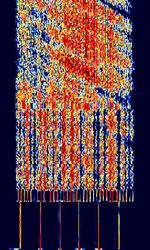 |
|
| JJY | JJY, also known as JJY-40 and JJY-60, is the call sign for a pair of longwave Time Signal stations in Japan. | 40 kHzKiloHertz (kHz) 10^3 Hz — 60 kHzKiloHertz (kHz) 10^3 Hz | USBUpper Side Band Modulation (Radio, referring to reception and modulation mode)Universal Serial Bus (Computer, referring to USB Ports and cables) | AMAmplitude Modulation | 1 HzHertz (Hz), unit of frequency, defined as one cycle per second (1 Hz). | Japan | 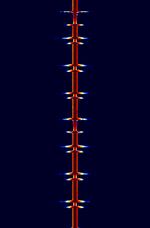 |
|
| JS8 | JS8Call is an extremely-weak-signal amateur radio communication mode based on FT8. It allows FT8 to be used for conversations and message relaying. | 1.842 MHzMegaHertz (MHz) 10^6 Hz — 50.318 MHzMegaHertz (MHz) 10^6 Hz | USBUpper Side Band Modulation (Radio, referring to reception and modulation mode)Universal Serial Bus (Computer, referring to USB Ports and cables) | GFSKGaussian Frequency-Shift Keying | 50 HzHertz (Hz), unit of frequency, defined as one cycle per second (1 Hz). | Worldwide | 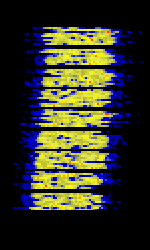 |
|
| JT65 | JT65 is an amateur radio QSO communication protocol developed by Joe Taylor, K1JT. JT65 has 3 submodes: JT65A, JT65B, and JT65C. The most popular submode of JT65 is JT65A. JT65 gets '65' from the 65 tones it uses. | 1.838 MHzMegaHertz (MHz) 10^6 Hz — 50.276 MHzMegaHertz (MHz) 10^6 Hz | USBUpper Side Band Modulation (Radio, referring to reception and modulation mode)Universal Serial Bus (Computer, referring to USB Ports and cables) | MFSKMultiple Frequency Shift-Keying | 180 HzHertz (Hz), unit of frequency, defined as one cycle per second (1 Hz). — 710 HzHertz (Hz), unit of frequency, defined as one cycle per second (1 Hz). | Worldwide | 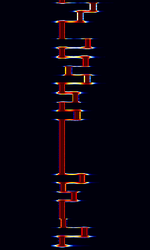 |
|
| Japanese Slot Machine (XSL) | The Japanese Slot Machine (Enigma Designation XSL) is a simplex system used by the Japanese Maritime Self-Defense Force in Ichihara, Japan. | 4.153 MHzMegaHertz (MHz) 10^6 Hz — 8.703 MHzMegaHertz (MHz) 10^6 Hz | USBUpper Side Band Modulation (Radio, referring to reception and modulation mode)Universal Serial Bus (Computer, referring to USB Ports and cables) | PSKPhase-Shift Keying | 2 kHzKiloHertz (kHz) 10^3 Hz | Japan | 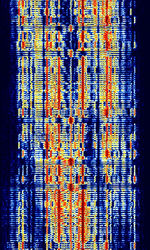 |
|
| Jim Creek (NLK) | Jim Creek Naval Radio Station is used by the US Navy to transmit commands to distant submarines. | 24.8 kHzKiloHertz (kHz) 10^3 Hz | CWContinuous Wave | MSKMinimum-Shift Keying (When Shift/Bd = 0.5. It is impossible to get this ratio to be lower than 0.5, hence it is called the 'Minimum' shift.) | 300 HzHertz (Hz), unit of frequency, defined as one cycle per second (1 Hz). | United States | 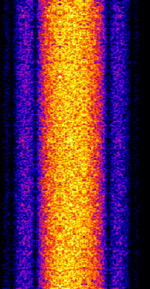 |
|
| Jindalee Operational Radar Network (JORN) | JORN is an Australian OTHR system that operates uniquely in that it's radar bursts include an intro tone before the burst. | 5.7 MHzMegaHertz (MHz) 10^6 Hz — 33 MHzMegaHertz (MHz) 10^6 Hz | USBUpper Side Band Modulation (Radio, referring to reception and modulation mode)Universal Serial Bus (Computer, referring to USB Ports and cables) | FMCW | 3 kHzKiloHertz (kHz) 10^3 Hz — 60 kHzKiloHertz (kHz) 10^3 Hz | Australia | 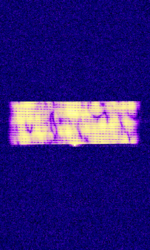 |
|
| John Deere RTK Radio 450 | Real-time Kinematic GPS is a satellite navigation technique used to enhance the precision of position data derived from satellite-based positioning systems (global navigation satellite systems, GNSS) such as GPS, BeiDou, GLONASS, Galileo and NavIC. | 435 MHzMegaHertz (MHz) 10^6 Hz — 470 MHzMegaHertz (MHz) 10^6 Hz | FMFrequency Modulation | FSKFrequency-Shift Keying | 7.49 kHzKiloHertz (kHz) 10^3 Hz | Worldwide | 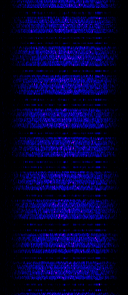 |
|
| KG-STV | KG-STV is an image transmission mode developed by JJ0OBZ in Japan. | 3.733 MHzMegaHertz (MHz) 10^6 Hz — 10,489.625 MHzMegaHertz (MHz) 10^6 Hz | USBUpper Side Band Modulation (Radio, referring to reception and modulation mode)Universal Serial Bus (Computer, referring to USB Ports and cables) | 4FSK4-Level Frequency Shift Keying, MSKMinimum-Shift Keying (When Shift/Bd = 0.5. It is impossible to get this ratio to be lower than 0.5, hence it is called the 'Minimum' shift.) | 500 HzHertz (Hz), unit of frequency, defined as one cycle per second (1 Hz). — 2.5 kHzKiloHertz (kHz) 10^3 Hz | Worldwide | 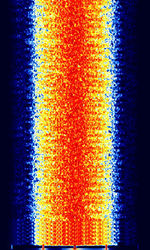 |
|
| Kenwood FleetSync | FleetSync is a manufacturer specific signaling standard which includes a number of features: unit ID, status, emergency button, inhibit, status check, GPS, and selective calling. | 150 MHzMegaHertz (MHz) 10^6 Hz — 850 MHzMegaHertz (MHz) 10^6 Hz | FSKFrequency-Shift Keying | 25 kHzKiloHertz (kHz) 10^3 Hz | Worldwide | — | 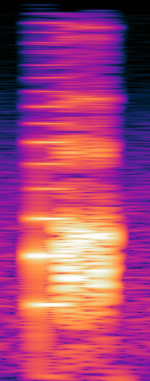 |
|
| Kia SVI-JFRGE04 Key Fob | Kia SVI-JFRGE04 Keyless entry transponder used for multiple Kia models, for model years 2014-2020 | NFMNarrowband Frequency Modulation | FSKFrequency-Shift Keying | 55 kHzKiloHertz (kHz) 10^3 Hz | Worldwide | 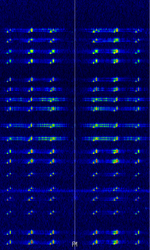 |
||
| LEOSAR Downlink | Cospas-Sarsat downlink from polar-orbiting weather satellites. The International Cospas-Sarsat Programme is a satellite-aided search and rescue initiative. | 1,544.5 MHzMegaHertz (MHz) 10^6 Hz | NFMNarrowband Frequency Modulation | PSKPhase-Shift Keying | 350 kHzKiloHertz (kHz) 10^3 Hz | Worldwide | 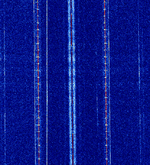 |
|
| LORAN | LORAN (short for LOng RAnge Navigation) is a hyperbolic radio navigation system. | 90 kHzKiloHertz (kHz) 10^3 Hz — 110 kHzKiloHertz (kHz) 10^3 Hz | USBUpper Side Band Modulation (Radio, referring to reception and modulation mode)Universal Serial Bus (Computer, referring to USB Ports and cables) | PPMPulse Position Modulation | 20 kHzKiloHertz (kHz) 10^3 Hz | Worldwide | 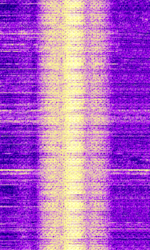 |
|
| LTE420 MCX | Band 88 FDD | 423.7 MHzMegaHertz (MHz) 10^6 Hz | AMAmplitude Modulation | 16-QAMQuadrature Amplitude Modulation, OFDMOrthogonal Frequency-Division Multiplexing | 1.08 MHzMegaHertz (MHz) 10^6 Hz | Poland | 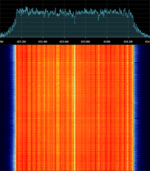 |
|
| Lightning Sferics | VLFVery Low Frequency (3-30 kHz) RFRadio Frequency emissions from lightning in the atmosphere that can affect up to HFHigh Frequency (3-30 MHz) frequencies and beyond depending on strength. Has a popping crackle sound with both USBUpper Side Band Modulation (Radio, referring to reception and modulation mode)Universal Serial Bus (Computer, referring to USB Ports and cables) and AMAmplitude Modulation modes of reception. | 0 HzHertz (Hz), unit of frequency, defined as one cycle per second (1 Hz). — 30 MHzMegaHertz (MHz) 10^6 Hz | Worldwide | 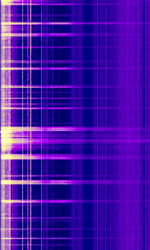 |
||||
| Link-11 | Link-11 (Also known as ALLIGATOR, STANAGNATO Standardization Agreement (STANAG), defines processes, procedures, terms, and conditions for common military or technical procedures or equipment between the member countries of the North Atlantic Treaty Organization (NATO). 5511, TADIL-A, MIL-STD-6011, and MIL-STD-188-203-1A) is a Tactical Data Link standard (formerly known as Tactical Digital Information Link (TADIL) used by NATONorth Atlantic Treaty Organization and the US Military for Maritime Tactical Data Exchange. | 2 MHzMegaHertz (MHz) 10^6 Hz — 30 MHzMegaHertz (MHz) 10^6 Hz | USBUpper Side Band Modulation (Radio, referring to reception and modulation mode)Universal Serial Bus (Computer, referring to USB Ports and cables) | PSKPhase-Shift Keying | 2.5 kHzKiloHertz (kHz) 10^3 Hz — 6 kHzKiloHertz (kHz) 10^3 Hz | Worldwide | 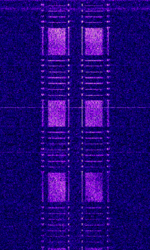 |
|
| Link-11 (UHF) | This is the UHFUltra High Frequency (300-3000 MHz) band variant of Link-11, which is transmitted on a FMFrequency Modulation carrier. The FMFrequency Modulation-demodulated baseband is identical to the HFHigh Frequency (3-30 MHz) Link-11 waveform. | 225 MHzMegaHertz (MHz) 10^6 Hz — 399.975 MHzMegaHertz (MHz) 10^6 Hz | NFMNarrowband Frequency Modulation | PSKPhase-Shift Keying | 30 kHzKiloHertz (kHz) 10^3 Hz | Worldwide | 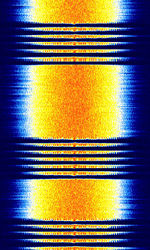 |
|
| LoJack | LoJack is a vehicle tracking system that allows vehicles to be tracked by police, with the aim of recovering them in case of theft via a small radio transceiver clandestinely installed in a vehicle. | 173.075 MHzMegaHertz (MHz) 10^6 Hz | NFMNarrowband Frequency Modulation | FFSKFast Frequency-Shift Keying | 10 kHzKiloHertz (kHz) 10^3 Hz | Worldwide | 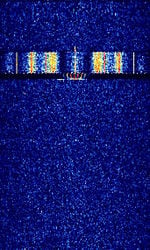 |
|
| LoRa | LoRa (Long Range) is a proprietary low-power wide-area network modulation technique. | 433 MHzMegaHertz (MHz) 10^6 Hz — 915 MHzMegaHertz (MHz) 10^6 Hz | FMFrequency Modulation | CSS | 250 kHzKiloHertz (kHz) 10^3 Hz | Worldwide | 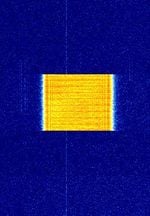 |
|
| Lockheed Martin LMS-6 (Radiosonde) | The LMS-6 is a radiosonde developed by Lockheed Martin which contains a temperature, barometric pressure (On the 1680 MHzMegaHertz (MHz) 10^6 Hz models only), and humidity sensor for upper air weather observations. | 400 MHzMegaHertz (MHz) 10^6 Hz — 1,682 MHzMegaHertz (MHz) 10^6 Hz | NFMNarrowband Frequency Modulation | GFSKGaussian Frequency-Shift Keying | 10 kHzKiloHertz (kHz) 10^3 Hz | Worldwide | 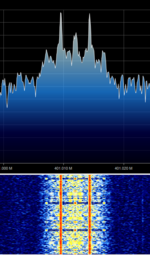 |
|
| Logic Trunked Radio (LTR) | Logic Trunked Radio, is an analog trunked radio format developed by EF Johnson Company. | 150 MHzMegaHertz (MHz) 10^6 Hz — 470 MHzMegaHertz (MHz) 10^6 Hz | NFMNarrowband Frequency Modulation | FSKFrequency-Shift Keying | 12.5 kHzKiloHertz (kHz) 10^3 Hz — 25 kHzKiloHertz (kHz) 10^3 Hz | 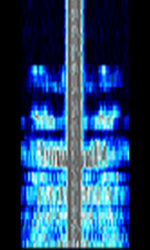 |
||
| Logitech(R) Wireless Mouse+Keyboard Signal | This signal comes from Logitech(R) Brand wireless mouse and keyboard combo unit. | 2,400 MHzMegaHertz (MHz) 10^6 Hz | RAW | PPMPulse Position Modulation, GFSKGaussian Frequency-Shift Keying | 500 kHzKiloHertz (kHz) 10^3 Hz | Worldwide | — | 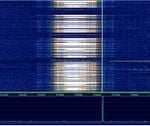 |
| Low Rate Picture Transmission (LRPT) | The Low Rate Picture Transmission (LRPT) is a digital transmission system, commonly transmitted by METEOR-M satellites, used to deliver weather images and data. | 137 MHzMegaHertz (MHz) 10^6 Hz — 138 MHzMegaHertz (MHz) 10^6 Hz | RAW | QPSKQuadrature Phase-Shift Keying (2 bits per symbol) | 120 kHzKiloHertz (kHz) 10^3 Hz | Worldwide | — | 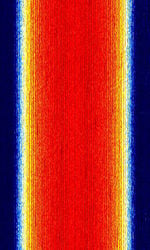 |
| M17 RF Protocol | An open source digital mode developed for amateur and other radio applications. | 30 MHzMegaHertz (MHz) 10^6 Hz — 10,500 MHzMegaHertz (MHz) 10^6 Hz | NFMNarrowband Frequency Modulation | 4FSK4-Level Frequency Shift Keying | 9 kHzKiloHertz (kHz) 10^3 Hz | Worldwide |  |
|
| M20 Radiosonde | Telemetry signal transmitted by M20 radiosondes | 400.15 MHzMegaHertz (MHz) 10^6 Hz — 406 MHzMegaHertz (MHz) 10^6 Hz | NFMNarrowband Frequency Modulation | FSKFrequency-Shift Keying | 30 kHzKiloHertz (kHz) 10^3 Hz | Worldwide | 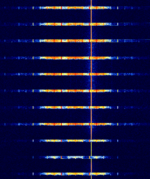 |
|
| MDC1200 | MDC (Motorola Data Communications), also known as Stat-Alert, MDC-1200 and MDC-600, is a Motorola two-way radio low-speed data system. | 30 MHzMegaHertz (MHz) 10^6 Hz — 960 MHzMegaHertz (MHz) 10^6 Hz | FMFrequency Modulation | AFSKAudio Frequency-Shift Keying | 12.5 kHzKiloHertz (kHz) 10^3 Hz — 20 kHzKiloHertz (kHz) 10^3 Hz | Worldwide | 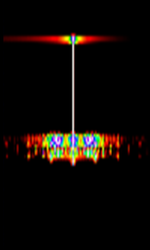 |
|
| METEOR-M High Resolution Picture Transmission (HRPT) | A variant of the NOAA HRPT signal, which has a different data structure and better low-signal handling characteristics. | 1,700 MHzMegaHertz (MHz) 10^6 Hz | RAW | PSKPhase-Shift Keying | 3 MHzMegaHertz (MHz) 10^6 Hz | Worldwide | — |  |
| METOP Advanced High Resolution Picture Transmission (AHRPT) | A high-speed digital link used by METOP weather satellites for direct data dissemination. | 1,701.3 MHzMegaHertz (MHz) 10^6 Hz — 1,707 MHzMegaHertz (MHz) 10^6 Hz | RAW | QPSKQuadrature Phase-Shift Keying (2 bits per symbol) | 6 MHzMegaHertz (MHz) 10^6 Hz | Worldwide | — |  |
| MFJ-269C Antenna SWR Analyzer | Popular antenna analyzer among ham operators and the like. Output power is only ~20mW so if heard, source is nearby. Other MFJ models may be similar. | 500 kHzKiloHertz (kHz) 10^3 Hz — 500 MHzMegaHertz (MHz) 10^6 Hz | AMAmplitude Modulation, NFMNarrowband Frequency Modulation | 1 kHzKiloHertz (kHz) 10^3 Hz | Worldwide | 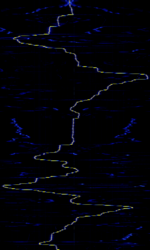 |
||
| MIL-STD-188-110 Appendix B 39-Tone | MIL-STD-188-110 Appendix B is a 39-tone OFDMOrthogonal Frequency-Division Multiplexing DQPSKDifferential Quadrature Phase-Shift Keying mode used to send data and voice. | 3 MHzMegaHertz (MHz) 10^6 Hz — 30 MHzMegaHertz (MHz) 10^6 Hz | USBUpper Side Band Modulation (Radio, referring to reception and modulation mode)Universal Serial Bus (Computer, referring to USB Ports and cables) | PSKPhase-Shift Keying, OFDMOrthogonal Frequency-Division Multiplexing | 2.4 kHzKiloHertz (kHz) 10^3 Hz | Worldwide | 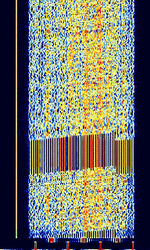 |
|
| MIL-STD-188-110 Serial | MIL-STD-188-110 Serial is a US Department of Defense standard for HFHigh Frequency (3-30 MHz) Communications, Serial PSKPhase-Shift Keying mode. Can transmit both data and voice with a range of interleaving and speed modes for optimal propagation. | 3 MHzMegaHertz (MHz) 10^6 Hz — 30 MHzMegaHertz (MHz) 10^6 Hz | USBUpper Side Band Modulation (Radio, referring to reception and modulation mode)Universal Serial Bus (Computer, referring to USB Ports and cables) | PSKPhase-Shift Keying | 2.75 kHzKiloHertz (kHz) 10^3 Hz | Worldwide | 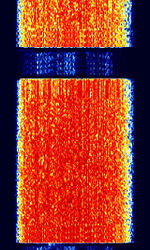 |
|
| MOBITEX | MOBITEX is an OSI based open standard, national public access wireless packet-switched data network. | 400 MHzMegaHertz (MHz) 10^6 Hz — 900 MHzMegaHertz (MHz) 10^6 Hz | NFMNarrowband Frequency Modulation | GMSKGaussian Minimum-Shift Keying, FFSKFast Frequency-Shift Keying | 15 kHzKiloHertz (kHz) 10^3 Hz | Worldwide | 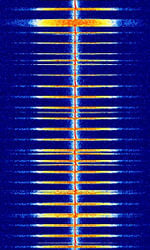 |
|
| MONITOR-2(RS39S) | Monitor-2 is a Russian 3u Cubesat used for cosmic flare observation. It is most likely only active when above Russia. | 435.815 MHzMegaHertz (MHz) 10^6 Hz | FMFrequency Modulation | AFSKAudio Frequency-Shift Keying | 12.5 kHzKiloHertz (kHz) 10^3 Hz | Worldwide | 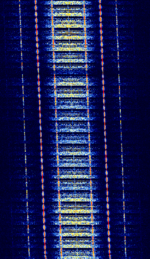 |
|
| MPDA | Experimental Multi‑Parallel Differential Amplitude Shift Keying (MP‑DASK) narrowband data mode for HFHigh Frequency (3-30 MHz)/VHFVery High Frequency (30-300 MHz) amateur radio text communication, created by amateur radio operator 6L5TNG in the Republic of Korea. | 1.8 MHzMegaHertz (MHz) 10^6 Hz — 53 MHzMegaHertz (MHz) 10^6 Hz | USBUpper Side Band Modulation (Radio, referring to reception and modulation mode)Universal Serial Bus (Computer, referring to USB Ports and cables) | MP‑DASK | 500 HzHertz (Hz), unit of frequency, defined as one cycle per second (1 Hz). — 2 kHzKiloHertz (kHz) 10^3 Hz | Worldwide | 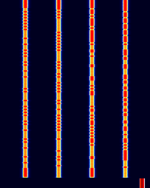 |
|
| MPT 1327 | MPT1327 (Ministry of Posts and Telegraph 1327) is a signaling protocol standard for analog trunked radio | 162.5 MHzMegaHertz (MHz) 10^6 Hz — 800 MHzMegaHertz (MHz) 10^6 Hz | NFMNarrowband Frequency Modulation | FFSKFast Frequency-Shift Keying, FMFrequency Modulation | 10 kHzKiloHertz (kHz) 10^3 Hz — 25 kHzKiloHertz (kHz) 10^3 Hz | Worldwide | 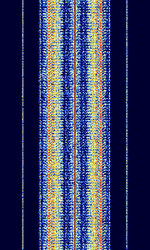 |
|
| MRZ-3MK Weather Balloon (radiosonde) | MRZ-3MK is a Russian weather radiosonde. | 1,680 MHzMegaHertz (MHz) 10^6 Hz | AMAmplitude Modulation | PFM | 6 MHzMegaHertz (MHz) 10^6 Hz | Russia | — | 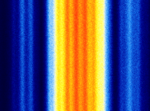 |
| MRZ-N1 Weather Balloon (radiosonde) | MRZ-N1 is a russian weather radiosonde. | 403 MHzMegaHertz (MHz) 10^6 Hz | FMFrequency Modulation | FSKFrequency-Shift Keying | 5 kHzKiloHertz (kHz) 10^3 Hz | Russia | 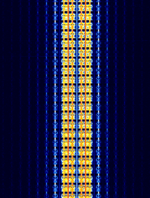 |
|
| MSF | MSF is a time signal station in Anthorn, United Kingdom, which broadcasts the UK national time reference | 60 kHzKiloHertz (kHz) 10^3 Hz | USBUpper Side Band Modulation (Radio, referring to reception and modulation mode)Universal Serial Bus (Computer, referring to USB Ports and cables) | OOKOn-Off Keying Modulation | 5 HzHertz (Hz), unit of frequency, defined as one cycle per second (1 Hz). | United Kingdom, Europe | 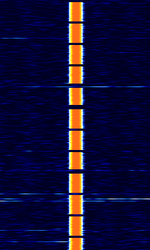 |
|
| MSK144 | MSK144 is a Minimum Shift Keying FSKFrequency-Shift Keying signal used for amateur radio meteor-scatter contacts. It transmits 144 bit long packets at a baudrate of 2000 bpsBits per second (bps) using frequencies 1000 and 2000 HzHertz (Hz), unit of frequency, defined as one cycle per second (1 Hz).. | 30 MHzMegaHertz (MHz) 10^6 Hz — 440 MHzMegaHertz (MHz) 10^6 Hz | FMFrequency Modulation | MSKMinimum-Shift Keying (When Shift/Bd = 0.5. It is impossible to get this ratio to be lower than 0.5, hence it is called the 'Minimum' shift.) | 2.5 kHzKiloHertz (kHz) 10^3 Hz | Worldwide | 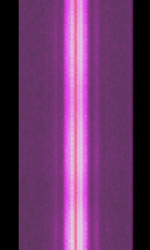 |
|
| MSM-1250 Modem | MSM-1250 (Medium Speed Modem) is a 10 FSKFrequency-Shift Keying-2 OFDMOrthogonal Frequency-Division Multiplexing digital data protocol used by the stand-alone modem "SkyFax", used to transmit and receive faxes on HFHigh Frequency (3-30 MHz). | 3 MHzMegaHertz (MHz) 10^6 Hz — 30 MHzMegaHertz (MHz) 10^6 Hz | USBUpper Side Band Modulation (Radio, referring to reception and modulation mode)Universal Serial Bus (Computer, referring to USB Ports and cables) | FSKFrequency-Shift Keying | 2.4 kHzKiloHertz (kHz) 10^3 Hz — 2.5 kHzKiloHertz (kHz) 10^3 Hz | Worldwide | 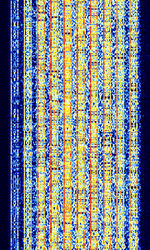 |
|
| MT63 | MT63 is a Orthogonal Frequency Division Multiplexed (OFDMOrthogonal Frequency-Division Multiplexing) digital data mode aimed for use in high noise environments. | 3 MHzMegaHertz (MHz) 10^6 Hz — 30 MHzMegaHertz (MHz) 10^6 Hz | USBUpper Side Band Modulation (Radio, referring to reception and modulation mode)Universal Serial Bus (Computer, referring to USB Ports and cables) | OFDMOrthogonal Frequency-Division Multiplexing, PSKPhase-Shift Keying | 500 HzHertz (Hz), unit of frequency, defined as one cycle per second (1 Hz). — 2 kHzKiloHertz (kHz) 10^3 Hz | Worldwide | 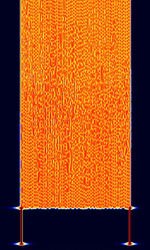 |
|
| Mazda SKE126-01 Key Fob | SKE126-01 Key Fob used for multiple Mazda models between 2006-2014. Manufactured by Mitsubishi Electric Company. | 433.413 MHzMegaHertz (MHz) 10^6 Hz | WFMWideband Frequency Modulation | FSKFrequency-Shift Keying | 100 kHzKiloHertz (kHz) 10^3 Hz | Worldwide | 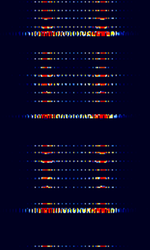 |
|
| Mazielka (X06) | Mazielka (X06) is a diplomatic selcall system used by the Russian Ministry of Foreign Affairs. Used to alert that a Serdolik transmission is going to occur soon, usually on a different frequency. | 4.963 MHzMegaHertz (MHz) 10^6 Hz — 23.458 MHzMegaHertz (MHz) 10^6 Hz | USBUpper Side Band Modulation (Radio, referring to reception and modulation mode)Universal Serial Bus (Computer, referring to USB Ports and cables) | MFSKMultiple Frequency Shift-Keying | 200 HzHertz (Hz), unit of frequency, defined as one cycle per second (1 Hz). | Russia | 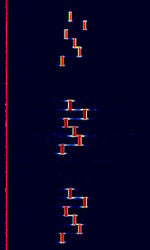 |
|
| Meteomodem M10 Weather Balloon (Radiosonde) | Weather balloon (radiosonde) telemetry data. | 400 MHzMegaHertz (MHz) 10^6 Hz — 406 MHzMegaHertz (MHz) 10^6 Hz | NFMNarrowband Frequency Modulation | PSKPhase-Shift Keying | 30 kHzKiloHertz (kHz) 10^3 Hz | Worldwide | 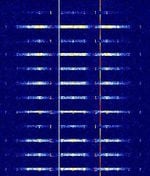 |
|
| Meteomodem PilotSonde Weather Balloon | Weather balloon telemetry data. | 400 MHzMegaHertz (MHz) 10^6 Hz — 406 MHzMegaHertz (MHz) 10^6 Hz | NFMNarrowband Frequency Modulation | FSKFrequency-Shift Keying | 15 kHzKiloHertz (kHz) 10^3 Hz | Worldwide | 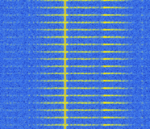 |
|
| Microsonde Mark II Weather Balloon - LORAN-C signal (Radiosonde) | Weather balloon telemetry data. The LORAN-C signal is mixed into the carrier. | 400 MHzMegaHertz (MHz) 10^6 Hz — 406 MHzMegaHertz (MHz) 10^6 Hz | WFMWideband Frequency Modulation | FSKFrequency-Shift Keying | 130 kHzKiloHertz (kHz) 10^3 Hz | Worldwide | 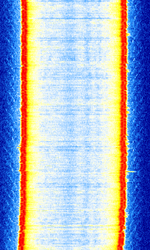 |
|
| Milstar | UHFUltra High Frequency (300-3000 MHz) FHSS Downlink of Milstar, a US joint military service satellite communications system that provides secure, jam resistant, worldwide communications. Nicknamed 'Waterdroplets' for it's characteristic waveform and sound. | 243.785 MHzMegaHertz (MHz) 10^6 Hz — 243.822 MHzMegaHertz (MHz) 10^6 Hz | RAW | FHSS | 50 kHzKiloHertz (kHz) 10^3 Hz | Worldwide |  |
|
| Modernised High Frequency Communications System (MHFCS) | The Modernised High Frequency Communications System (MHFCS) is an Australian Department of Defense HFHigh Frequency (3-30 MHz) System for their military communications network. Also known as AUS MIL ISBIndependent Side Band Modulation Modem, AUS MHFCS, and ADF HFCS. | 2.01 MHzMegaHertz (MHz) 10^6 Hz — 27.478 MHzMegaHertz (MHz) 10^6 Hz | USBUpper Side Band Modulation (Radio, referring to reception and modulation mode)Universal Serial Bus (Computer, referring to USB Ports and cables) | FSKFrequency-Shift Keying | 400 HzHertz (Hz), unit of frequency, defined as one cycle per second (1 Hz). — 750 HzHertz (Hz), unit of frequency, defined as one cycle per second (1 Hz). | Australia | 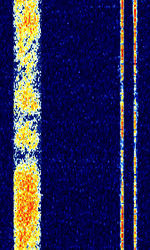 |
|
| Monaco Enterprises MAAP Fire Alarm | Fire alarm control panel built for the United States of America's Department of Defense. | 138.95 MHzMegaHertz (MHz) 10^6 Hz — 139.675 MHzMegaHertz (MHz) 10^6 Hz | FMFrequency Modulation | FSKFrequency-Shift Keying | 15 kHzKiloHertz (kHz) 10^3 Hz | United States | 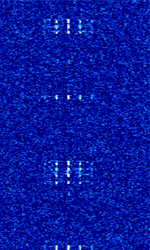 |
|
| Morse Code (CW) | CWContinuous Wave Morse Code is the simplest form of transmission found virtually all over the RFRadio Frequency bands for a variety of uses. The most common use of this is for Call-sign Beacons by both Amateur and Military operators. | 3 kHzKiloHertz (kHz) 10^3 Hz — 250,000 MHzMegaHertz (MHz) 10^6 Hz | CWContinuous Wave | OOKOn-Off Keying Modulation | Worldwide | 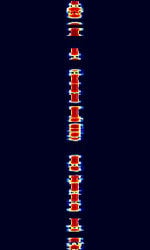 |
||
| Motorola ASTRO 25 HPD Air Interface | Motorola's ASTRO 25 High Performance Data Air Interface allows Motorola ASTRO 25 HPD modems to transfer data at up to 96 kbpsKilobits per second (kbps) over a 25 kHzKiloHertz (kHz) 10^3 Hz channel in the 700 MHzMegaHertz (MHz) 10^6 Hz or 800 MHzMegaHertz (MHz) 10^6 Hz bands. | 769 MHzMegaHertz (MHz) 10^6 Hz — 869 MHzMegaHertz (MHz) 10^6 Hz | RAW | QAMQuadrature Amplitude Modulation | 17.7 kHzKiloHertz (kHz) 10^3 Hz | United States | 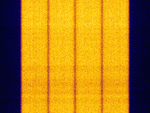 |
|
| Motorola Type II | Radio trunking control channel. | 136 MHzMegaHertz (MHz) 10^6 Hz — 941 MHzMegaHertz (MHz) 10^6 Hz | NFMNarrowband Frequency Modulation | FSKFrequency-Shift Keying | 16 kHzKiloHertz (kHz) 10^3 Hz | Worldwide | 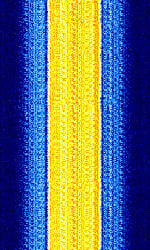 |
|
| Multi Frequency Shift Keying (MFSK) | MFSKMultiple Frequency Shift-Keying is a generic family of frequency shift keying digital transmission methods using more than the two tones of BFSK (binary FSKFrequency-Shift Keying). Many digital signals, especially on HFHigh Frequency (3-30 MHz), use MFSKMultiple Frequency Shift-Keying including WSPR, FT4 and FT8. MFSKMultiple Frequency Shift-Keying-8 and MFSKMultiple Frequency Shift-Keying-16 are two other well-known amateur radio modes. | 3 MHzMegaHertz (MHz) 10^6 Hz — 30 MHzMegaHertz (MHz) 10^6 Hz | USBUpper Side Band Modulation (Radio, referring to reception and modulation mode)Universal Serial Bus (Computer, referring to USB Ports and cables) | MFSKMultiple Frequency Shift-Keying | 154 HzHertz (Hz), unit of frequency, defined as one cycle per second (1 Hz). — 630 HzHertz (Hz), unit of frequency, defined as one cycle per second (1 Hz). | Worldwide | 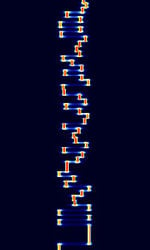 |
|
| Multitone Paging | Multitone Paging signal, developed by Multitone Electronics in the UK. Uses similar coding to POCSAG but the headers are different and only work with Multitone's range of paging products | 25 MHzMegaHertz (MHz) 10^6 Hz — 470 MHzMegaHertz (MHz) 10^6 Hz | NFMNarrowband Frequency Modulation | FFSKFast Frequency-Shift Keying | 12.5 kHzKiloHertz (kHz) 10^3 Hz — 25 kHzKiloHertz (kHz) 10^3 Hz | Worldwide | 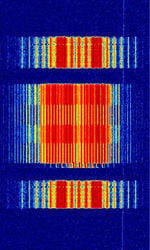 |
|
| NB-IOT | Narrowband Internet of Things (NB-IoTInternet of Things) is a Low Power Wide Area Network (LPWAN) radio technology standard developed by 3GPP to enable a wide range of cellular devices and services. | 700 MHzMegaHertz (MHz) 10^6 Hz — 1,900 MHzMegaHertz (MHz) 10^6 Hz | AMAmplitude Modulation | QPSKQuadrature Phase-Shift Keying (2 bits per symbol) | 200 kHzKiloHertz (kHz) 10^3 Hz | Worldwide |  |
|
| NDB beacon signals | Non-directional Beacons are low frequency navigation aids | 290 kHzKiloHertz (kHz) 10^3 Hz — 421 kHzKiloHertz (kHz) 10^3 Hz | AMAmplitude Modulation | 1 kHzKiloHertz (kHz) 10^3 Hz | Brussels, Belgium |  |
||
| NFM Voice | Used in analog walkie-talkies and communication systems. | 27 MHzMegaHertz (MHz) 10^6 Hz — 864 MHzMegaHertz (MHz) 10^6 Hz | NFMNarrowband Frequency Modulation | FMFrequency Modulation | 5 kHzKiloHertz (kHz) 10^3 Hz — 30 kHzKiloHertz (kHz) 10^3 Hz | Worldwide | 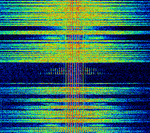 |
|
| NML | Naval Radio Transmitter Facility (NRTF) transmits encrypted commands to submerged US submarines. | 25.2 kHzKiloHertz (kHz) 10^3 Hz | CWContinuous Wave | FSKFrequency-Shift Keying | 300 HzHertz (Hz), unit of frequency, defined as one cycle per second (1 Hz). | United States | 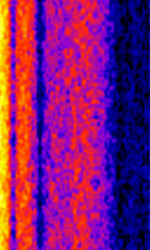 |
|
| NOV | TACAMO (take charge and move out) is the back up communications system to the US nuclear submarine fleet in case an attack on land based transmitters disables them. A rotating fleet of Navy E6 jets equipped with 200 KW transmitters and two 2½-mile-long trailing wire antennas (TWA) at 35,000 ft altitude to provide 24/7 coverage. Short pings are transmitted every few seconds. | 26.9 kHzKiloHertz (kHz) 10^3 Hz | CWContinuous Wave | Worldwide | 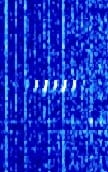 |
|||
| NPM | Naval Radio Transmitting Facility (NRTF) sends encrypted commands to submerged US naval submarines in the Pacific. | 21.4 kHzKiloHertz (kHz) 10^3 Hz | CWContinuous Wave | FSKFrequency-Shift Keying | 300 HzHertz (Hz), unit of frequency, defined as one cycle per second (1 Hz). | United States | 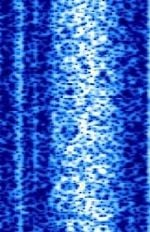 |
|
| NWC | Naval Communication Station (NCS) Harold E. Holt. Used jointly by the Australian and United States navies to transmit encrypted orders to submerged submarines in the Pacific. | 19.8 kHzKiloHertz (kHz) 10^3 Hz | CWContinuous Wave | FSKFrequency-Shift Keying | 300 HzHertz (Hz), unit of frequency, defined as one cycle per second (1 Hz). | Australia |  |
|
| Near Field Communication (NFC) | Near-field communication (NFC) is a set of communication protocols that enables communication between two electronic devices over a distance of 4 cm (11⁄2 in) or less. | 13.56 MHzMegaHertz (MHz) 10^6 Hz | ASKAmplitude-Shift Keying | 1.7 MHzMegaHertz (MHz) 10^6 Hz | Worldwide | 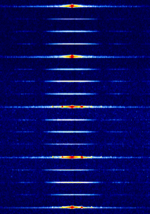 |
||
| Near Instantaneous Companded Audio Multiplex (NICAM) | NICAM is used to provide digital stereo audio alongside PAL video for television broadcasts. | 174 MHzMegaHertz (MHz) 10^6 Hz — 700 MHzMegaHertz (MHz) 10^6 Hz | RAW | PSKPhase-Shift Keying | 400 kHzKiloHertz (kHz) 10^3 Hz | Worldwide | — |  |
| Next Generation Digital Narrowband (NXDN) | NXDN is a digital narrowband trunked radio protocol used in commercial, business & industry, transport and Public Safety professional radio systems. | 136 MHzMegaHertz (MHz) 10^6 Hz — 520 MHzMegaHertz (MHz) 10^6 Hz | NFMNarrowband Frequency Modulation | 4FSK4-Level Frequency Shift Keying | 6.25 kHzKiloHertz (kHz) 10^3 Hz — 12.5 kHzKiloHertz (kHz) 10^3 Hz | Worldwide | 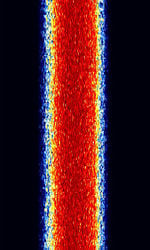 |
|
| Nokia Adaptive Message Terminal | The Nokia Adaptive Message Terminal, also known as Nokia Adaptive Burst Modem and Kryapp 302, is a Finnish encrypted messaging system suggested to be used by Finnish Intelligence Services and Swedish Military. | 3 MHzMegaHertz (MHz) 10^6 Hz — 30 MHzMegaHertz (MHz) 10^6 Hz | USBUpper Side Band Modulation (Radio, referring to reception and modulation mode)Universal Serial Bus (Computer, referring to USB Ports and cables) | FSKFrequency-Shift Keying | 1 kHzKiloHertz (kHz) 10^3 Hz — 1.6 kHzKiloHertz (kHz) 10^3 Hz | Worldwide | 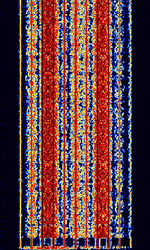 |
|
| Non-Directional Beacon (NDB) | A Non-Directional Beacon (NDB) is a ground-based, low frequency radio transmitter used as an instrument approach for airports and offshore platforms. | 190 kHzKiloHertz (kHz) 10^3 Hz — 1.8 MHzMegaHertz (MHz) 10^6 Hz | CWContinuous Wave | AMAmplitude Modulation | 2 kHzKiloHertz (kHz) 10^3 Hz | Worldwide | 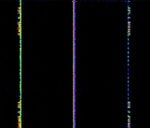 |
|
| North Korean Diplo FSK | North Korean Diplomatic FSKFrequency-Shift Keying link, teletype radio diplomatic usage. Also known as DPRK-FSKFrequency-Shift Keying, KRE-FSKFrequency-Shift Keying, DPRK-ARQAutomatic Repeat reQuestAutomatic Repeat Query, and KEGURI. Has a FECForward Error Correction stream mode and a burst ARQAutomatic Repeat reQuestAutomatic Repeat Query mode. | 9 MHzMegaHertz (MHz) 10^6 Hz — 29 MHzMegaHertz (MHz) 10^6 Hz | USBUpper Side Band Modulation (Radio, referring to reception and modulation mode)Universal Serial Bus (Computer, referring to USB Ports and cables) | FSKFrequency-Shift Keying | 1.2 kHzKiloHertz (kHz) 10^3 Hz — 1.4 kHzKiloHertz (kHz) 10^3 Hz | North Korea | 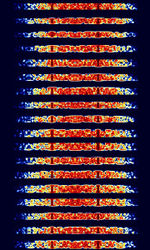 |
|
| North Korean noise jammer | Noise jammer with a carrier than tends to switch frequencies slightly lower and higher than the main signal frequency. Commonly found on 6.6 MHzMegaHertz (MHz) 10^6 Hz | 6.6 MHzMegaHertz (MHz) 10^6 Hz | AMAmplitude Modulation | AMAmplitude Modulation | 7 kHzKiloHertz (kHz) 10^3 Hz | North Korea | 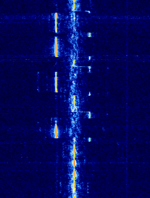 |
|
| OFDM NBTV | OFDMOrthogonal Frequency-Division Multiplexing NBTV is an analog technique, in fact it is a true Fuzzy design as well. The transmission technique used is quite different from conventional TV | 3 HzHertz (Hz), unit of frequency, defined as one cycle per second (1 Hz). — 30 MHzMegaHertz (MHz) 10^6 Hz | SSBSingle-sideband modulation | Analog OFDMOrthogonal Frequency-Division Multiplexing | 2 kHzKiloHertz (kHz) 10^3 Hz | Worldwide |  |
|
| OPERA Beacon and Data | OPERA Ad-Hoc Data/Beacon. The system is unique in that utilizes a serial data stream and Manchester coding, its therefore impossible to lose lock and its extremely robust in disturbed paths and heavy static. | 136 kHzKiloHertz (kHz) 10^3 Hz — 10,000 MHzMegaHertz (MHz) 10^6 Hz | USBUpper Side Band Modulation (Radio, referring to reception and modulation mode)Universal Serial Bus (Computer, referring to USB Ports and cables) | ASKAmplitude-Shift Keying | 1 HzHertz (Hz), unit of frequency, defined as one cycle per second (1 Hz). | Worldwide | 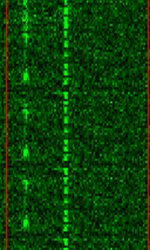 |
|
| Olivia | OLIVIA is an amateur digital teletype mode designed by Pawel Jalocha SP9VRC in 2005. Its goal was to be effective even in poor propagation conditions. | 3 MHzMegaHertz (MHz) 10^6 Hz — 30 MHzMegaHertz (MHz) 10^6 Hz | USBUpper Side Band Modulation (Radio, referring to reception and modulation mode)Universal Serial Bus (Computer, referring to USB Ports and cables) | MFSKMultiple Frequency Shift-Keying | 125 HzHertz (Hz), unit of frequency, defined as one cycle per second (1 Hz). — 2 kHzKiloHertz (kHz) 10^3 Hz | Worldwide | 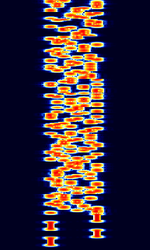 |
|
| One Beep, Two Beeps | One Beep, Two Beeps is a nickname given to a signal emitted by the Norwegian Navy communications center in Bodø | 4.5 MHzMegaHertz (MHz) 10^6 Hz — 6.429 MHzMegaHertz (MHz) 10^6 Hz | USBUpper Side Band Modulation (Radio, referring to reception and modulation mode)Universal Serial Bus (Computer, referring to USB Ports and cables) | Norway | 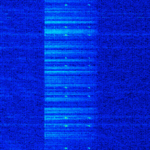 |
|||
| OpenWay CENTRON Smart-Meter | This is a signal from a OpenWay Centron Electric 'Smart Meter'. Each house is now fitted with one of these, and they are strong - typically 50 dBThe decibel (dB) is a logarithmic unit used to express the ratio of two values of a physical quantity, here the strength of a received signal. above the atmospheric noise level. | 902 MHzMegaHertz (MHz) 10^6 Hz — 928 MHzMegaHertz (MHz) 10^6 Hz | BPSKBinary Phase-Shift Keying (1 bit per symbol) | 15 kHzKiloHertz (kHz) 10^3 Hz | United States | — | 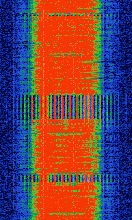 |
|
| OrbComm Mobile Telephony | Orbcomm digitized mobile satellite-based telephone signal intercepted over Hawaii, preceding NOAA 19 pass. | 137.2 MHzMegaHertz (MHz) 10^6 Hz — 137.46 MHzMegaHertz (MHz) 10^6 Hz | NFMNarrowband Frequency Modulation | 15 kHzKiloHertz (kHz) 10^3 Hz | Worldwide | 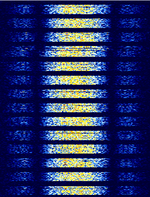 |
||
| Orbcomm | Orbcomm satellites are used for monitoring and sending short text messages. | 137 MHzMegaHertz (MHz) 10^6 Hz — 150 MHzMegaHertz (MHz) 10^6 Hz | NFMNarrowband Frequency Modulation | SDPSK | 15 kHzKiloHertz (kHz) 10^3 Hz | Worldwide | 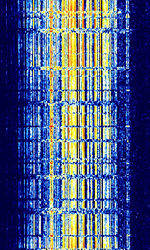 |
|
| P03 numbers station | Enigma designation P03 is a family of digital PSKPhase-Shift Keying modes, used by the "Polish 11" numbers station operator, which is likely a Polish intelligence agency. | 4 MHzMegaHertz (MHz) 10^6 Hz — 21 MHzMegaHertz (MHz) 10^6 Hz | USBUpper Side Band Modulation (Radio, referring to reception and modulation mode)Universal Serial Bus (Computer, referring to USB Ports and cables) | BPSKBinary Phase-Shift Keying (1 bit per symbol), QPSKQuadrature Phase-Shift Keying (2 bits per symbol) | 200 HzHertz (Hz), unit of frequency, defined as one cycle per second (1 Hz). | Worldwide, Poland | 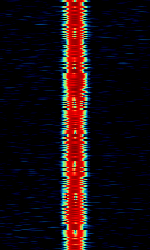 |
|
| P07 numbers station | Enigma designation P07 is a custom digital mode used by the "Russian 7" numbers station operator which is likely a major Russian intelligence agency. | 4.6 MHzMegaHertz (MHz) 10^6 Hz — 10.45 MHzMegaHertz (MHz) 10^6 Hz | USBUpper Side Band Modulation (Radio, referring to reception and modulation mode)Universal Serial Bus (Computer, referring to USB Ports and cables) | FSKFrequency-Shift Keying, BPSKBinary Phase-Shift Keying (1 bit per symbol), QPSKQuadrature Phase-Shift Keying (2 bits per symbol), OFDMOrthogonal Frequency-Division Multiplexing | 3.5 kHzKiloHertz (kHz) 10^3 Hz | Russia | 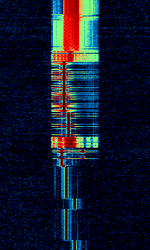 |
|
| PACKET | Packet, also known as FSK300, AFSK1200, BPSK300, QPSK600, BPSK1200, QPSK2400, AX.25 and IL2P, is a packet based protocol derived from X.25 and HDLC computer network protocols. Packet radio is a synchronous system in which data is transmitted in frames. | 3 MHzMegaHertz (MHz) 10^6 Hz — 800 MHzMegaHertz (MHz) 10^6 Hz | USBUpper Side Band Modulation (Radio, referring to reception and modulation mode)Universal Serial Bus (Computer, referring to USB Ports and cables) | FSKFrequency-Shift Keying | 730 HzHertz (Hz), unit of frequency, defined as one cycle per second (1 Hz). | Worldwide | 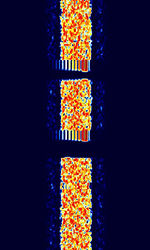 |
|
| PACTOR II | PACTOR II is an advancement of PACTOR I. It is up to 8 times faster than PACTOR I. | 3 MHzMegaHertz (MHz) 10^6 Hz — 30 MHzMegaHertz (MHz) 10^6 Hz | USBUpper Side Band Modulation (Radio, referring to reception and modulation mode)Universal Serial Bus (Computer, referring to USB Ports and cables) | PSKPhase-Shift Keying | 450 HzHertz (Hz), unit of frequency, defined as one cycle per second (1 Hz). | Worldwide | 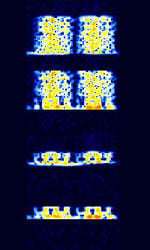 |
|
| PACTOR III | PACTOR III introduces 6 speed levels that provide higher throughput and improved robustness compared to PACTOR I and II. PACTOR III is on average 3.5 times faster than PACTOR II. With optimal conditions, PACTOR III becomes over 5 times faster. | 3 MHzMegaHertz (MHz) 10^6 Hz — 30 MHzMegaHertz (MHz) 10^6 Hz | USBUpper Side Band Modulation (Radio, referring to reception and modulation mode)Universal Serial Bus (Computer, referring to USB Ports and cables) | PSKPhase-Shift Keying | 400 HzHertz (Hz), unit of frequency, defined as one cycle per second (1 Hz). — 2.4 kHzKiloHertz (kHz) 10^3 Hz | Worldwide | 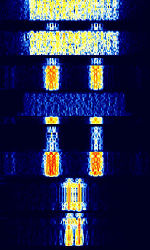 |
|
| PACTOR IV | PACTOR IV is the newest iteration of the PACTOR series, advancing from PACTOR I-III. It is 1.5x-3x faster than PACTOR III, and has 10 speed levels. | 3 MHzMegaHertz (MHz) 10^6 Hz — 30 MHzMegaHertz (MHz) 10^6 Hz | USBUpper Side Band Modulation (Radio, referring to reception and modulation mode)Universal Serial Bus (Computer, referring to USB Ports and cables) | PSKPhase-Shift Keying, QAMQuadrature Amplitude Modulation | 300 HzHertz (Hz), unit of frequency, defined as one cycle per second (1 Hz). — 2.4 kHzKiloHertz (kHz) 10^3 Hz | Worldwide | 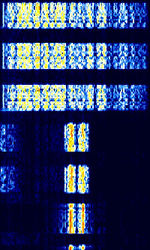 |
|
| PI4 | PI4 (PharusIgnis4) is a 4-MFSKMultiple Frequency Shift-Keying mode designed for amateur radio beacons. It is designed to work via different propagation modes. | 28 MHzMegaHertz (MHz) 10^6 Hz — 1,296 MHzMegaHertz (MHz) 10^6 Hz | USBUpper Side Band Modulation (Radio, referring to reception and modulation mode)Universal Serial Bus (Computer, referring to USB Ports and cables) | MFSKMultiple Frequency Shift-Keying | 709 HzHertz (Hz), unit of frequency, defined as one cycle per second (1 Hz). | Worldwide | 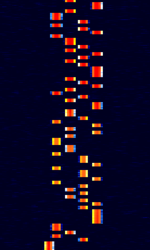 |
|
| PLUTO II OTH Radar | PLUTO II is an Over The Horizon Radar located in the Sovereign Base Area just outside RAF Akrotiri in Cyprus. PLUTO II is very active in Europe. | 8 MHzMegaHertz (MHz) 10^6 Hz — 38 MHzMegaHertz (MHz) 10^6 Hz | USBUpper Side Band Modulation (Radio, referring to reception and modulation mode)Universal Serial Bus (Computer, referring to USB Ports and cables) | FMCW | 20 kHzKiloHertz (kHz) 10^3 Hz — 40 kHzKiloHertz (kHz) 10^3 Hz | Cyprus | 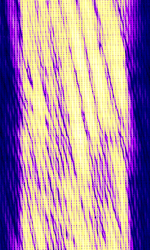 |
|
| POCSAG | POCSAG (Post Office Code Standardisation Advisory Group), also known as Super-POCSAG, Radio Paging Code No. 1 or RPC1, is a one-way 2FSK paging protocol that supports 512, 1200, and 2400 bpsBits per second (bps). | 25 MHzMegaHertz (MHz) 10^6 Hz — 932 MHzMegaHertz (MHz) 10^6 Hz | NFMNarrowband Frequency Modulation | FSKFrequency-Shift Keying | 9 kHzKiloHertz (kHz) 10^3 Hz | Worldwide | 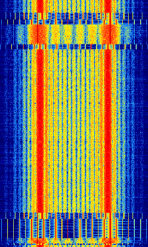 |
|
| PROBA 1/2 Downlink | Dump of satellite data to Redu, Belgium ground station from the PROBA (Project for On-Board Autonomy) 1, 2, and V ESA satellites. | 2,235 MHzMegaHertz (MHz) 10^6 Hz | RAW | BPSKBinary Phase-Shift Keying (1 bit per symbol) | 4 MHzMegaHertz (MHz) 10^6 Hz | Europe | — |  |
| PSK Paging link | Also known as PSKPhase-Shift Keying paging, is a signal that allows side-by-side PSKPhase-Shift Keying to exist in AFSKAudio Frequency-Shift Keying paging links, allowing for more dynamically processed DSP available. | 150 MHzMegaHertz (MHz) 10^6 Hz — 470 MHzMegaHertz (MHz) 10^6 Hz | FMFrequency Modulation | PSKPhase-Shift Keying | 12.5 kHzKiloHertz (kHz) 10^3 Hz | United States | 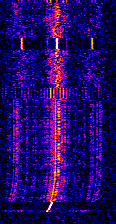 |
|
| Panther-H Modem | Panther-H is an intelligent frequency hopping transceiver developed by Racal (now Thales Group). Has a signature 8-burst SOC (Start Of Conversation) sync procedure. Used in Panther-2000H radios | 1.5 MHzMegaHertz (MHz) 10^6 Hz — 30 MHzMegaHertz (MHz) 10^6 Hz | USBUpper Side Band Modulation (Radio, referring to reception and modulation mode)Universal Serial Bus (Computer, referring to USB Ports and cables) | PSKPhase-Shift Keying | 3 kHzKiloHertz (kHz) 10^3 Hz | Worldwide | 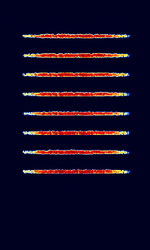 |
|
| Phase Shift Keying (PSK) | PSKPhase-Shift Keying is a digital teletype mode based on Phase-Shift Keying (PSKPhase-Shift Keying) modulation. The most popular amateur radio PSKPhase-Shift Keying mode is PSKPhase-Shift Keying 31. | 1.838 MHzMegaHertz (MHz) 10^6 Hz — 909 MHzMegaHertz (MHz) 10^6 Hz | USBUpper Side Band Modulation (Radio, referring to reception and modulation mode)Universal Serial Bus (Computer, referring to USB Ports and cables) | PSKPhase-Shift Keying | 10 HzHertz (Hz), unit of frequency, defined as one cycle per second (1 Hz). — 1 kHzKiloHertz (kHz) 10^3 Hz | Worldwide | 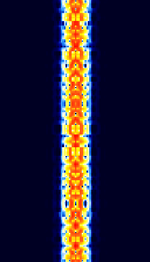 |
|
| Podsolnukh 'Sunflower' Radar | A Russian over the horizon radar, also known as "Sunflower" | 3.5 MHzMegaHertz (MHz) 10^6 Hz — 8 MHzMegaHertz (MHz) 10^6 Hz | IQQuadrature signals form the basis of complex RF signal modulation and demodulation, both in hardware and in software, as well as in complex signal analysis. | FMOP | 50 kHzKiloHertz (kHz) 10^3 Hz | Russia, Worldwide | 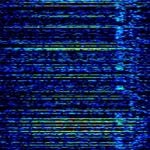 |
|
| Positive Train Control (PTC) | Positive train control (PTC) is a system of functional requirements for monitoring and controlling train movements as an attempt to provide increased safety. | 220 MHzMegaHertz (MHz) 10^6 Hz | RAW | 20 kHzKiloHertz (kHz) 10^3 Hz | United States | 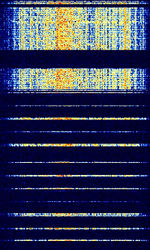 |
||
| Primary Aeronautical Surveillance Radar | A Primary radar (PSR Primary Surveillance Radar) is a conventional radar sensor that illuminates a large portion of space with an electromagnetic wave and receives back the reflected waves from targets within that space. | 1,215 MHzMegaHertz (MHz) 10^6 Hz — 1,400 MHzMegaHertz (MHz) 10^6 Hz | RAW | Pulse | 3 MHzMegaHertz (MHz) 10^6 Hz | Worldwide | 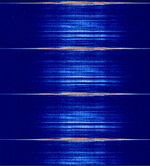 |
|
| Primex Wireless Time Sync | Primex Wireless Time Sync is a VHFVery High Frequency (30-300 MHz) Time Synchronization signal used in Primex Wireless's XR Series. | 72.02 MHzMegaHertz (MHz) 10^6 Hz — 72.98 MHzMegaHertz (MHz) 10^6 Hz | NFMNarrowband Frequency Modulation | PSKPhase-Shift Keying | 20 kHzKiloHertz (kHz) 10^3 Hz | Worldwide | 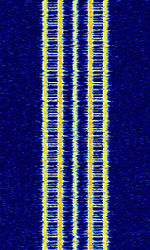 |
|
| ProVoice | ProVoice is a digital voice mode used in EDACS trunked systems. | 160 MHzMegaHertz (MHz) 10^6 Hz — 941 MHzMegaHertz (MHz) 10^6 Hz | NFMNarrowband Frequency Modulation | GFSKGaussian Frequency-Shift Keying | Worldwide | 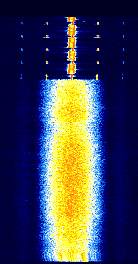 |
||
| Project 25 (P25) | Project 25 (P25 or APCO-25) is a trunked radio standard developed by The Association of Public Safety Communications Officials International (APCO-25) for use with public safety organizations around the world. | 136 MHzMegaHertz (MHz) 10^6 Hz — 939 MHzMegaHertz (MHz) 10^6 Hz | NFMNarrowband Frequency Modulation | PSKPhase-Shift Keying, C4FMContinuous 4-Level Frequency Modulation, TDMATime Division Multiple Access | 12.5 kHzKiloHertz (kHz) 10^3 Hz | Worldwide | 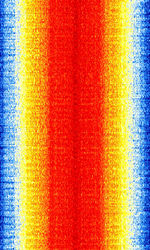 |
|
| Q65 | Q65 is a 65-FSKFrequency-Shift Keying extreme weak-signal mode which is designed for Earth-Moon-Earth communications and fast-fading propagation modes such as tropospheric scatter, rain scatter and trans-equatorial propagation. It offers a variety of submodes. Q65 is part of the WSJT-X software. | 50.275 MHzMegaHertz (MHz) 10^6 Hz — 144.17 MHzMegaHertz (MHz) 10^6 Hz | USBUpper Side Band Modulation (Radio, referring to reception and modulation mode)Universal Serial Bus (Computer, referring to USB Ports and cables) | MFSKMultiple Frequency Shift-Keying | 19 HzHertz (Hz), unit of frequency, defined as one cycle per second (1 Hz). — 1.733 kHzKiloHertz (kHz) 10^3 Hz | Worldwide | 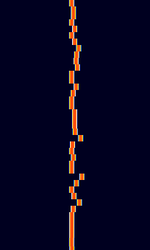 |
|
| QO-100-modem | High speed modem for QO-100 (Es'hail 2) amateur satellite narrow transponder. | 10,489.5 MHzMegaHertz (MHz) 10^6 Hz — 10,490 MHzMegaHertz (MHz) 10^6 Hz | USBUpper Side Band Modulation (Radio, referring to reception and modulation mode)Universal Serial Bus (Computer, referring to USB Ports and cables) | QPSKQuadrature Phase-Shift Keying (2 bits per symbol), BPSKBinary Phase-Shift Keying (1 bit per symbol), APSK | 2.7 kHzKiloHertz (kHz) 10^3 Hz | 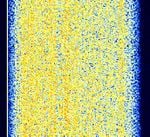 |
||
| Quadcopter Telemetry Signal | This signal originates from the Silicon Instruments Si1000 Software Defined Radio (SDR) that is a component of the 3DR Telemetry Radio, sold for use as a data link between a computer ground station and a UAV "a drone". | 414 MHzMegaHertz (MHz) 10^6 Hz — 935 MHzMegaHertz (MHz) 10^6 Hz | FHSS-TDM | BPSKBinary Phase-Shift Keying (1 bit per symbol), QAMQuadrature Amplitude Modulation, 8PSK8-Phase Phase-Shift Keying (3 bits per symbol) | Worldwide | No Audio File | 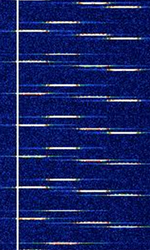 |
|
| RBU | RBU is a time code radio station located in Moscow. It transmits a continuous 10 kW time code on 66.66 kHzKiloHertz (kHz) 10^3 Hz. | 66.66 kHzKiloHertz (kHz) 10^3 Hz | USBUpper Side Band Modulation (Radio, referring to reception and modulation mode)Universal Serial Bus (Computer, referring to USB Ports and cables) | FSKFrequency-Shift Keying | 650 HzHertz (Hz), unit of frequency, defined as one cycle per second (1 Hz). | Russia | 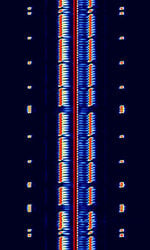 |
|
| RDL VLF | RDL is a Russian VLFVery Low Frequency (3-30 kHz) station located in Krasnodar. It is one of the few VLFVery Low Frequency (3-30 kHz) stations that changes modes during routine transmissions. | 18.1 kHzKiloHertz (kHz) 10^3 Hz — 27.3 kHzKiloHertz (kHz) 10^3 Hz | CWContinuous Wave | FSKFrequency-Shift Keying, CWContinuous Wave-FSKFrequency-Shift Keying | 300 HzHertz (Hz), unit of frequency, defined as one cycle per second (1 Hz). | Russia |  |
|
| RF heating and welding interference | Radio frequency heating and welding equipment may radiate interference which can be picked up by radio receivers. On a waterfall display, it usually appears as wobbly peaks that rapidly drift downwards in frequency. | 24 MHzMegaHertz (MHz) 10^6 Hz — 30 MHzMegaHertz (MHz) 10^6 Hz | USBUpper Side Band Modulation (Radio, referring to reception and modulation mode)Universal Serial Bus (Computer, referring to USB Ports and cables) | CWContinuous Wave, FMFrequency Modulation | Worldwide | 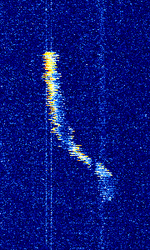 |
||
| RFID | Radio-frequency identification (RFID) uses electromagnetic fields to automatically identify and track tags attached to objects. The tags contain electronically-stored information. Passive tags collect energy from a nearby RFID reader's interrogating radio waves. | 13.56 MHzMegaHertz (MHz) 10^6 Hz | USBUpper Side Band Modulation (Radio, referring to reception and modulation mode)Universal Serial Bus (Computer, referring to USB Ports and cables) | 3.3 kHzKiloHertz (kHz) 10^3 Hz | Worldwide | 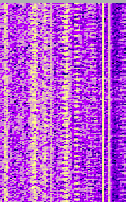 |
||
| ROS | ROS is an amateur radio teletype free running QSO mode designed for low signal/high noise conditions. | 1.8 MHzMegaHertz (MHz) 10^6 Hz — 30 MHzMegaHertz (MHz) 10^6 Hz | USBUpper Side Band Modulation (Radio, referring to reception and modulation mode)Universal Serial Bus (Computer, referring to USB Ports and cables) | DSSS | 2 kHzKiloHertz (kHz) 10^3 Hz | Worldwide | 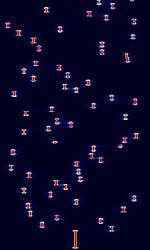 |
|
| RWM | RWM is a Russian shortwave time signal station. | 4.996 MHzMegaHertz (MHz) 10^6 Hz — 14.996 MHzMegaHertz (MHz) 10^6 Hz | USBUpper Side Band Modulation (Radio, referring to reception and modulation mode)Universal Serial Bus (Computer, referring to USB Ports and cables) | OOKOn-Off Keying Modulation | 5 HzHertz (Hz), unit of frequency, defined as one cycle per second (1 Hz). | Russia | 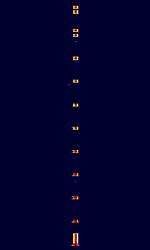 |
|
| Radar altimeter | Aircrafts radar altimeter. | 4,200 MHzMegaHertz (MHz) 10^6 Hz — 4,300 MHzMegaHertz (MHz) 10^6 Hz | AMAmplitude Modulation | FMCW | 20 MHzMegaHertz (MHz) 10^6 Hz | Worldwide |  |
|
| Radio Data Link Access Procedure (RD-LAP) | Motorola's Radio Data Link Access Procedure (RD-LAP) is a 1G protocol that was used in ARDIS and DataTAC Networks, and is still used in some MDTMobile Data Terminal, A mobile data terminal (MDT) is a computerized device used in public transit vehicles, taxicabs, commercial trucking fleets, military logistics, and emergency vehicles, such as police cars, to communicate with a central dispatch office.'s, as well as gas companies, police departments, fire departments, financial companies, etc. | 150 MHzMegaHertz (MHz) 10^6 Hz — 850 MHzMegaHertz (MHz) 10^6 Hz | NFMNarrowband Frequency Modulation | 4FSK4-Level Frequency Shift Keying | 12.5 kHzKiloHertz (kHz) 10^3 Hz — 25 kHzKiloHertz (kHz) 10^3 Hz | Worldwide | 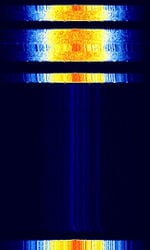 |
|
| Radio Data System (RDS) | Radio Data System (RDS) and its North American variant, Radio Broadcast Data System (RBDS), are data modes transmitted on subcarriers of commercial FMFrequency Modulation radio station transmissions. | 65 MHzMegaHertz (MHz) 10^6 Hz — 108 MHzMegaHertz (MHz) 10^6 Hz | DSBDual Side Band Modulation | PSKPhase-Shift Keying | 4 kHzKiloHertz (kHz) 10^3 Hz | Worldwide | 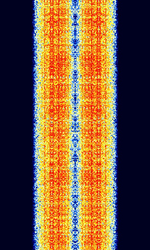 |
|
| Radio Navigation Satellite System (RNSS) | Generic positioning, navigation, and timing (PNT) signals transmitted by global/regional navigation satellite system (GNSS/RNSS) and Satellite-Based Augmentation System (SBAS) constellations such as GPS, GLONASS, Galileo, BeiDou, QZSS, and IRNSS. | 1,176.45 MHzMegaHertz (MHz) 10^6 Hz — 1,575.42 MHzMegaHertz (MHz) 10^6 Hz | RAW | BPSKBinary Phase-Shift Keying (1 bit per symbol), QAMQuadrature Amplitude Modulation, DSSS, BOC, TMBOC | 22 MHzMegaHertz (MHz) 10^6 Hz — 25 MHzMegaHertz (MHz) 10^6 Hz | Worldwide |  |
|
| Radio Teletype (RTTY) | RTTYRadio TeleTYpe (Also known as Baudot or ITA2) uses the Baudot 5-bit alphabet with FSKFrequency-Shift Keying to send text messages over the shortwave. This mode is gradually dying out in favor of more robust modes like PSK31 in the amateur service. | 147.3 kHzKiloHertz (kHz) 10^3 Hz — 28.15 MHzMegaHertz (MHz) 10^6 Hz | USBUpper Side Band Modulation (Radio, referring to reception and modulation mode)Universal Serial Bus (Computer, referring to USB Ports and cables) | FSKFrequency-Shift Keying | 85 HzHertz (Hz), unit of frequency, defined as one cycle per second (1 Hz). — 850 HzHertz (Hz), unit of frequency, defined as one cycle per second (1 Hz). | Worldwide | 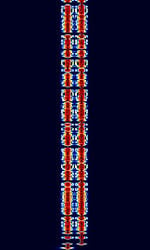 |
|
| Radioteknicheskaya Systema Dalney Navigatsii (RSDN-20) | RSDN-20, also known as Alpha, is a Russian hyperbolic radio navigation system. Presumed to be used for Russian ships, submarines and aircraft in the northern hemisphere, possibly worldwide. | 11.91 kHzKiloHertz (kHz) 10^3 Hz — 14.88 kHzKiloHertz (kHz) 10^3 Hz | CWContinuous Wave | 20 HzHertz (Hz), unit of frequency, defined as one cycle per second (1 Hz). | Russia | 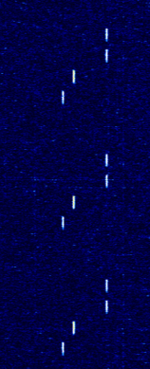 |
||
| Rain Master sprinkler control | Control signal for grass sprinkler watering system | 154.6 MHzMegaHertz (MHz) 10^6 Hz | FMFrequency Modulation | FSKFrequency-Shift Keying | 12 kHzKiloHertz (kHz) 10^3 Hz | Worldwide | 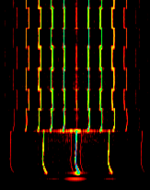 |
|
| ReFLEX | ReFLEX is a two-way paging variant of FLEX. | 896 MHzMegaHertz (MHz) 10^6 Hz — 941 MHzMegaHertz (MHz) 10^6 Hz | NFMNarrowband Frequency Modulation | FFSKFast Frequency-Shift Keying | 40 kHzKiloHertz (kHz) 10^3 Hz | United States | 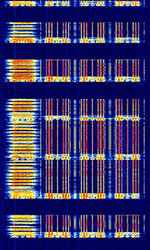 |
|
| Relocatable Over-the-Horizon Radar (ROTHR) | Relocatable Over-the-Horizon Radar (ROTHR), also known as AN/TPS-71, is an OTHOver The Horizon (very long range) Radar used by the United States Navy that uses bistatic ionospheric backscattering for wide area surveillance. | 5 MHzMegaHertz (MHz) 10^6 Hz — 28 MHzMegaHertz (MHz) 10^6 Hz | USBUpper Side Band Modulation (Radio, referring to reception and modulation mode)Universal Serial Bus (Computer, referring to USB Ports and cables) | FMCW | 4 kHzKiloHertz (kHz) 10^3 Hz — 100 kHzKiloHertz (kHz) 10^3 Hz | United States | 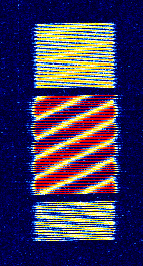 |
|
| Robust PACKET | Robust PACKET, also known as HFHigh Frequency (3-30 MHz)-APRSAutomatic Packet Reporting System, an amateur radio-based system for real time tactical digital communications of information of immediate value in the local area, RPR, Winlink RMS, and APRSlink, is an OFDMOrthogonal Frequency-Division Multiplexing version of the amateur mode PACKET which is optimized for shortwave use. This mode was developed by Spezielle Communications Systeme GmbH & Co. KG (SCS). | 3.61 MHzMegaHertz (MHz) 10^6 Hz — 14.103 MHzMegaHertz (MHz) 10^6 Hz | USBUpper Side Band Modulation (Radio, referring to reception and modulation mode)Universal Serial Bus (Computer, referring to USB Ports and cables) | PSKPhase-Shift Keying, OFDMOrthogonal Frequency-Division Multiplexing | 500 HzHertz (Hz), unit of frequency, defined as one cycle per second (1 Hz). | Worldwide | 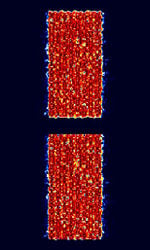 |
|
| Russian Intelligence 200bd 1000Hz FSK (F06) | Also known as F06, this is a one-way error-correcting broadcast system, used by one of Russian intelligence agencies for delivery of messages to their operatives abroad on fixed schedules. | 4 MHzMegaHertz (MHz) 10^6 Hz — 23 MHzMegaHertz (MHz) 10^6 Hz | USBUpper Side Band Modulation (Radio, referring to reception and modulation mode)Universal Serial Bus (Computer, referring to USB Ports and cables) | FSKFrequency-Shift Keying | 1 kHzKiloHertz (kHz) 10^3 Hz | Russia | 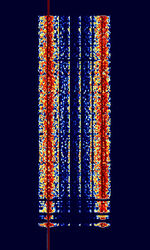 |
|
| Russian Intelligence 200bd 500Hz FSK (F01) | Also known as F01, this is a digital FSKFrequency-Shift Keying mode used by Russian intelligence to deliver encrypted messages to their operatives abroad. Transmissions usually happen on fixed schedules. | 4 MHzMegaHertz (MHz) 10^6 Hz — 23 MHzMegaHertz (MHz) 10^6 Hz | USBUpper Side Band Modulation (Radio, referring to reception and modulation mode)Universal Serial Bus (Computer, referring to USB Ports and cables) | FSKFrequency-Shift Keying | 500 HzHertz (Hz), unit of frequency, defined as one cycle per second (1 Hz). | Russia |  |
|
| Russian MFSK-OFDM-chirp hybrid modem | A supposedly Russian HFHigh Frequency (3-30 MHz) data mode with MFSKMultiple Frequency Shift-Keying, OFDMOrthogonal Frequency-Division Multiplexing and frequency sweeps, resulting in an interesting spectrogram and sound. | 12.176 MHzMegaHertz (MHz) 10^6 Hz — 16.259 MHzMegaHertz (MHz) 10^6 Hz | USBUpper Side Band Modulation (Radio, referring to reception and modulation mode)Universal Serial Bus (Computer, referring to USB Ports and cables) | MFSKMultiple Frequency Shift-Keying, OFDMOrthogonal Frequency-Division Multiplexing, FMFrequency Modulation, FMCW | 3 kHzKiloHertz (kHz) 10^3 Hz — 96 kHzKiloHertz (kHz) 10^3 Hz | Russia, Worldwide | 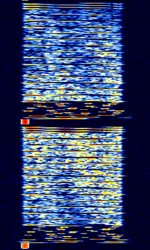 |
|
| Russian overhead power line telemetry system | Russian telemetry system, transmitted over the overhead power lines. | 50 kHzKiloHertz (kHz) 10^3 Hz — 1 MHzMegaHertz (MHz) 10^6 Hz | USBUpper Side Band Modulation (Radio, referring to reception and modulation mode)Universal Serial Bus (Computer, referring to USB Ports and cables) | FSKFrequency-Shift Keying | 400 HzHertz (Hz), unit of frequency, defined as one cycle per second (1 Hz). | Russia | 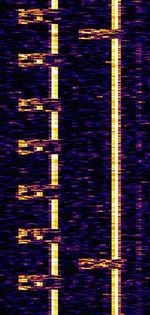 |
|
| S-Band Jammer | This is what the signal of a military S-Band (In this case 2.4 GHzGigaHertz (GHz) 10^9 Hz) RADAR and WiFi intentional interference (Jamming) device looks like. This signal is generated by a DDS system and is then used to modulate the output of a 2.45 GHzGigaHertz (GHz) 10^9 Hz magnetron (The same as in a microwave oven). | 2,400 MHzMegaHertz (MHz) 10^6 Hz | Noise | 100 kHzKiloHertz (kHz) 10^3 Hz — 100 MHzMegaHertz (MHz) 10^6 Hz | Worldwide | — |  |
|
| SAS/SRC | Swedish navy transmitter for submarine communication. It shares the antenna with SAQ (Grimeton Radio) | 40.4 kHzKiloHertz (kHz) 10^3 Hz | MSKMinimum-Shift Keying (When Shift/Bd = 0.5. It is impossible to get this ratio to be lower than 0.5, hence it is called the 'Minimum' shift.) | Sweden | 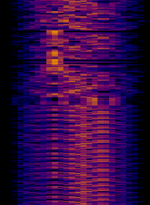 |
|||
| SAS2 | Swedish navy transmitter for submarine communication. It shares the antenna with SAQ (Grimeton Radio) and is activated less often as the other Swedish transmitters used for VLFVery Low Frequency (3-30 kHz) submarine communication. Usually, it works with reduced power. | 42.5 kHzKiloHertz (kHz) 10^3 Hz | MSKMinimum-Shift Keying (When Shift/Bd = 0.5. It is impossible to get this ratio to be lower than 0.5, hence it is called the 'Minimum' shift.) | Sweden | 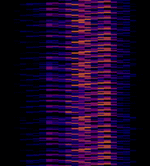 |
|||
| SAS3 | Swedish navy transmitter for submarine communication. It shares the antenna with SAQ (Grimeton Radio). | 44.2 kHzKiloHertz (kHz) 10^3 Hz | MSKMinimum-Shift Keying (When Shift/Bd = 0.5. It is impossible to get this ratio to be lower than 0.5, hence it is called the 'Minimum' shift.) | Sweden | 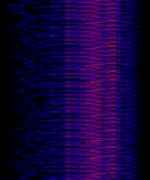 |
|||
| SECOR 4 (EGRS 4) | SECOR 4 (COSPAR ID: 1965-027B) was a SEquential COllation of Range series satellite, and is occasionally active when receiving adequate solar power on it's panels. It is not consistent, likely owing to a tumbling or rotating motion. | 136.845 MHzMegaHertz (MHz) 10^6 Hz | USBUpper Side Band Modulation (Radio, referring to reception and modulation mode)Universal Serial Bus (Computer, referring to USB Ports and cables) | IRIG | 2 kHzKiloHertz (kHz) 10^3 Hz | 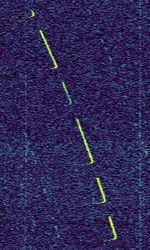 |
||
| SHR | Swedish navy transmitter for submarine communication. It shares the antenna with SAQ (Grimeton Radio). | 38 kHzKiloHertz (kHz) 10^3 Hz | MSKMinimum-Shift Keying (When Shift/Bd = 0.5. It is impossible to get this ratio to be lower than 0.5, hence it is called the 'Minimum' shift.) | Sweden | 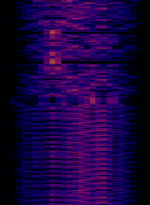 |
|||
| SIGFOX | SIGFOX is a IoTInternet of Things wireless network system utilizing ETSIEuropean Telecommunications Standards Institute. An independent, not-for-profit, standardization organization in the telecommunications industry in Europe, developing global telecommunications standards.'s specification for Low Throughput Networks (LTN) and Ultra Narrow-Band (UNB) modulation. | 868 MHzMegaHertz (MHz) 10^6 Hz — 868.6 MHzMegaHertz (MHz) 10^6 Hz | RAW | BPSKBinary Phase-Shift Keying (1 bit per symbol) | 200 kHzKiloHertz (kHz) 10^3 Hz | Worldwide | 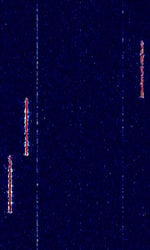 |
|
| SIMONe meteor radar | The SIMONe radar is a meteor detection system that is operated in multiple research sites around the world. It uses continuous spread-spectrum coded transmissions which gives it an unusual sound when demodulated into audio. It can be received over long distances during sporadic-E and other special propagation conditions. | 32.55 MHzMegaHertz (MHz) 10^6 Hz | AMAmplitude Modulation | PSKPhase-Shift Keying, DSSS | 140 kHzKiloHertz (kHz) 10^3 Hz | Worldwide | 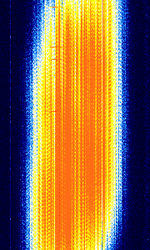 |
|
| SITOR-A | SITOR-A (Also known as AMTOR-A) is one of two modes of SITOR, which stands for Simplex Teletype Over Radio. | 3 MHzMegaHertz (MHz) 10^6 Hz — 30 MHzMegaHertz (MHz) 10^6 Hz | USBUpper Side Band Modulation (Radio, referring to reception and modulation mode)Universal Serial Bus (Computer, referring to USB Ports and cables) | FSKFrequency-Shift Keying | 350 HzHertz (Hz), unit of frequency, defined as one cycle per second (1 Hz). | Worldwide | 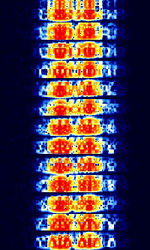 |
|
| SITOR-B | SITOR-B is one of two modes of SITOR (Simplex Teletype Over Radio). | 3 MHzMegaHertz (MHz) 10^6 Hz — 30 MHzMegaHertz (MHz) 10^6 Hz | USBUpper Side Band Modulation (Radio, referring to reception and modulation mode)Universal Serial Bus (Computer, referring to USB Ports and cables) | FSKFrequency-Shift Keying | 350 HzHertz (Hz), unit of frequency, defined as one cycle per second (1 Hz). | Worldwide | 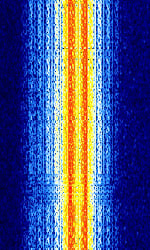 |
|
| SKiYMET meteor radar | SKiYMET is a meteor detection radar which is used by many research institutes around the world. It can use different transmission parameters and can be received over long distances during sporadic-E and other special propagation conditions. | 29 MHzMegaHertz (MHz) 10^6 Hz — 40 MHzMegaHertz (MHz) 10^6 Hz | AMAmplitude Modulation | Pulsed | 160 kHzKiloHertz (kHz) 10^3 Hz | Worldwide | 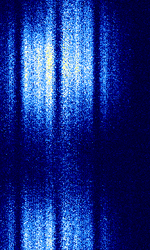 |
|
| SNOTEL (Snow Telemetry) | SNOTEL stations are a set of precipitation and other sensors spread across the mountains of the United States by the Department of Agriculture through the National Resources Conservation Service. | 40.67 MHzMegaHertz (MHz) 10^6 Hz | NFMNarrowband Frequency Modulation | PSKPhase-Shift Keying | 9 kHzKiloHertz (kHz) 10^3 Hz | United States | 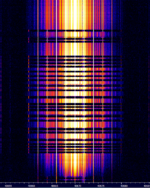 |
|
| SNOTEL (Snow Telemetry) | SNOTEL stations are a set of precipitation and other sensors spread across the mountains of the United States by the Department of Agriculture through the National Resources Conservation Service. | 40.67 MHzMegaHertz (MHz) 10^6 Hz | NFMNarrowband Frequency Modulation | PSKPhase-Shift Keying | 9 kHzKiloHertz (kHz) 10^3 Hz | United States |  |
|
| STANAG 4197 | STANAGNATO Standardization Agreement (STANAG), defines processes, procedures, terms, and conditions for common military or technical procedures or equipment between the member countries of the North Atlantic Treaty Organization (NATO). 4197 is a NATONorth Atlantic Treaty Organization QPSKQuadrature Phase-Shift Keying (2 bits per symbol) OFDMOrthogonal Frequency-Division Multiplexing signal used in ANDVT modems that transmit encrypted digital voice over HFHigh Frequency (3-30 MHz). | 3 MHzMegaHertz (MHz) 10^6 Hz — 30 MHzMegaHertz (MHz) 10^6 Hz | USBUpper Side Band Modulation (Radio, referring to reception and modulation mode)Universal Serial Bus (Computer, referring to USB Ports and cables) | PSKPhase-Shift Keying, OFDMOrthogonal Frequency-Division Multiplexing | 2.3 kHzKiloHertz (kHz) 10^3 Hz | Worldwide | 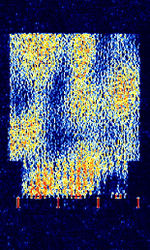 |
|
| STANAG 4285 | STANAGNATO Standardization Agreement (STANAG), defines processes, procedures, terms, and conditions for common military or technical procedures or equipment between the member countries of the North Atlantic Treaty Organization (NATO). 4285 is specified by the NATONorth Atlantic Treaty Organization (North Atlantic Treaty Organization) Military Agency for Standardization in "Characteristics of 1200 / 2400 / 3600 Bits per Second Single Tone Modulators / Demodulators for HFHigh Frequency (3-30 MHz) Radio Links" | 1.89 MHzMegaHertz (MHz) 10^6 Hz — 22.7 MHzMegaHertz (MHz) 10^6 Hz | USBUpper Side Band Modulation (Radio, referring to reception and modulation mode)Universal Serial Bus (Computer, referring to USB Ports and cables) | PSKPhase-Shift Keying | 2.75 kHzKiloHertz (kHz) 10^3 Hz | Worldwide | 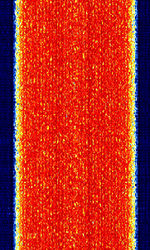 |
|
| STANAG 4481 | STANAGNATO Standardization Agreement (STANAG), defines processes, procedures, terms, and conditions for common military or technical procedures or equipment between the member countries of the North Atlantic Treaty Organization (NATO). 4481, also known as CRATT, Link-4, and NATONorth Atlantic Treaty Organization-75, is specified by the NATONorth Atlantic Treaty Organization (North Atlantic Treaty Organization) Military Agency for Standardization as a "Minimum technical equipment standards for naval HFHigh Frequency (3-30 MHz) shore-to-ship broadcast system" | 2.815 MHzMegaHertz (MHz) 10^6 Hz — 18.016 MHzMegaHertz (MHz) 10^6 Hz | USBUpper Side Band Modulation (Radio, referring to reception and modulation mode)Universal Serial Bus (Computer, referring to USB Ports and cables) | FSKFrequency-Shift Keying, PSKPhase-Shift Keying | 1.5 kHzKiloHertz (kHz) 10^3 Hz — 2.75 kHzKiloHertz (kHz) 10^3 Hz | Worldwide | 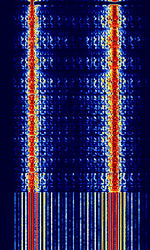 |
|
| STANAG 4529 | STANAGNATO Standardization Agreement (STANAG), defines processes, procedures, terms, and conditions for common military or technical procedures or equipment between the member countries of the North Atlantic Treaty Organization (NATO). 4529 a modification of STANAGNATO Standardization Agreement (STANAG), defines processes, procedures, terms, and conditions for common military or technical procedures or equipment between the member countries of the North Atlantic Treaty Organization (NATO). 4285 to deliver data and voice in 1240 HzHertz (Hz), unit of frequency, defined as one cycle per second (1 Hz). of bandwidth at rates of up to 1800 bpsBits per second (bps). | 3 MHzMegaHertz (MHz) 10^6 Hz — 30 MHzMegaHertz (MHz) 10^6 Hz | USBUpper Side Band Modulation (Radio, referring to reception and modulation mode)Universal Serial Bus (Computer, referring to USB Ports and cables) | PSKPhase-Shift Keying, BPSKBinary Phase-Shift Keying (1 bit per symbol), QPSKQuadrature Phase-Shift Keying (2 bits per symbol), 8PSK8-Phase Phase-Shift Keying (3 bits per symbol) | 1.24 kHzKiloHertz (kHz) 10^3 Hz | Worldwide | 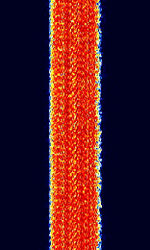 |
|
| STANAG 4539 | STANAGNATO Standardization Agreement (STANAG), defines processes, procedures, terms, and conditions for common military or technical procedures or equipment between the member countries of the North Atlantic Treaty Organization (NATO). 4539 or MIL-STD-188-110B/C Appendix C is a HDR (110B) / MDR (110C) serial PSKPhase-Shift Keying/QAMQuadrature Amplitude Modulation signal that can reach speeds up to 9600 bpsBits per second (bps) (12800 bpsBits per second (bps) with no interleaving). | 3 MHzMegaHertz (MHz) 10^6 Hz — 30 MHzMegaHertz (MHz) 10^6 Hz | USBUpper Side Band Modulation (Radio, referring to reception and modulation mode)Universal Serial Bus (Computer, referring to USB Ports and cables) | PSKPhase-Shift Keying, QAMQuadrature Amplitude Modulation, QPSKQuadrature Phase-Shift Keying (2 bits per symbol) | 3 kHzKiloHertz (kHz) 10^3 Hz | Worldwide | 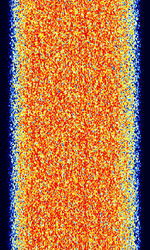 |
|
| STANAG 5065 | STANAGNATO Standardization Agreement (STANAG), defines processes, procedures, terms, and conditions for common military or technical procedures or equipment between the member countries of the North Atlantic Treaty Organization (NATO). 5065 is defined as "Minimum Standards for Naval Low Frequency (LFLow Frequency (30-300 kHz)) Shore-To-Ship Surface Broadcast Systems", with two primary protocols, FSK75 and MSK300. | 50 kHzKiloHertz (kHz) 10^3 Hz — 160 kHzKiloHertz (kHz) 10^3 Hz | USBUpper Side Band Modulation (Radio, referring to reception and modulation mode)Universal Serial Bus (Computer, referring to USB Ports and cables) | FSKFrequency-Shift Keying, MSKMinimum-Shift Keying (When Shift/Bd = 0.5. It is impossible to get this ratio to be lower than 0.5, hence it is called the 'Minimum' shift.) | 235 HzHertz (Hz), unit of frequency, defined as one cycle per second (1 Hz). — 360 HzHertz (Hz), unit of frequency, defined as one cycle per second (1 Hz). | Worldwide | 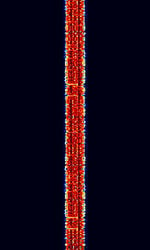 |
|
| STP403 Bus PIT System | STP403 is a bus PITPassenger Information Terminals, such as bus timetable displays at bus stops system used to update digital displays at bus stops. STP403 was developed by French companies INEO and CESATEC. | 164 MHzMegaHertz (MHz) 10^6 Hz — 468.488 MHzMegaHertz (MHz) 10^6 Hz | NFMNarrowband Frequency Modulation | FFSKFast Frequency-Shift Keying | 8 kHzKiloHertz (kHz) 10^3 Hz | France | 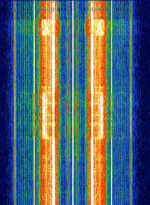 |
|
| Saab Grintek MHF-50 MFSK Modem | The MHF-50 MFSKMultiple Frequency Shift-Keying Modem by Saab Grintek Technologies in South Africa is a data modem that utilizes RTTYRadio TeleTYpe, 2-FSKFrequency-Shift Keying, and 33-MFSKMultiple Frequency Shift-Keying to transmit data | 4.245 MHzMegaHertz (MHz) 10^6 Hz — 12.982 MHzMegaHertz (MHz) 10^6 Hz | USBUpper Side Band Modulation (Radio, referring to reception and modulation mode)Universal Serial Bus (Computer, referring to USB Ports and cables) | MFSKMultiple Frequency Shift-Keying, FSKFrequency-Shift Keying | 2.2 kHzKiloHertz (kHz) 10^3 Hz | South Africa | 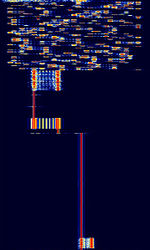 |
|
| Secondary surveillance radar (SSR) | Secondary surveillance radar (SSR)is a radar system used in air traffic control. A surveillance radar system which uses transmitters/receivers (interrogators) and transponders. | 1,030 MHzMegaHertz (MHz) 10^6 Hz | RAW | PPMPulse Position Modulation | 3 MHzMegaHertz (MHz) 10^6 Hz | Worldwide | 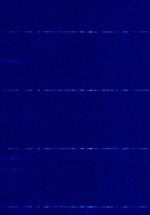 |
|
| Sensus Water meter (Acquisition units) | These are samples from the Sensus Water meters. They are a FHSS ASKAmplitude-Shift Keying encoded data transmission for purposes of providing municipalities water meter telemetry (for billing how much water you use). | 902 MHzMegaHertz (MHz) 10^6 Hz — 927 MHzMegaHertz (MHz) 10^6 Hz | ASKAmplitude-Shift Keying, FHSS | 175 MHzMegaHertz (MHz) 10^6 Hz | Worldwide | — | 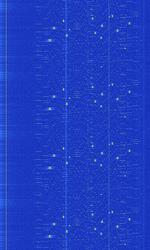 |
|
| Serdolik | Serdolik is a MFSKMultiple Frequency Shift-Keying signal used by the Russian diplomatic service. | 3 MHzMegaHertz (MHz) 10^6 Hz — 30 MHzMegaHertz (MHz) 10^6 Hz | USBUpper Side Band Modulation (Radio, referring to reception and modulation mode)Universal Serial Bus (Computer, referring to USB Ports and cables) | MFSKMultiple Frequency Shift-Keying | 1.4 kHzKiloHertz (kHz) 10^3 Hz | Russia | 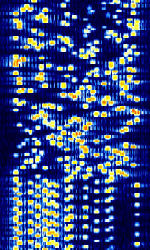 |
|
| Siemens 1.5T MRI Scanner | Radio signal used by MRI machines to excite protons and obtain their response. | 64 MHzMegaHertz (MHz) 10^6 Hz | Worldwide | 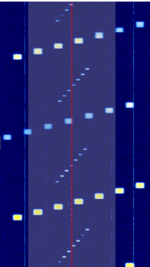 |
||||
| Siemens CHX-200 FSK Modem | CHX200, also known as Siemens CHP200 and PRC-921/GY, is a backpack HFHigh Frequency (3-30 MHz) ECCOM transceiver, designed and built by Siemens. | 1.5 MHzMegaHertz (MHz) 10^6 Hz — 30 MHzMegaHertz (MHz) 10^6 Hz | USBUpper Side Band Modulation (Radio, referring to reception and modulation mode)Universal Serial Bus (Computer, referring to USB Ports and cables) | FSKFrequency-Shift Keying | 300 HzHertz (Hz), unit of frequency, defined as one cycle per second (1 Hz). | Worldwide | 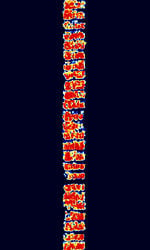 |
|
| Single Sideband Voice | Single-sideband voice is a subtype of AMAmplitude Modulation voice modulation. It is used in HFHigh Frequency (3-30 MHz) amateur bands and for weak signal VHFVery High Frequency (30-300 MHz) and UHFUltra High Frequency (300-3000 MHz) voice, as well as aircraft weather reports. | 3 MHzMegaHertz (MHz) 10^6 Hz — 30 MHzMegaHertz (MHz) 10^6 Hz | SSBSingle-sideband modulation | AMAmplitude Modulation | 1.9 kHzKiloHertz (kHz) 10^3 Hz | Worldwide | 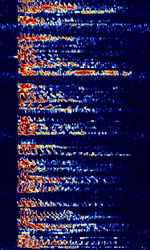 |
|
| Single frequency russian overhead power line telemetry system | Russian telemetry system, transmitted over the overhead power lines. | 50 kHzKiloHertz (kHz) 10^3 Hz — 1 MHzMegaHertz (MHz) 10^6 Hz | SSBSingle-sideband modulation | AMAmplitude Modulation | 300 HzHertz (Hz), unit of frequency, defined as one cycle per second (1 Hz). | Russia | 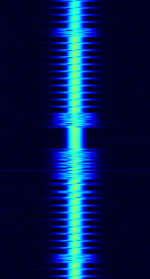 |
|
| SiriusXM Satellite Radio | SiriusXM Satellite Radio: Terrestrial Repeater Signal | 2,332.5 MHzMegaHertz (MHz) 10^6 Hz — 2,345 MHzMegaHertz (MHz) 10^6 Hz | RAW | OFDMOrthogonal Frequency-Division Multiplexing, PSKPhase-Shift Keying | 12.5 MHzMegaHertz (MHz) 10^6 Hz | United States | 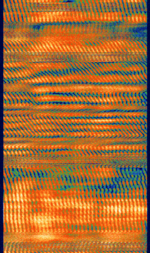 |
|
| SkyOFDM | Data transmission mode developed by SkySweep Technologies in Finland. Probably used by Finnish MFA | 3 MHzMegaHertz (MHz) 10^6 Hz — 30 MHzMegaHertz (MHz) 10^6 Hz | USBUpper Side Band Modulation (Radio, referring to reception and modulation mode)Universal Serial Bus (Computer, referring to USB Ports and cables) | PSKPhase-Shift Keying, OFDMOrthogonal Frequency-Division Multiplexing | 2 kHzKiloHertz (kHz) 10^3 Hz — 2.4 kHzKiloHertz (kHz) 10^3 Hz | Finland | 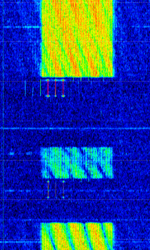 |
|
| Slow-Scan Television (SSTV) | Slow-scan television (SSTV) is a method for picture transmission used by amateur radio operators to transmit and receive images. | 3 MHzMegaHertz (MHz) 10^6 Hz — 450 MHzMegaHertz (MHz) 10^6 Hz | USBUpper Side Band Modulation (Radio, referring to reception and modulation mode)Universal Serial Bus (Computer, referring to USB Ports and cables), LSBLower Side Band Modulation, NFMNarrowband Frequency Modulation | FMFrequency Modulation | 3 kHzKiloHertz (kHz) 10^3 Hz | Worldwide | 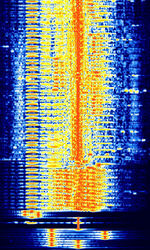 |
|
| Snap Circuits SCROV-10 Remote Control | A remote control transmission from the controller from an Elenco Snap Circuits SCROV-10 kit. | 27.145 MHzMegaHertz (MHz) 10^6 Hz | RAW | ASKAmplitude-Shift Keying | 6 kHzKiloHertz (kHz) 10^3 Hz | 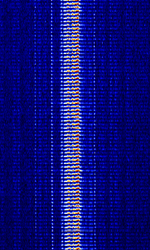 |
||
| Soyuz-MS spacecraft telemetry | Russian spacecraft telemetry system. | 166 MHzMegaHertz (MHz) 10^6 Hz — 634 MHzMegaHertz (MHz) 10^6 Hz | USBUpper Side Band Modulation (Radio, referring to reception and modulation mode)Universal Serial Bus (Computer, referring to USB Ports and cables) | PCM, FMFrequency Modulation | 250 kHzKiloHertz (kHz) 10^3 Hz | Worldwide | 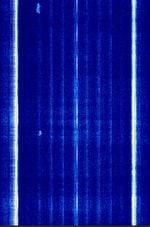 |
|
| SuperDARN (Super Dual Auroral Radar Network) | SuperDARN (Super Dual Auroral Radar Network) is an international radar network used for scientific purposes. The network is used to study plasma convection in the upper atmosphere. | 9 MHzMegaHertz (MHz) 10^6 Hz — 16 MHzMegaHertz (MHz) 10^6 Hz | USBUpper Side Band Modulation (Radio, referring to reception and modulation mode)Universal Serial Bus (Computer, referring to USB Ports and cables) | PPMPulse Position Modulation | 6 kHzKiloHertz (kHz) 10^3 Hz | Worldwide | 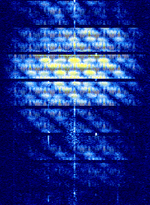 |
|
| Supervisory Control And Data Acquisition (SCADA) | Supervisory Control And Data Acquisition (SCADA) is a control system architecture that is used in industrial applications for computerized automated systems. Wireless telemetry is used on RTU's to send data to control units for operators to utilize. | 413 MHzMegaHertz (MHz) 10^6 Hz — 950 MHzMegaHertz (MHz) 10^6 Hz | FMFrequency Modulation | FSKFrequency-Shift Keying | 12 kHzKiloHertz (kHz) 10^3 Hz | 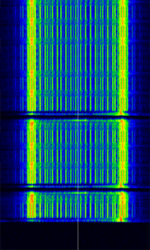 |
||
| Switching Electronic Interference | Commonly experienced interfering RFRadio Frequency emissions from switching electronics (i.e. switched-mode power supplies, power converters, digital electronics, etc.) which use inductors (coils) that unintentionally act as antennas. | 10 kHzKiloHertz (kHz) 10^3 Hz — 200 MHzMegaHertz (MHz) 10^6 Hz | Worldwide | 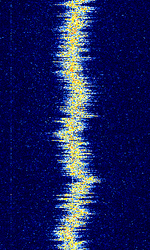 |
||||
| TDF | TDF, also known as ALS162, is a time signal transmitted on the former carrier of France's France Inter longwave AMAmplitude Modulation radio station on 162 kHzKiloHertz (kHz) 10^3 Hz. | 162 kHzKiloHertz (kHz) 10^3 Hz | USBUpper Side Band Modulation (Radio, referring to reception and modulation mode)Universal Serial Bus (Computer, referring to USB Ports and cables) | PSKPhase-Shift Keying | 1 HzHertz (Hz), unit of frequency, defined as one cycle per second (1 Hz). | France | 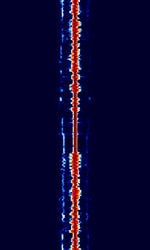 |
|
| Tactical Air Navigation System (TACAN) | Radio navigation technology that measures the slant range (distance) between an aircraft and a ground station by timing the propagation delay of radio signals. | 960 MHzMegaHertz (MHz) 10^6 Hz — 1,213 MHzMegaHertz (MHz) 10^6 Hz | PAMPulse Amplitude Modulation | Worldwide |  |
|||
| Terrestrial Trunked Radio (TETRA) | TETRA is a professional mobile radio and two-way transceiver (walkie-talkie) specification | 380 MHzMegaHertz (MHz) 10^6 Hz — 860 MHzMegaHertz (MHz) 10^6 Hz | NFMNarrowband Frequency Modulation | PSKPhase-Shift Keying | 25 kHzKiloHertz (kHz) 10^3 Hz | Worldwide | 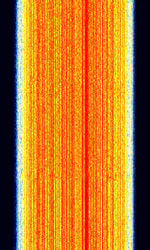 |
|
| Tetrapol | Tetrapol is a digital professional mobile radio standard for digital voice and data communication used by public safety and military throughout Europe. Tetrapol was originally developed by Matra Communication (Currently part of EADS/Airbus Group) in France in the 1980's. | 370 MHzMegaHertz (MHz) 10^6 Hz — 400 MHzMegaHertz (MHz) 10^6 Hz | NFMNarrowband Frequency Modulation | GMSKGaussian Minimum-Shift Keying | 10 kHzKiloHertz (kHz) 10^3 Hz — 12.5 kHzKiloHertz (kHz) 10^3 Hz | Europe | 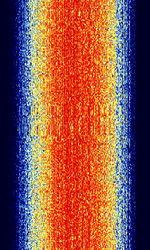 |
|
| Thales SALAMANDRE (HFXL) | Thales SALAMANDRE (using HFXL waveform) uses up to 16 separate contiguous or not-contiguous narrowband HFHigh Frequency (3-30 MHz) channels for high datarate military and tactical communications. Operates on a modified STANAGNATO Standardization Agreement (STANAG), defines processes, procedures, terms, and conditions for common military or technical procedures or equipment between the member countries of the North Atlantic Treaty Organization (NATO).-4539 platform. | 3 MHzMegaHertz (MHz) 10^6 Hz — 30 MHzMegaHertz (MHz) 10^6 Hz | USBUpper Side Band Modulation (Radio, referring to reception and modulation mode)Universal Serial Bus (Computer, referring to USB Ports and cables) | PSKPhase-Shift Keying | 150 kHzKiloHertz (kHz) 10^3 Hz | Worldwide | 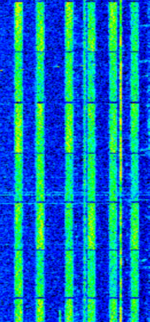 |
|
| Thales Système 3000 HF Modem | Thales Système 3000 is a HFHigh Frequency (3-30 MHz) modem capable of many different modes of transmission. It has a unique preamble and format to it's signals. | 1.5 MHzMegaHertz (MHz) 10^6 Hz — 30 MHzMegaHertz (MHz) 10^6 Hz | USBUpper Side Band Modulation (Radio, referring to reception and modulation mode)Universal Serial Bus (Computer, referring to USB Ports and cables) | PSKPhase-Shift Keying, MFSKMultiple Frequency Shift-Keying | 2 kHzKiloHertz (kHz) 10^3 Hz — 3 kHzKiloHertz (kHz) 10^3 Hz | Worldwide | 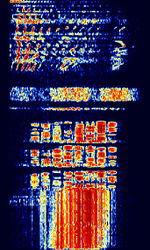 |
|
| The Buzzer (ZhUOZ MDZhB UZB76) | The Buzzer, call-sign NZhTI (formerly ANVF, ZhUOZ, MDZhB and UZB-76), is a Russian Military Commandment system signal used to broadcast diplomatic ciphered messages known as "monolit" to the russian navy. If there is no message to broadcast, its "homing" signal is a loud ship-horn buzzing sound. It is believed to serve a similar purposes to The Alarm and The Air Horn. | 4.625 MHzMegaHertz (MHz) 10^6 Hz | AMAmplitude Modulation | USBUpper Side Band Modulation (Radio, referring to reception and modulation mode)Universal Serial Bus (Computer, referring to USB Ports and cables) | 2.8 kHzKiloHertz (kHz) 10^3 Hz | Russia | 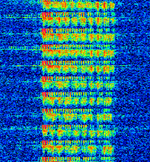 |
|
| The Pip | The Pip is the nickname given by radio listeners to a shortwave radio station that broadcasts on the frequency 5448 kHzKiloHertz (kHz) 10^3 Hz by day, and 3756 kHzKiloHertz (kHz) 10^3 Hz during the night. It broadcasts short, repeated beeps at a rate of around 50 per minute, for 24 hours per day. The beep signal is occasionally interrupted by voice messages in Russian. The Pip has been active since around 1986 when its distinctive beeping sound was first recorded by listeners. While its official name or callsign is not known, some of the voice transmissions begin with the code 8S1Shch (Cyrillic: 8С1Щ), which is generally considered to be the name of the station. However, this code may not be a callsign, but instead, serve some other purpose. Radioscanner.ru identifies the owner of this station as a North-Caucasian military district communication center with callsign "Akacia" (ex-72nd communication center, Russian "72 узел связи штаба СКВО") | 3.756 MHzMegaHertz (MHz) 10^6 Hz — 5.448 MHzMegaHertz (MHz) 10^6 Hz | USBUpper Side Band Modulation (Radio, referring to reception and modulation mode)Universal Serial Bus (Computer, referring to USB Ports and cables),AMAmplitude Modulation | Russia |  |
|||
| Tire Pressure Monitoring System (TPMS) | TPMS (Tire-Pressure Monitoring System), more specifically Direct TPMS (dTPMS), is a system that uses pressure sensors to monitor tire pressure on vehicles. | 315 MHzMegaHertz (MHz) 10^6 Hz — 434 MHzMegaHertz (MHz) 10^6 Hz | AMAmplitude Modulation | FSKFrequency-Shift Keying | 100 kHzKiloHertz (kHz) 10^3 Hz | Worldwide | 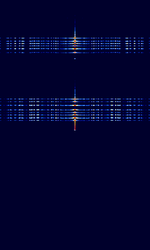 |
|
| Toyota Car Key | Wireless entry rolling code car key. | 315 MHzMegaHertz (MHz) 10^6 Hz — 433 MHzMegaHertz (MHz) 10^6 Hz | AMAmplitude Modulation | 40 kHzKiloHertz (kHz) 10^3 Hz | Worldwide | 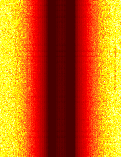 |
||
| Transit 5B-5 | Transit 5B-5, a former TRANSIT navigation satellite, is the oldest satellite known to still transmit a signal. Considered "dead" because its navigational systems failed after 19 days of operation, it still emits a telemetry signal when illuminated. | 136.658 MHzMegaHertz (MHz) 10^6 Hz | WFMWideband Frequency Modulation | PCM, PAMPulse Amplitude Modulation, FMFrequency Modulation, PM | 32 kHzKiloHertz (kHz) 10^3 Hz | Worldwide | 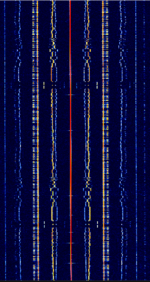 |
|
| UK AM Data System (UK-AMDS) | UK AMAmplitude Modulation Data System (UK-AMDS) was developed by BBC Research and Development in 1984 as a way to transmit low bitrate data on BBC Radio 4's LFLow Frequency (30-300 kHz) AMAmplitude Modulation carrier. Elements of this system were adopted into ETSIEuropean Telecommunications Standards Institute. An independent, not-for-profit, standardization organization in the telecommunications industry in Europe, developing global telecommunications standards.'s AMSS. | 198 kHzKiloHertz (kHz) 10^3 Hz | SSBSingle-sideband modulation | AMAmplitude Modulation, PSKPhase-Shift Keying | 85 HzHertz (Hz), unit of frequency, defined as one cycle per second (1 Hz). | United Kingdom | 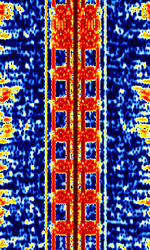 |
|
| UK GOV MIL WINDRM51 | UK GOV/MIL "WinDRM51" variant. Unknown purpose, But link between UK & Cyprus has been found some years ago. | 9.104 MHzMegaHertz (MHz) 10^6 Hz — 13.451 MHzMegaHertz (MHz) 10^6 Hz | USBUpper Side Band Modulation (Radio, referring to reception and modulation mode)Universal Serial Bus (Computer, referring to USB Ports and cables) | OFDMOrthogonal Frequency-Division Multiplexing | 2.5 kHzKiloHertz (kHz) 10^3 Hz | Europe | 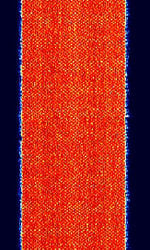 |
|
| UTC (Coordinated Universal Time) Time Standard | UTC (Coordinated Universal Time) time standard transmission from NIST (National Institute of Standards and Technology) stations WWV in Fort Collins, Colorado USA (2.5, 5, 10, 15, 20, 25 MHzMegaHertz (MHz) 10^6 Hz) and WWVH in Kauai, Hawaii (2.5, 5, 10, 15 MHzMegaHertz (MHz) 10^6 Hz). | 2.5 MHzMegaHertz (MHz) 10^6 Hz — 25 MHzMegaHertz (MHz) 10^6 Hz | AMAmplitude Modulation | 4 kHzKiloHertz (kHz) 10^3 Hz | United States | 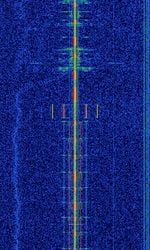 |
||
| Ultra Low Latency (ULL) Electronic Trading Network | A 48k or 24k baudBaud (unit symbol Bd) is the unit for symbol rate or modulation rate in symbols per second. OQPSK signal that is strongly suspected (through numerous circumstantial pieces of evidence) to be either an experimental or active P2P RFRadio Frequency link between financial market data centers, used for High Frequency Trading (HFT) and other latency-sensitive market activities. | 6 MHzMegaHertz (MHz) 10^6 Hz — 20 MHzMegaHertz (MHz) 10^6 Hz | RAW | OQPSK | 30 kHzKiloHertz (kHz) 10^3 Hz — 60 kHzKiloHertz (kHz) 10^3 Hz | United States | 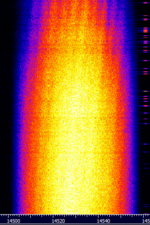 |
|
| VARA HF | VARA HFHigh Frequency (3-30 MHz) is a sound-card mode used to exchange traffic (Mostly Winlink traffic) on the HFHigh Frequency (3-30 MHz) bands | 1.8 MHzMegaHertz (MHz) 10^6 Hz — 54 MHzMegaHertz (MHz) 10^6 Hz | USBUpper Side Band Modulation (Radio, referring to reception and modulation mode)Universal Serial Bus (Computer, referring to USB Ports and cables) | BPSKBinary Phase-Shift Keying (1 bit per symbol), 4-8PSK8-Phase Phase-Shift Keying (3 bits per symbol), 16-32QAM, FSKFrequency-Shift Keying | 2.75 kHzKiloHertz (kHz) 10^3 Hz | Worldwide | 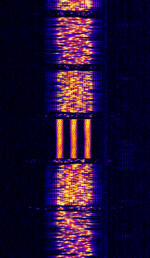 |
|
| VEZHA-S | Two-way 100 BdBaud (unit symbol Bd) is the unit for symbol rate or modulation rate in symbols per second./500 HzHertz (Hz), unit of frequency, defined as one cycle per second (1 Hz). Russian Telegraph system, attributed name VEZHA-C (Tower-S), usage claimed to be by Russian Ministry of Communications (MinComSvyaz Rossii). Possible usage in meteorology under callsign RWD59. | 2.755 MHzMegaHertz (MHz) 10^6 Hz — 12.165 MHzMegaHertz (MHz) 10^6 Hz | USBUpper Side Band Modulation (Radio, referring to reception and modulation mode)Universal Serial Bus (Computer, referring to USB Ports and cables) | FSKFrequency-Shift Keying | 650 HzHertz (Hz), unit of frequency, defined as one cycle per second (1 Hz). | Russia | 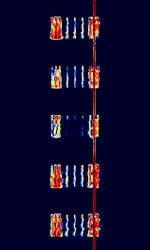 |
|
| VHF Data Link - Mode 2 (VDL-M2) | VDL-M2 (Known as VDL2 or VDLM2) is a means of sending information between aircraft and ground stations. VDL Mode 2 is the only VDL mode being implemented operationally to support Controller Pilot Data Link Communications (CPDLC). An extension to the AVLC protocol permits ACARS over AVLC (AOA) transmissions. VDL-M2 is implemented by Eurocontrol. | 117.975 MHzMegaHertz (MHz) 10^6 Hz — 137 MHzMegaHertz (MHz) 10^6 Hz | RAW | PSKPhase-Shift Keying | 25 kHzKiloHertz (kHz) 10^3 Hz | Worldwide | 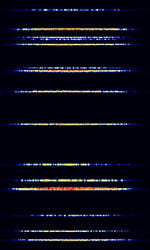 |
|
| VHF Omnidirectional Range (VOR) | A type of radio navigation system used by aircraft. It is distinctive in that the center frequency is flanked by two FMFrequency Modulation waves. | 108 MHzMegaHertz (MHz) 10^6 Hz — 117.95 MHzMegaHertz (MHz) 10^6 Hz | NFMNarrowband Frequency Modulation | AMAmplitude Modulation, FMFrequency Modulation | 21 kHzKiloHertz (kHz) 10^3 Hz | Worldwide | 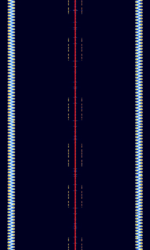 |
|
| Vaisala RS41-SG Weather Balloon (Radiosonde) | Weather balloon (radiosonde) telemetry data. | 400 MHzMegaHertz (MHz) 10^6 Hz — 406 MHzMegaHertz (MHz) 10^6 Hz | NFMNarrowband Frequency Modulation | GFSKGaussian Frequency-Shift Keying | 4.8 kHzKiloHertz (kHz) 10^3 Hz | Worldwide | 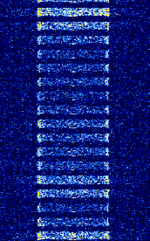 |
|
| Vaisala RS92-SGP Weather Balloon (Radiosonde) | Weather balloon (radiosonde) telemetry data. | 400.15 MHzMegaHertz (MHz) 10^6 Hz — 405.99 MHzMegaHertz (MHz) 10^6 Hz | NFMNarrowband Frequency Modulation | GFSKGaussian Frequency-Shift Keying | 10 kHzKiloHertz (kHz) 10^3 Hz | Worldwide | 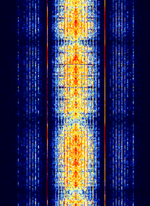 |
|
| Vehicle Counting System | Data transmitted from a vehicle counting system installed in car parks. The data is frequency hopping over 10 MHzMegaHertz (MHz) 10^6 Hz. | 915 MHzMegaHertz (MHz) 10^6 Hz — 925 MHzMegaHertz (MHz) 10^6 Hz | RAW | FSKFrequency-Shift Keying | 10 MHzMegaHertz (MHz) 10^6 Hz | Australia | — |  |
| Vietnamese Siren Jammer | Used to interrupt AMAmplitude Modulation boardcast stations such as Radio Free Asia, Radio Đáp Lời Song Núi as well as Radio Sweden. | 1 MHzMegaHertz (MHz) 10^6 Hz — 20 MHzMegaHertz (MHz) 10^6 Hz | USBUpper Side Band Modulation (Radio, referring to reception and modulation mode)Universal Serial Bus (Computer, referring to USB Ports and cables) | 2.7 MHzMegaHertz (MHz) 10^6 Hz | Worldwide |  |
||
| Visonic MCT-201 | MCT-201 is a Miniature Pendant PowerCode Wireless Transmitter by Visonic. It is designed for emergency and control applications in wireless security systems, and home automation and remote control systems. | 315 MHzMegaHertz (MHz) 10^6 Hz — 868 MHzMegaHertz (MHz) 10^6 Hz | USBUpper Side Band Modulation (Radio, referring to reception and modulation mode)Universal Serial Bus (Computer, referring to USB Ports and cables) | PWMPulse Width Modulation | 5 kHzKiloHertz (kHz) 10^3 Hz | Worldwide | 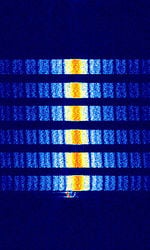 |
|
| WEFAX | Radiofax (Also known as Weatherfax, HFHigh Frequency (3-30 MHz)-FAX, WEFAX, and Weather Facsimile) is a slow scan analog image transmission mode used for the transmission of weather charts and meteorological reports. | 3 MHzMegaHertz (MHz) 10^6 Hz — 30 MHzMegaHertz (MHz) 10^6 Hz | USBUpper Side Band Modulation (Radio, referring to reception and modulation mode)Universal Serial Bus (Computer, referring to USB Ports and cables) | FMFrequency Modulation | 3 kHzKiloHertz (kHz) 10^3 Hz | Worldwide | 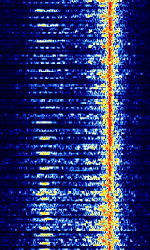 |
|
| WSPR | Weak Signal Propagation Reporter. | 136 kHzKiloHertz (kHz) 10^3 Hz — 1,296.5 MHzMegaHertz (MHz) 10^6 Hz | USBUpper Side Band Modulation (Radio, referring to reception and modulation mode)Universal Serial Bus (Computer, referring to USB Ports and cables) | MFSKMultiple Frequency Shift-Keying | 6 HzHertz (Hz), unit of frequency, defined as one cycle per second (1 Hz). | Worldwide | 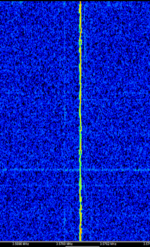 |
|
| WWVB | WWVB is the lowest frequency time signal in the USA. | 60 kHzKiloHertz (kHz) 10^3 Hz | CWContinuous Wave | ASKAmplitude-Shift Keying | 1 HzHertz (Hz), unit of frequency, defined as one cycle per second (1 Hz). | United States | 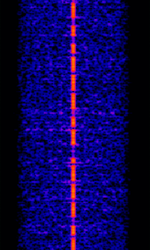 |
|
| Wireless Hydrophone System (WHS) | 434.225 MHzMegaHertz (MHz) 10^6 Hz | RAW | PPMPulse Position Modulation | Europe |  |
|||
| Wireless Smart Utility Networks (Wi-SUN) | Wireless Smart Utility Networks (Wi-SUN) | 922.5 MHzMegaHertz (MHz) 10^6 Hz | FMFrequency Modulation | GFSKGaussian Frequency-Shift Keying | 260 kHzKiloHertz (kHz) 10^3 Hz | Japan | 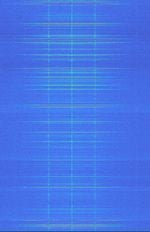 |
|
| Wireless Temperature Sensor | The freezer temperature is requested by a master at regular intervals, and the slave attached to a freezer responds. The communication format appears to be a variant of chirp spread spectrum, (although the spectrum it consumes is quite narrow at ~150 kHzKiloHertz (kHz) 10^3 Hz). | 434 MHzMegaHertz (MHz) 10^6 Hz | FMFrequency Modulation | CSS | 150 kHzKiloHertz (kHz) 10^3 Hz | Australia | 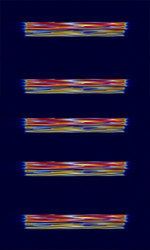 |
|
| XMPP trials | XMPP (Extensible Messaging and Presence Protocol) on shortwave is used by the military and are known for using MIL 188-110A Serial HFHigh Frequency (3-30 MHz) waveform and 6-bit code clear text with dual bursts of STANAGNATO Standardization Agreement (STANAG), defines processes, procedures, terms, and conditions for common military or technical procedures or equipment between the member countries of the North Atlantic Treaty Organization (NATO).-5439 and STANAGNATO Standardization Agreement (STANAG), defines processes, procedures, terms, and conditions for common military or technical procedures or equipment between the member countries of the North Atlantic Treaty Organization (NATO).-5066 as for XMPP Multi-User Chat (MUC) messages | 2 MHzMegaHertz (MHz) 10^6 Hz — 7.8 MHzMegaHertz (MHz) 10^6 Hz | USBUpper Side Band Modulation (Radio, referring to reception and modulation mode)Universal Serial Bus (Computer, referring to USB Ports and cables) | PSKPhase-Shift Keying, QAMQuadrature Amplitude Modulation | 34 kHzKiloHertz (kHz) 10^3 Hz | Worldwide | 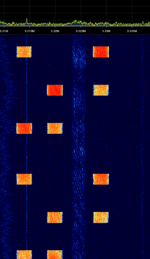 |
|
| Yachta T-219 Voice Scrambler | Yachta or Yakhta (Russian for 'Boat') T-219 is an analogue voice scrambler. It is unique in that an FSKFrequency-Shift Keying sync signal is transmitted in the middle of the main signal, with the scrambled voice stream split above and below the FSKFrequency-Shift Keying signal. | 3 MHzMegaHertz (MHz) 10^6 Hz — 30 MHzMegaHertz (MHz) 10^6 Hz | USBUpper Side Band Modulation (Radio, referring to reception and modulation mode)Universal Serial Bus (Computer, referring to USB Ports and cables) | FSKFrequency-Shift Keying | 2.7 kHzKiloHertz (kHz) 10^3 Hz | Russia | 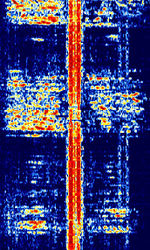 |
|
| Yaesu System Fusion | System Fusion is Yaesu's digital voice/data protocol for amateur radio, using the AMBE+2 vocoder on a C4FMContinuous 4-Level Frequency Modulation signal. | 144 MHzMegaHertz (MHz) 10^6 Hz — 450 MHzMegaHertz (MHz) 10^6 Hz | FMFrequency Modulation | C4FMContinuous 4-Level Frequency Modulation | 12.5 kHzKiloHertz (kHz) 10^3 Hz | Worldwide | 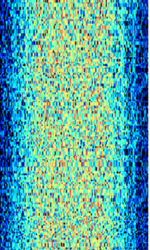 |
|
| Zaliv52 | Military shortwave station broadcasting from the Western Military District in Russia. First heard in March 2017, this station has no channel marker, and it mainly broadcasts Monolith type messages and "MOLNIYA 5X" (МОЛНИЯ 5X) messages addressed to "Zaliv52" (Залив52). | 4.11 MHzMegaHertz (MHz) 10^6 Hz | USBUpper Side Band Modulation (Radio, referring to reception and modulation mode)Universal Serial Bus (Computer, referring to USB Ports and cables) | J3E | Moscow, Russia (speculated) | 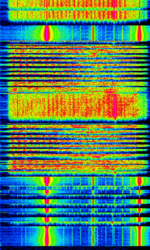 |
||
| Zigbee | Zigbee is a low-power, low-data-rate, low-latency mesh network, based on the IEEE 802.15.4 LR-WPAN standard. It is commonly used for automation and IoTInternet of Things devices, including sensors, light switches/bulbs, and other wireless-controlled devices. | 868 MHzMegaHertz (MHz) 10^6 Hz — 2,480 MHzMegaHertz (MHz) 10^6 Hz | AMAmplitude Modulation | QQPSK, DSSS | 2 MHzMegaHertz (MHz) 10^6 Hz | Worldwide | 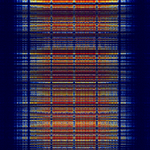 |
|
| Électricité de France HNZ | Electrical substation SCADA protocol used by EDF (Électricité de France). | 68.5 MHzMegaHertz (MHz) 10^6 Hz — 73.3 MHzMegaHertz (MHz) 10^6 Hz | FMFrequency Modulation | AFSKAudio Frequency-Shift Keying | 8 kHzKiloHertz (kHz) 10^3 Hz | France |  |
Pages in category "Active"
The following 200 pages are in this category, out of 387 total.
(previous 200) (next 200)(previous 200) (next 200)